Look back at our archive of previous Meet the Press blog posts.
For the latest posts from the journalists at NBC News and the NBC News Political Unit, click here.
AARP launches ads in W.Va. urging Manchin to support reconciliation bill
WASHINGTON — AARP, the advocacy group for Americans over fifty, is launching new cable and broadcast TV ads in West Virginia urging centrist Sen. Joe Manchin, D-W.Va., to support a budget reconciliation bill that includes a major prescription drug savings policy.
The new TV ad, first reported by NBC News, is slated to run in West Virginia starting this Wednesday through at least July 5. An AARP spokesperson said it is part of a multi-million-dollar ad campaign that will include radio and print ads.
"Everybody knows Joe Manchin cares about West Virginians. And he knows too many of us are struggling to pay for our medicine. That's why he supports letting Medicare negotiate lower drug prices," says a narrator in the ad, which ends with: "Joe Manchin, keep fighting to lower drug prices."
It focuses on a priority of AARP's: allowing Medicare to negotiate drug prices, which Manchin has publicly endorsed. And it comes at a crucial stretch: In recent weeks, the senator has held private negotiations with Senate Majority Leader Chuck Schumer, D-N.Y., about a bill that can bypass Republicans, who oppose the idea of allowing Medicare to negotiate drug prices.
“We know we have the votes to pass Medicare negotiation through reconciliation, and we are committed to pushing back whenever PhRMA and their allies try to mislead the public and block Congress from lowering prescription drug prices," said Nancy LeaMond, the chief advocacy officer for AARP.
Manchin has said he would be open to a package that includes drug savings, energy investments and tax hikes on high earners and corporations.
The recent Manchin-Schumer negotiations have been tight-lipped and the West Virginia Democrat, who scuttled the House-passed Build Back Better Act, is facing conflicting pressures on striking a narrower reconciliation deal over tax and spending policy that can bypass the filibuster. The new AARP ad campaign is designed to push back on drug industry opposition to the savings policy and aims to give Manchin political cover to support the bill.
David Perdue lags far behind Gov. Kemp in ad spending Georgia's GOP primary
Ahead of Georgia’s May 24 primary, former Sen. David Perdue, R-Ga., is falling behind in the race for the state's GOP gubernatorial nomination.
He’s spent no money on ads since April 29, according to AdImpact, an ad tracking firm. In total, he’s spent $1.2 million on ads, a relatively low amount for that race.
Perdue is backed by former President Donald Trump and is challenging Gov. Brain Kemp, who drew ire from Trump in 2020 when he refused to overturn the results of the presidential election in the state, which was carried by President Joe Biden.
So far this cycle, Kemp has spent over $5 million on ads. He’s recently pivoted his focus to the general election this fall, where Democrats are leading in ad spending by the millions, rather than spending money against Perdue.
Recent polls show that Kemp not only leads Perdue, but he also could clear 50 percent of the primary vote, meaning he would avoid a runoff election. A runoff would take place on June 21 if neither candidate clears that 50 percent threshold.
If he wins outright, Kemp will face Democrat Stacey Abrams in a rematch of their 2018 election, where Abrams lost by less than two percentage points. Abrams is already the de facto Democratic nominee, facing no challengers in the primary contest.
On top of Kemp’s ad spending, the Republican Governors Association has spent on his behalf, pouring over $4.6 million on the airwaves to back Kemp.
But Abrams and her allies are far and away the leaders in ad spending in the race so far. Abrams’ campaign has spent $7.8 million on the airwaves and Fair Fight Action has spent an additional $6.6 million on ads supporting Abrams.
Midterm Roundup: A busy primary night
Tuesday's primaries across the country featured some key races in places like Pennsylvania, Kentucky, Oregon, Idaho and North Carolina. In Oregon, President Joe Biden's endorsement doesn't seem to have helped Rep. Kurt Schrader. Though the race hasn't been called yet, he's trailing his challenger, Jamie McLeod-Skinner by over 20 percentage points.
And in Pennsylvania, former President Donald Trump's endorsed candidate for Senate, Mehmet Oz, hasn't run away with it. The race is still too close to call, and former hedge fund manager David McCormick is trailing Oz by only 0.20 percentage points.
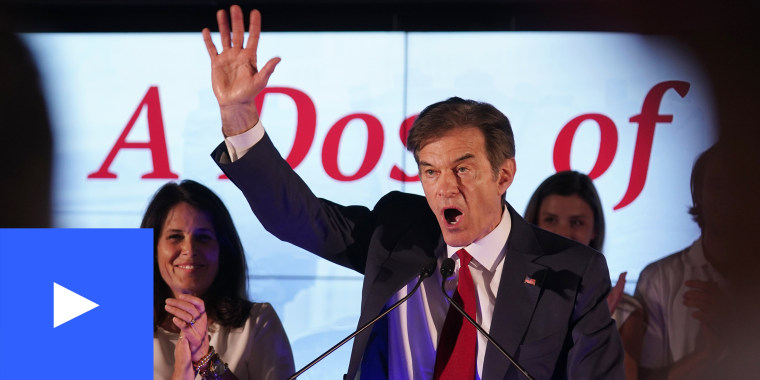
Here are some other key results from Tuesday’s wild primaries, with NBC News’ projection in parentheses, as they stand now:
Here are some other key results from Tuesday’s wild primaries, with NBC News’ projection in parentheses, as they stand now:
Kentucky-03 (Democratic): Morgan McGarvey 63.3 percent (winner), Attica Scott 36.7 percent.
Idaho-02 (GOP): Mike Simpson 54.6 percent (winner), Bryan Smith 32.7.
North Carolina-01 (GOP): Sandy Smith 30.7 percent, Sandy Roberson 26.1 percent (race has not been called).
North Carolina-13 (GOP): Bo Hines 32.1 percent (winner), DeVan Barbour 22.7 percent.
North Carolina-13 (Democratic): Wiley Nickel 51.7 percent (winner), Sam Searcy 23 percent.
North Carolina-14 (Democratic): Jeff Jackson 86.4 percent (winner), Ram Mammadov 13.8 percent.
Oregon governor (Democratic): Tina Kotek 57.4 percent (winner), Tobias Read 33 percent.
Oregon governor (GOP): Christine Drazan 23.5 percent, Bob Tiernan 20 percent.
Oregon-04 (Democratic): Val Hoyle 65.3 percent (winner), Doyle Canning 15.5 percent.
Oregon-04 (GOP): Alek Skarlatos ran unopposed.
Oregon-05 (GOP): Lori Chavez-DeRemer 42.2 percent, Jimmy Crumpacker 30.5 percent (race has not been called).
Oregon-06 (Democratic): Andrea Salinas 37.8 percent (winner), Carrick Flynn 19 percent.
Pennsylvania-01 (GOP): Brian Fitzpatrick 65.5 percent (winner), Alex Entin 34.5 percent.
Pennsylvania-08 (GOP): Jim Bognet 68.8 percent (winner), Mike Marsicano 31.2 percent.
Elsewhere on the campaign trail:
Oklahoma Senate: The Daily Beast is reporting that Rep. Markwayne Mullin, who is running in the crowded GOP Senate primary, plans to introduce a bill to expunge Trump’s impeachment
Pennsylvania Senate: NBC’s Mike Memoli reports that Rep. Conor Lamb faced long odds with President Biden, a key supporter of his marquee 2018 House race, sitting on the sidelines.
New York governor: Gov. Kathy Hochul is up with a new spot centered on protecting abortion access.
Los Angeles Mayor: There were a few big developments in the race for mayor — actor Danny Trejo cut an ad for Councilman Kevin de León, rapper Snoop Dog endorsed businessman Rick Caruso, and City Attorney Mike Feur dropped his bid to endorse Rep. Karen Bass.
Two neighboring Pa. districts tell the tale of changing terrain for Democrats
MONACA, Pa. — If you want a sense of the challenges Democrats face in 2022’s House races, look no further than two districts that share a common border in western Pennsylvania.
Pennsylvania's 12th District, which includes Pittsburgh as well as suburbs to the east and south looks to be solidly Democratic. A deep blue stronghold, the district is home to Democratic candidate Summer Lee, who has built her campaign around environmental justice and income inequality.
The state's 17th District, which holds some of Pittsburgh’s suburbs and all of rural/exurban Beaver County, looks much more like a toss-up. The district is home to Democratic candidate Chris Deluzio, who focuses on his veteran status and his work to help unionize the University of Pittsburgh’s faculty.
Both districts include parts of Allegheny County, the home of Pittsburgh, but the two offer very different terrains for Democrats.
Not long ago, this entire area was Democratic. In the 2000 presidential race, Democrat Al Gore carried Allegheny County by 16 points, while carrying Beaver by 9 points. But 2020 showed how the map had changed. Joe Biden carried Allegheny by 20 points, but Donald Trump carried Beaver by 18 points.
What happened? Pittsburgh, still considered the “steel city” by many Americans, has morphed into a medical and tech center. About 43 percent of the 25-and-over population has a bachelor’s degree. But many of the suburbs around the city, like those in Beaver, are still rooted in the area’s industrial past; about 26 percent of adults in Beaver have a bachelor’s degree.
The emerging differences are clear to see on the ground.
Last week in Pittsburgh, we met with Jasiri X, the co-founder and CEO of 1Hood, a community organizing group in the city. His concern is whether Democrats are doing enough on the issues that Black voters face on a day-to-day basis.
“2018 was this very pivotal year for Pittsburgh,” he said. “We had a very high profile police killing of a young man named Antwon Rose. ... We also had the Tree of Life massacre later on that year."
"It began to be like, ‘OK, well, protesting by itself isn't enough," he continued. "Can we move to come together to actually create and change laws?’” He says that these voters haven’t seen the return on their investment and want Democrats to push harder on progressive policies instead of being “passive.”
An hour drive away from the city, in the far northern reaches of the northwestern Pittsburgh suburbs — the United Steelworkers Local 1016 held a meeting in Wheatland, Pennsylvania. There, we heard a very different message of what the country needs: Trump’s new brand of union workers were more worried about issues like the emerging Supreme Court decision on abortion.
United Steelworkers District 10 Director Bernie Hall studied his crowd of union leaders closely, taking stock of what political questions arose. A Biden voter himself, he was worried about candidates increasingly going to “extremes.” If the Supreme Court can overturn a law like Roe v. Wade from 1973, what about the 1935 Wagner Act that said employees have a right to establish a union?
“We’ll have dozens of these [meetings] across the state,” he said. “I'm concerned that people aren't getting facts in general, not only about President Biden but just about the political process and issues that face our country.”
In Aliquippa, after the local steel mill shut down, nature is slowly reclaiming empty homes and many of residents of this hard-hit African-American community are well beneath the poverty line.
Aliquippa Mayor Dwan Walker (D) urged Democrats to unite the rural voters and urban progressives. The way forward in Western Pennsylvania, he says, is to remind people the area is the birthplace of the unions.
“There’s 72,000 Democrats [here that are] ‘light blue’ [Reagan Democrat]” he said. “But they’ll vote Republican just based off the message. The message just has to be claimed.”
Oz and McCormick backers have dominated ad spending but pro-Barnette group made late push
Groups backing businessman David McCormick and television doctor Mehmet Oz alone make up 88 percent of all ad spending in Pennsylvania's GOP Senate primary, data from the ad-tracking firm Advertising Analytics shows.
But a late push by a powerful ally of Republican activist Kathy Barnette meant that she and her allies actually outspent the pro-Oz effort in the race's final week.
Overall, the pro-McCormick effort has spent $32.8 million on ads through Tuesday, with $16.9 million coming from the Honor Pennsylvania super PAC and $12 million from McCormick's campaign alone (two other super PACs added another $3.9 million).
While Oz's campaign spent $13.2 million, more than McCormick's campaign, he had a far smaller, $4.3 million push from super PACs, bringing the pro-Oz ad spending total to $17.5 million.
And Barnette's campaign, which has spent just $210,00 on ads, was boosted by a $2.1 million, last-minute ad buy from Club for Growth Action.
While Pennsylvanians have been inundated with ads for McCormick and Oz for months, that late push by the Club, coming amid Barnette's late surge, made her competitive with her rivals on the airwaves for the final week. The pro-McCormick effort still led the pack with $4 million spent over the last seven days, but the Club's spending pushed the pro-Barnette effort into second place for the final week with $2.2 million in ad spending, followed by the pro-Oz $1.4 million.
Where is Trump’s endorsement power on the line in Tuesday’s primaries?
Trump has endorsed 25 candidates in Tuesday’s primaries in Pennsylvania, Kentucky and Idaho, with a handful of races testing the former president's power over the GOP.
All but six of those endorsements are incumbent lawmakers who are typically favored to win their primaries. Trump has backed eight candidates in North Carolina, eight in Pennsylvania, six in Kentucky and three in Idaho.
The most closely-watched tests of Trump’s endorsements will come in statewide contests, particularly in Pennsylvania. There Trump has backed celebrity doctor Mehmet Oz in the open Senate race, but conservative commentator Kathy Barnette has surged late in the race as she tries to capture grassroots enthusiasm. Trump made a last-minute endorsement in the governor’s race, backing controversial state Sen. Doug Mastriano over the weekend after Mastriano emerged as a frontrunner.

Trump has also weighed in on North Carolina’s open Senate race, backing GOP Rep. Ted Budd over former Gov. Pat McCrory and former Rep. Mark Walker. Budd has also benefited from $11.8 million in outside spending from Club for Growth Action, which has launched ads attacking Budd’s opponents, according to the ad tracking firm AdImpact.
In Idaho, Trump has backed Lt. Gov. Janice McGeachin in a primary against GOP Gov. Brad Little. Trump didn’t mention LIttle in his statement backing McGeachin in November, when he described the lieutenant governor as someone who has been “a true supporter of MAGA since the very beginning.” Little has outspent McGeachin on the airwaves, spending $945,000 to McGeachin’s $215,000, per AdImpact.
Trump has also weighed in on a handful of notable House races. He backed controversial GOP Rep Madison Cawthorn in North Carolina’s 11th District. Cawthorn’s opponents, including state Sen. Chuck Edwards, have painted Cawthorn as an attention-seeker who hasn’t prioritized his district.
The GOP primary in North Carolina’s 13th District will also test Trump’s endorsement after he decided to back law student Bo Hines in the competitive, open seat race. Club for Growth has spent nearly $1.3 million boosting Hines, who faces self-funding attorney Kelly Daughtry, veteran Kent Keirsey, and former Rep. Renee Ellmers in the primary.
In Pennsylvania’s 8th District, Trump has backed political consultant Jim Bognet to take on Democratic Rep. Matt Cartwright. Bognet lost to Cartwright by nearly 4 points in a district Trump would have won by 3 points had the new congressional map been in place in 2020. Bognet faces former Hazleton Mayor Mike Marsicano, who is also a former Democrat, in the GOP primary.
Outside group launches $6 million ad campaign supporting Ron Johnson
One Nation, a super PAC with ties to the conservative Senate Leadership Fund, is launching a $6 million ad campaign to back Sen. Ron Johnson, R-Wis., today.
The group’s first ad will run for eight weeks in Wisconsin and highlights Johnson’s efforts to curb inflation.
“Gas, groceries, rent. Everything costs more. Senator Ron Johnson is fighting back,” a narrator in the ad says.
The narrator adds, “The D.C. liberals' spending spree is out of control. Jacking up inflation on Wisconsin families. Wiping out wage gains and making it harder for families to make ends meet.”
Johnson is running for a third term this year and while he faces no significant primary challenge, Democrats are eyeing his seat as one they can flip in November. So far, there are three main candidates vying for the Democratic nomination for Senate — state treasurer Sarah Godlewski, businessman Alex Lasry and Lt. Gov. Mandela Barnes.
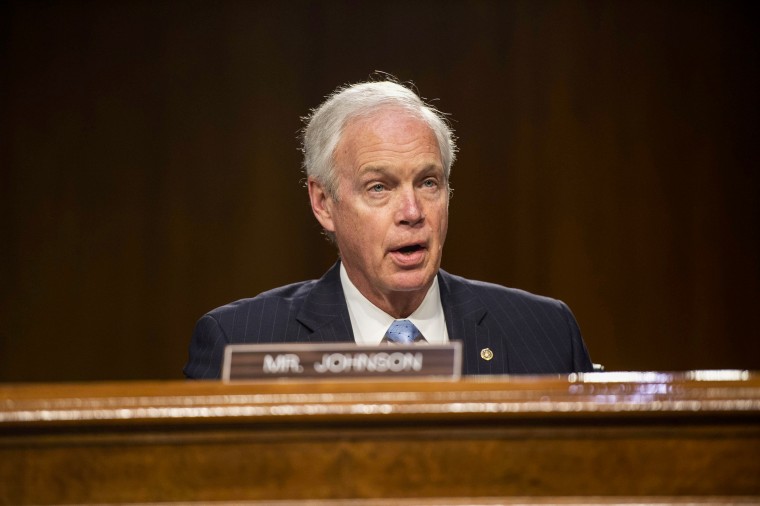
Wisconsin’s primary election is August 9.
So far, Lasry has spent the most on ads of any candidate, spending $5.6 million on the airwaves, according to AdImpact, an ad tracking firm. Johnson himself has spent over $5.1 million on ads.
Godlewski and Barnes trail, with Godlewski having spent $1.9 million on ads so far and Barnes having spent under $100,000 on ads.
Barnes, however, has racked up significant progressive endorsements, with Sen. Elizabeth Warren, D-Mass., planning to campaign for him soon, according to NBC News’ Shaq Brewster.
One Nation, however, will be competing against an anti-Johnson outside group, Opportunity Wisconsin. The group hasn’t explicitly backed any of the Democratic candidates, but they have been running ads against Johnson since early this year.
The commercials allege Johnson used loopholes in legislation he supported to make money for himself. So far, the group has spent the most of any candidate or group on the airwaves, spending $6.4 million.
Like One Nation, Opportunity Wisconsin is an advocacy organization that does not have to disclose its donors, though the group’s website claims they’re, “made up of a diverse group of leaders who span the urban/rural divide and live and work in communities and industries through Wisconsin.”
Barnette says she won't support "globalist" candidates if she loses Pa. GOP primary
Republican Kathy Barnette, who has been surging in the final days before the Pennsylvania GOP Senate primary race, threw cold water on the idea of her backing rivals Mehmet Oz or David McCormick if she loses the primary election.
"I am not a globalist, both of them are. They have very strong ties to the World Economic Forum. I've heard McCormick several times espouse the glowing benefits of ESG scores --environmental social governance scores. If you just look at who they are, Mehmet Oz is not only an American but also Turkish as well. That's a very important distinction," Barnette said during an interview with SiriusXM's Breitbart News Daily.
When asked subsequently if she'd back the eventual GOP nominee if she loses Tuesday, Barnette replied: "I have no intention of supporting globalists."
"I don't think we have room to just vote for any old warm body with an 'R' next to their name. I think we can do better than that."
During the interview, Barnette went onto criticize Oz and McCormick as not authentic conservatives, as well as criticizing the idea that they're electable because they have deep pockets to loan to their campaigns.
"I have been an America First individual long before I decided to run for this race. And now, these two particular men, because it's convenient, because we have this seat open, they are now presenting themselves as Trump, card-carrying members of the Patriot Party," Barnette said.
"That's not how they've lived their life prior to stepping into this role."
In recent interviews with NBC News, both Oz and McCormick raised questions about Barnette's candidacy.
"He's not been transparent. And every time she answers a question, she raises a lot more," Oz told NBC's Dasha Burns last weekend before saying he would support her if she wins.
And Monday, McCormick criticized Barnette for losing her 2020 congressional bid.
"I've gotten to know Kathy on the campaign trail, I respect her personal story. She's been tested, she was tested 18 months ago when she ran for Congress and lost by 20 percentage points," McCormick said.
—Dasha Burns contributed
Poll: Democrats are becoming more progressive, while most Republicans want Trump to lead GOP
Ahead of a slew of notable primary races taking place over the next two weeks, the latest NBC News poll finds that the Democratic primary electorate has become more progressive since 2020.
It also shows a majority of Republican primary voters wanting Trump to continue leading their party.
Now neither development should be that surprising to anyone who follows politics. But it’s instructive to see them backed up by numbers.
Per the poll, 63 percent of Democratic primary voters say they prefer a candidate who proposes larger-scale policies even if they cost more and might he harder to pass, versus 33 percent who prefer a candidate who proposes smaller-scale policies that cost less and might be easier to pass.
That’s a jump from Feb. 2020 — during the height of the Democratic presidential primary season — when 53 percent wanted candidates proposing larger-scale policies, versus 41 percent who wanted candidate with smaller-scale policies.
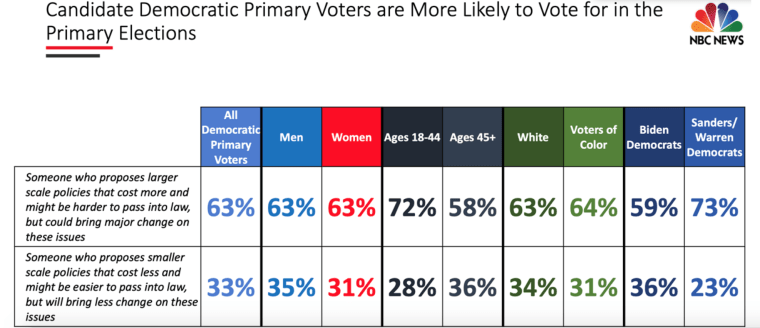
As for Republican primary voters, 55 percent believe the party should continue to be led by former President Donald Trump; 33 percent say he was a good president but it’s time for new leaders; and 10 percent say he was a bad president, and it’s time to move on.
On a separate question, however, 34 percent of Republicans in the poll identify themselves as more supporters of Trump, while 58 percent consider themselves more supporters of the party.
The NBC News poll was conducted May 5-7, 9-10 of 1,000 adults — including 750 on their cell phone — and it has an overall margin of error of plus-minus 3.1 percentage points.
The margin of error for the poll’s 259 Democratic primary voters is plus-minus 6.09 percentage points, and the margin of error for the poll’s 247 Republican primary voters is plus-minus 6.24 percentage points.
Fetterman won't appear at campaign's primary night event after last week's stroke
Pennsylvania Democratic Lt. Gov. John Fetterman won't attend his Senate campaign's primary-election night event on Tuesday after suffering a stroke late last week.
In a press release Monday, the campaign said Fetterman's wife and "other special guests" will deliver remarks, while Fetterman himself "will not be in attendance on Tuesday as he will remain in the hospital resting and recovering."
Fetterman Sunday that he had suffered a stroke Friday, but he said that he didn't suffer "cognitive damage" and insisted he is "well on my way to full recovery." The Democrat is considered the frontrunner in the Democratic primary bid, where he's running against Rep. Conor Lamb and state Rep. Malcolm Kenyatta.
In Pennsylvania, Mastriano rises to top of GOP field despite little ad spending
State Sen. Doug Mastriano has established himself as a frontrunner in the GOP primary for Pennsylvania governor despite being vastly outspent on the airwaves.
Mastriano’s campaign has spent just $332,000 on ads ahead of Tuesday’s primary, accounting for just over 1 percent of the $22.7 million spent on the governor's race by the total GOP primary field, according to the ad tracking firm AdImpact.
Mastriano, who has championed former President Donald Trump’s false claims that the 2020 election was stolen, has been the target of a $1.1 million ad campaign from Pennsylvania Patriots for Election Integrity. The group has knocked Mastriano for supporting a 2019 law expanding mail voting in the state (which Mastriano has said he would reverse if elected).

Despite minimal spending on campaign ads, Mastriano has established himself as a frontrunner in the crowded race and he picked up Trump’s endorsement over the weekend.
Trump’s endorsement in the final days of the primary race came after he encouraged his supporters last month to reject former U.S. Attorney Bill McSwain, calling McSwain a “coward” for not investigating election fraud.
Half of all ad spending in the GOP race — $11.1 million — has bolstered McSwain. But Commonwealth Leaders Fund, which has spent millions supporting McSwain, announced over the weekend that it is instead backing former Rep. Lou Barletta in an attempt to consolidate behind one Mastriano opponent.
The group’s decision comes after two other candidates, state Sen. Jake Corman and former Rep. Melissa Hart, dropped out of the race last week and endorsed Barletta, whose campaign has spent $967,000 on ads.
Aside from McSwain, the top spender in the race has been former Delaware County Councilman David White’s campaign, which has dropped nearly $5.7 million on ads so far. The conservative Club for Growth Action has spent $801,000 on an ad campaign opposing White.
Rep. Mike Simpson is seeking to fend off primary challenger in Idaho
Rep. Mike Simpson, R-Idaho, will be defending his seat Tuesday when he faces a challenge from personal injury attorney Bryan Smith in Idaho's 2nd district GOP primary.
The two have been engaged in an intense ad war, running over a dozen unique ads combined this cycle. Most of those ads have been on the offensive, with Smith attacking Simpson over his decision to vote in favor of the House committee investigating the Jan. 6 attack on the Capitol. Simpson has attacked Smith for his debt collection practices, featuring families in his ads who were sought after by Smith’s business to pay back small amounts.
Smith has spent over $450,000 on his ads, while Simpson has spent just over $368,000 on the airwaves, according to AdImpact, an ad tracking firm.
However, Simpson has been defended by outside groups, including the Defending main street Super PAC, which has run ads supporting him. That group has spent over $460,000 on ads in Simpson’s favor.
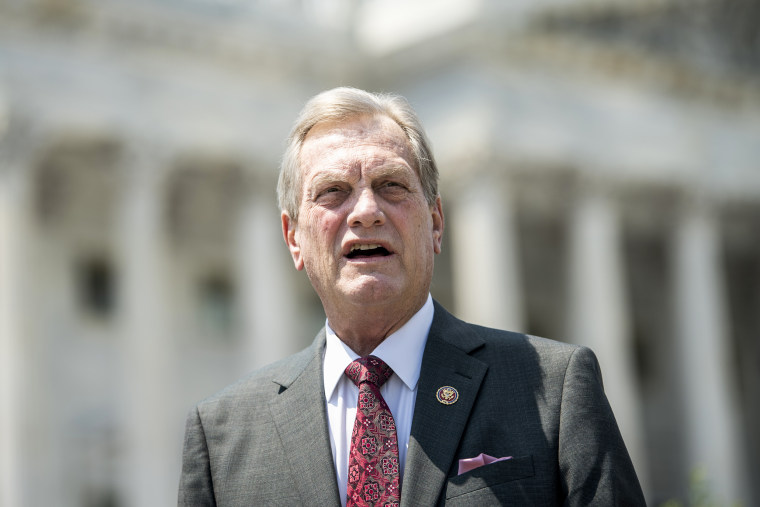
Defending Main Street is the political arm of the Republican Main Street Partnership and is spending in House GOP primaries across the country, including in Ohio and Minnesota.
Smith has had the backing of an outside group, too. America Proud PAC has poured $405,000 into ads supporting him in the district, accusing Simpson of being a “career politician” and a RINO (Republican In Name Only). The group is largely funded by Boise real estate developer Joe C. Russell, according to FEC filings.
Simpson has been serving in this seat since 1999, and it’s the second time he’s faced a primary challenge from Smith. In 2014, Smith ran against Simpson, but Simpson earned 61.6 percent of the vote on election night, compared to Smith’s 38.4 percent.
Though former President Donald Trump has endorsed against some members of Congress who voted in favor of the January 6 commission, he has not publicly supported either candidate in this race.
Data Download: The number of the day is… -19 percentage points.
That’s the net-negative rating for the Democratic Party in the latest national NBC News poll, with 50 percent of adults saying they had negative feelings about the Democratic Party and 31 percent saying they had positive feelings about the party. That’s also the highest net-negative rating the Democratic Party has seen in 30 years of the survey.
Adults surveyed in the poll gave the Republican Party a net negative rating of minus 11 percent, with 46 percent viewing the party positively and 46 percent viewing the party negatively.
The results are yet another warning sign for Democrats heading into a difficult midterm election, with the Democratic Party’s image struggling across the country. Among registered voters in the suburbs, the Democratic Party had a net negative rating of minus 24 percent, which is nearly three times their negative rating among suburban voters in 2018.
The party also had a 2 percent net-positive rating among urban voters, a sizable drop from a plus 15 percent rating in 2021. Rural voters have increasingly reported negative feelings about the Democratic Party, giving the party a rating of minus 32 percent.
Here's the positive/negative ratings – from most popular, to least popular – for all the politicians or institutions the NBC News poll measured:
- Volodymyr Zelenskyy: 62 percent positive, 9 percent negative (+53)
- Disney: 33 percent positive, 30 percent negative (+3)
- Ron DeSantis: 28 percent positive, 26 percent negative (+2)
- The US Supreme Court: 36 percent positive, 35 percent negative (+1)
- The Republican Party: 35 percent positive, 46 percent negative (-11)
- Joe Biden: 37 percent positive, 51 percent negative (-14)
- Donald Trump: 36 percent positive, 51 percent negative (-16)
- Kamala Harris: 31 percent positive, 48 percent negative (-17)
- The Democratic Party: 31 percent positive, 50 percent negative (-19)
PACs funded by crypto executives face first tests in Tuesday’s primaries
The crypto executives behind multiple super PACs this cycle will get their first chances at victory next week in a handful of House primaries as they flood Democratic races with cash.
The super PACs Protect Our Future and Web3Forward have spent a combined $8 million on ads in next week’s primaries so far, according to the ad tracking firm AdImpact.
The bulk of that spending has been focused on Oregon’s 6th District, Protect Our Future has spent over $6.5 million on ads supporting former government contractor Carrick Flynn’s election. The 6th District is brand new, created due to population gain during redistricting in the state.
Protect Our Future is a new group funded by crypto executives including Sam Bankman-Fried, the founder of the crypto currency exchange FTX. The PAC has endorsed nearly a dozen candidates and lawmakers and claims to be focused on candidates who take long--term stances on certain legislation, particularly related to pandemic preparedness.
The amount of money spent on Flynn significantly outweighs the money spent on any other candidate in the race, which include veteran and businessman Cody Reynolds, internal medicine Dr. Kathleen Harder, and former state Rep. Andrea Salinas, who has the support of BOLD PAC, the political arm of the Congressional Hispanic Caucus. House Majority PAC, a group tied to top congressional Democrats, has also spent in Flynn’s favor.
Protect Our Future has also spent significantly in two other open Democratic primaries in deep blue districts – Kentucky’s 3rd District and North Carolina’s 4th district.
In North Carolina, the group has spent $625,000 on ads supporting state Sen. Valerie Foushee, who’s running to replace retiring Democratic Rep. David Price. She’s been endorsed by EMILY’s List, the Congressional Black Caucus PAC and other members of Congress.
Her most notable opponent is Durham County Commissioner Nida Allam, who’s been endorsed by progressive lawmakers like Sen. Elizabeth Warren, D-Mass., and Rep. Alexandria Ocasio-Cortez, D-N.Y. American Idol runner-up Clay Aiken is also running.
In Kentucky, Protect Our Future has poured $591,000 into ads supporting state Sen. Morgan McGarvey. McGarvey faces one opponent, state Rep. Attica Scott, in his bid for an open seat to replace retiring Rep. John Yarmuth.
Another crypto-backed super PAC has spent heavily on the open seat race in Oregon’s 4th District.
Rep. Peter DeFazio is retiring, leaving a reliably Democratic seat open. He and Senator Jeff Merkley, D-Ore., have endorsed Val Hoyle, Oregon’s Labor Commissioner.
Web3 Forward, which is tied to another PAC funded by crypto executives from companies like Coinbase and FTX, has spent $286,000 on ads supporting Hoyle. The PAC “supports Democratic candidates committed to making the next generation internet more secure, open and owned by the users,” according to the group’s website.
Web3Forward so far endorsed three Democratic candidates in primaries – Hoyle, Sydney Kamlager in California and Jasmine Crockett in Texas, who’s facing a primary runoff later this month.
Super PACs target Kathy Barnette in Pennsylvania Senate race
A pair of super PACs launched two new TV ads Friday morning attacking conservative commentator Kathy Barnette as she surges in Pennsylvania’s GOP Senate primary.
The ads come as former President Donald Trump, who has backed celebrity doctor Mehmet Oz in the race, and Barnette’s opponents target her as she has turned the race between Oz and former hedge fund manager David McCormick into a three-way contest.
Honor Pennsylvania, a pro-McCormick super PAC that’s spent $16.1 million largely attacking Oz, launched an ad where a narrator asks, “What do we really know about Kathy Barnette?”
The spot goes on to accuse Barnette of supporting the protests that followed the murder of George Floyd and of saying, “I was not a Trumper,” citing her Twitter feed and her book.
Another super PAC, USA Freedom Fund, launched a new ad blasting Barnette for supporting the building of a statue of former President Barack Obama.
The ad starts by mentioning comments Obama made about conservatives in 2008, saying some conservative voters are bitter and “cling to guns or religion or antipathy toward people who aren't like them.”
The ad references a Change.org petition that appears to be written by Barnette, advocating for erecting statues of Obama, his family and abolitionist Frederick Douglas in Washington, D.C. The petition was written two years ago. NBC News hasn’t independently verified whether Barnette was indeed the person who wrote the petition.
USA Freedom Fund previously supported former Ohio state treasurer Josh Mandel’s unsuccessful run for Senate.
New ads target GOP Rep. Madison Cawthorn in primary race
A super PAC supporting one of GOP Rep. Madison Cawthorn's primary challengers launched two new ads targeting the controversial congressman ahead of next week’s primary in North Carolina.
Cawthorn, who has former President Donald Trump’s endorsement, has been at the center of numerous scandals.
The first-term congressman, who faced sexual harassment allegations in his first bid, drew criticism for his repeated lies and aggressive rhetoric about the 2020 election; he called Ukrainian President Volodymyr Zelenskyy a “thug” and he said that he had been invited to drug-fueled sex parties by other lawmakers. And he’s also been the subject of leaked photos and videos of a sexual nature that attempt to paint Cawthorn in a negative light.

The new spots from the outside group Results for NC slam Cawthorn for falsely claiming an accident prevented him from attending the Naval Academy, even though he had already been rejected prior to the accident.
One of the new ads labels Cawthorn an untrustworthy “playboy politician,” and flashes one of those leaked images. The other spot features a woman veteran who is backing state Sep. Chuck Edwards in the May 17 primary.
Results for NC has spent the most on the airwaves of any campaign or outside group in the 11th District so far, dropping $739,000 on ads, according to the ad tracking firm AdImpact.
Edwards has picked up endorsements as Cawthorn has racked up headlines. North Carolina Republican Sen. Thom Tillis is supporting the state senator.
If no candidate wins more than 30 percent of the primary vote on Tuesday, the top two contenders head to a primary runoff in July.
Beasley internal poll shows dead heat in North Carolina Senate general election
North Carolina Democrat Cheri Beasley's internal campaign polling shows her in a statistical tie with the two Republican frontrunners squaring off in next week's Senate primary.
In a new polling memo shared with NBC News, Beasley, a former state Supreme Court chief justice, is tied with Republican Rep. Ted Budd at 45 percent in a general election matchup with 10 percent undecided. Beasley trails former Gov. Pat McCrory in a separate matchup with McCrory at 45, Beasley at 44 and 11 percent undecided.
The live-caller poll of 800 likely general election voters taken from April 28 through May 4 has a margin of error of +/- 3.5 percent, meaning that the polling shows Beasley in a statistical dead heat with either of the two Republicans. The poll tested head-to-head matchups, which don't capture third-party candidates that may be on the ballot (last cycle, conservative third-party candidates pulled about 4 percent of the vote in the Senate race).
The memo includes favorability ratings for all three candidates, suggesting that the raucous GOP primary may have affected how voters view McCrory and Budd, even while Beasley remains known to a smaller portion of the general electorate.
McCrory, who served four years as the state's governor, has a favorable rating in the poll from 33 percent of the likely general electorate, compared to a 45 percent unfavorable rating. Budd has a 28 percent favorable rating and a 30 percent unfavorable rating.
By comparison, Beasley has a 30 percent favorable rating and a 15 percent unfavorable rating in the poll.
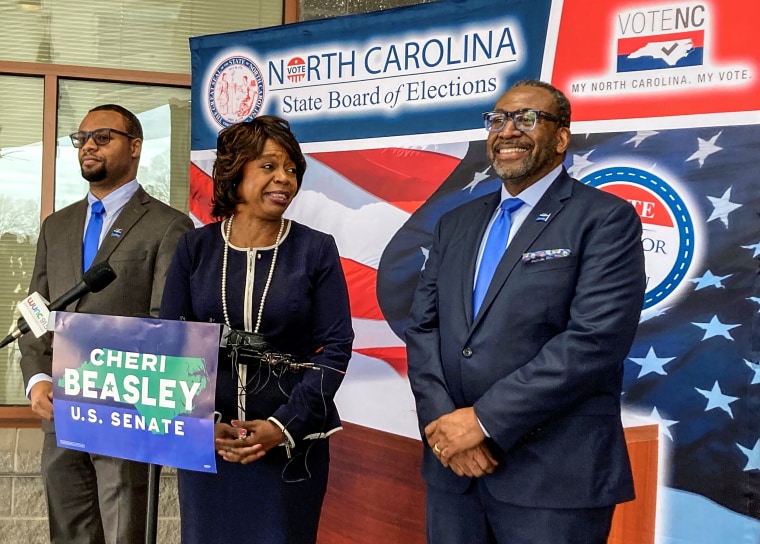
The memo also suggests Beasley leads Budd with suburban voters and white college-educated voters, but the full crosstabs of the poll were not included.
Most public polls show a tight contest in a state that hasn't elected a Democratic senator since 2008 but did elect a Democratic governor in 2016, when Roy Cooper defeated McCrory. Former President Donald Trump won the state in the 2020 presidential election, defeating President Biden by a margin of 50 percent to 49 percent.
The race is expected to draw tens of millions in ad spending — the GOP backed Senate Leadership Fund has $22 million of ad time booked in the race already after primary day, per the ad-tracking firm AdImpact. And Politico reported Thursday that the National Republican Senatorial Committee is buying $6.5 million in advertising time in the state with ads starting Friday.
Biden's influence to be tested in Oregon on Tuesday
Most high profile primary elections this cycle have been viewed at least partially as a test of former President Trump’s power of the Republican Party through the success of candidates he's endorsed. But on Tuesday, we’ll have the first chance to see how far President Joe Biden’s power extends as his first endorsed candidate faces a challenge in Oregon’s Democratic primary for the 5th congressional district.
Biden is backing Rep. Kurt Schrader as he faces a challenge from public official Jamie McLeod-Skinner who has attacked Schrader for taking “millions in corporate PAC money” as he “sold out to big pharma.”
Schrader has defended himself on the airwaves, citing his record fighting for lower prescription drug prices and affordable healthcare.
He’s spent over $1.8 million on ads already, with five days to go until the primary. Two groups — Center Forward and Mainstream Democrats — have also spent money on the airwaves to support Schrader and attack McLeod-Skinner. They’ve spent a combined $1.3 million, according to AdImpact.
Center Forward in particular has run ads highlighting the fact that McLeod-Skinner was fired from a position as city manager in Phoenix, Oregon, in 2018 for being too antagonistic.
McLeod-Skinner has spent just over $250,000 on ads. She also trails Schrader in fundraising, raising almost $700,000 so far this cycle compared to the over $2 million Schrader has raised, according to the FEC.
She’s also run for Congress before. In 2018, she ran for and won the Democratic nomination for Oregon’s 2nd district, but was defeated in the general election by then-Rep. Greg Walden.
The non-partisan Cook Political Report rates this district as Lean Democratic, but there's a chance Republicans could flip the seat in November. On that side of the aisle, Jimmy Crumpacker and Lori Chavez-DeRemer are engaged in a tight primary.
Crumpacker ran for the state’s 2nd district in 2020, but came fourth in the GOP primary. Chavez-DeRemer served as mayor of Happy Valley from 2010 to 2018.
Chavez-DeRemer has raised $669,000 so far this cycle, while Crumpacker trails slightly, having raised $541,000, according to the FEC. He also slightly trails her in ad spending. According to AdImpact, Chavez-DeRemer has spent $286,000 on ads so far, while Crumpacker has spent $254,000.
Club for Growth goes in for Barnette in late Pennsylvania Senate primary push
The Club for Growth is coming to the aid of conservative commentator Kathy Barnette, whose Pennsylvania GOP primary candidacy has gained steam in recent days, with a new $2 million ad buy hoping to magnify her surge.
It's the Club's first expenditure of the primary, a biographical spot that features Barnette talking about her roots growing up on a rural pig farm and serving in the military before pivoting to her attacking Democrats.
"Kathy Barnette is a principled conservative and a fighter who will take on the socialists in Washington to preserve the American Dream for generations to come,” David McIntosh, the president of Club for Growth Action, said in a statement. “We look forward to supporting Barnette in her race to become the next Senator from Pennsylvania.”
The spending push is good enough to make the Club the top spender in the race's final week, a shake-up on airwaves that have long been dominated by the efforts supporting celebrity doctor Mehmet Oz and businessman David McCormick.
Up until this point, the pro-Barnette effort has been virtually non-existent on the airwaves. The pro-McCormick and Oz outfits alone have outspent Barnette's campaign (she's had no outside help until this week) by a margin of more than 328-to-1.
It's also another marquee race where the Club is breaking from former President Donald Trump, who has endorsed Oz. The Club's preferred candidate in Ohio's recent Senate race, former Treasurer Josh Mandel, lost to author J.D. Vance, Trump's pick. But the two were aligned in Tuesday's West Virginia primary, backing Rep. Alex Mooney over Rep. David McKinley.
McCormick dodges Trump question ahead of Pennsylvania primary
Former hedge fund manager David McCormick would rather not get into how he plans to win Pennsylvania's GOP Senate primary next week without former President Donald Trump's support.
McCormick is trying to win over Republican voters ahead of the May 17 contest, while Trump has endorsed celebrity doctor Mehmet Oz in the race.
Asked after a campaign event in Tunkhannoc, Pa., how he plans to win without Trump, McCormick responded, "Listen, I'm not doing any more interviews."
The dodge underscores the challenge McCormick faces in trying to win over the Trump faithful without the former president's backing. On Monday McCormick launched a new TV ad featuring footage of Trump praising McCormick and images of Trump and McCormick together.
On Tuesday Ozreleased his own ad rebutting McCormick's spot, featuring footage of Trump calling McCormick "a liberal Wall Street Republican."
For more coverage of Pennsylvania's Senate race, tune into Meet the Press Daily's special report from the Keystone State at 1 pm E.T on MSNBC.
Infrastructure vote threatens one House Republican. What about the others?
Former President Donald Trump has promised to exact revenge on Republicans who supported the bipartisan infrastructure package. And one of his best chances to do so comes Tuesday in West Virginia’s 2nd District.
“If this deal happens, lots of primaries will be coming your way,” Trump warned in a July statement as senators were negotiating the package.
On the same day President Joe Biden signed the infrastructure package into law in November, Trump announced he was backing West Virginia GOP Rep. Alex Mooney in his primary against GOP Rep. David McKinley, who voted for the package. Mooney and McKinley were forced to run for the same seat due to redistricting, since the Mountain State lost a House seat.
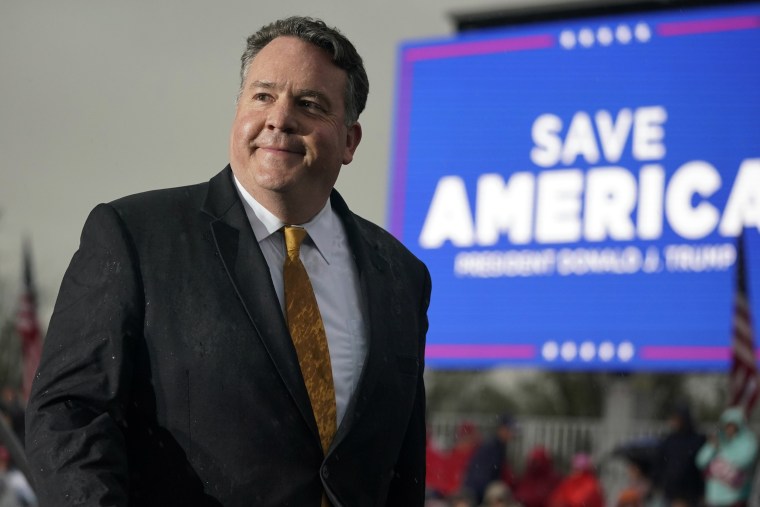
The two congressmen are in a hotly contested race that’s attracted a few million dollars in ad spending from their campaigns and outside groups. But the other six House Republicans who bucked their party to vote for the infrastructure package, and are still running for re-election, aren’t facing similar contests.
Trump has not yet endorsed primary challengers against those House members, even as he’s made his displeasure known.
At a rally in Nebraska earlier this month, Trump called GOP Rep. Don Bacon a “bad guy,” and wished his primary challenger “good luck.” But Trump stopped short of endorsing the challenger, roofer Steve Keuhl. Bacon’s primary is also set for Tuesday, but Keuhl has only raised $5,000 and didn’t have any money left in his campaign account as of March 31.
Trump has said he still supports New York GOP Rep. Nicole Malliotakis despite her vote for the package. But her race is still uncertain with New York’s congressional lines in flux. Fellow New York GOP Rep. Andrew Gabarino also voted for the infrastructure package.
Two New Jersey Republicans — Chris Smith and Jeff Van Drew — also voted for the bill. So did Pennsylvania Rep. Brain Fitzpatrick, whose primary is set for May 17, but he does not face any well-funded challengers from the right.
Of course Trump could still try to elevate a primary challenger against one of these Republicans, but so far the West Virginia race is his best opportunity to take down a GOP lawmaker who crossed the aisle.
Five of the House Republicans who voted for the package — New York Reps. John Katko and Tom Reed, Ohio Rep. Anthony Gonzalez, Illinois Rep. Adam Kinzinger, and Michigan Rep. Fred Upton — are not running for re-election. Another Republican who voted for the package, Alaska Rep. Don Young, died in March.
Data Download: Big money flooded into Tuesday's West Virginia Republican primary clash
The GOP primary in West Virginia's 2nd District is the crown jewel of the state's primary on Tuesday — the member-on-member clash has drawn $4.1 million in ad spending, according to the ad-tracking firm AdImpact.
Voters head to the polls there today to choose between two GOP congressmen, David McKinley and Alex Mooney, in the first incumbent vs. incumbent primary of the year.
Mooney’s campaign has spent nearly $1.5 million on the airwaves, while McKinley’s campaign has spent $1.2 million. Outside groups have also jumped into the race, with Club for Growth Action and School Freedom Fund dropping a combined $931,000 to bolster Mooney. The U.S. Chamber of Commerce and the Defending Main Street super PAC have spent a combined $423,000 supporting McKinley.
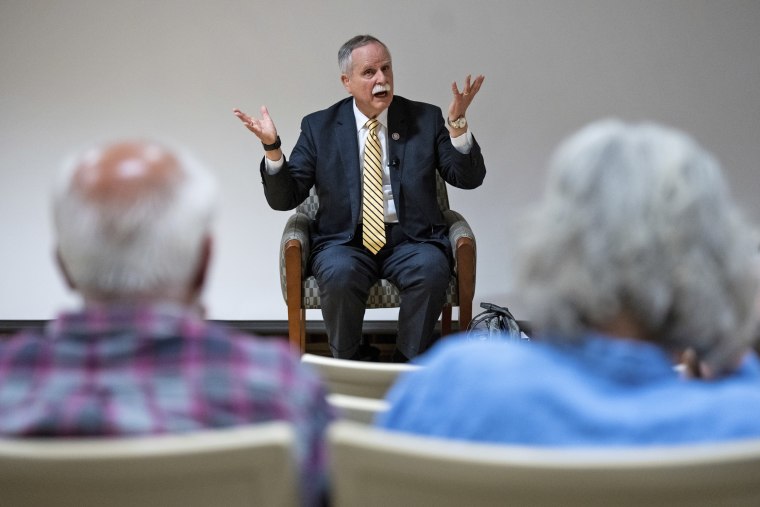
Both candidates reference former President Donald Trump in their closing ads, although Mooney has Trump’s endorsement. In Mooney’s closing spot, a narrator says, “President Trump warned us about RINOs, sellouts and known losers. David McKinley proved him right,” knocking McKinley for supporting the bipartisan infrastructure package and a commission to investigate the Jan. 6 attack on the Capitol.
McKinley’s latest ad on the airwaves goes after the Club for Growth’s spending, with a narrator saying, “Mooney and his Washington special interest group are spending millions lying about David McKinley. Just like they did about President Trump.”
Club for Growth faces tests of its sway in May primaries
The conservative Club for Growth’s sway in GOP primaries will face key tests in May, with half of the candidates being backed by its PAC so far in 2022 facing primaries this month. The contests also come as the group’s past opposition to former President Donald Trump has faced new scrutiny.
So far the Club for Growth’s independent expenditure arm, known as Club for Growth Action, has spent $25.9 million on ads to support its candidates in May primaries, with the most of that spending centered on three Senate races, according to the ad tracking firm AdImpact.
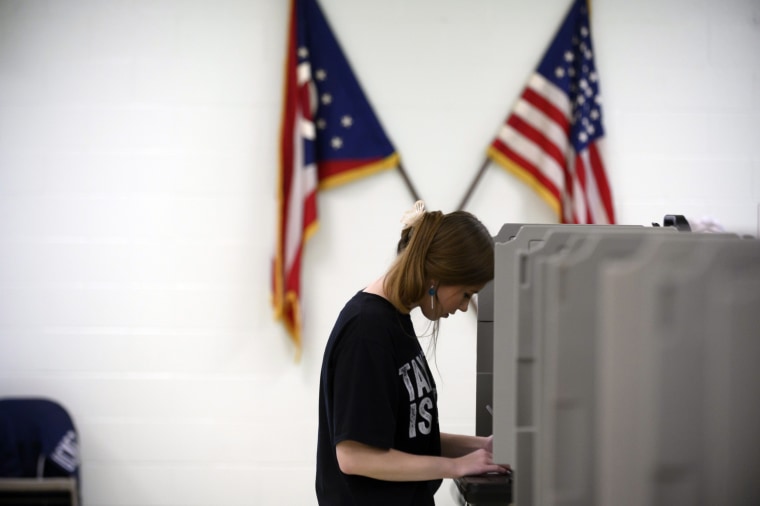
The group did not succeed in helping one of its preferred Senate candidates, former Ohio state Treasurer Josh Mandel, win the GOP nod. Author J.D. Vance, who had Trump’s endorsement, won the primary last week instead.
That race sparked a clash between Trump world and the Club, which has been a staunch Trump ally after initially opposing Trump’s candidacy in 2016.
That past has even popped up in races where both the Club and Trump are backing the same candidate. In West Virginia, GOP Rep. David McKinley highlighted the group’s past opposition to Trump to push back on the Club’s involvement in the 2nd District race in which he is facing fellow GOP Rep. Alex Mooney. Trump and the Club are both backing Mooney in the contest.
McKinley launched a new ad this week saying the Club, which has spent $571,000 on ads boosting Mooney, was “lying about David McKinley, just like they did about Trump.”
Club for Growth spokesman Joe Kildea wrote in an email to NBC News that the group has “no concerns” that its past opposition to Trump will become a more prominent issue in GOP primaries.
“We are confident that we will win most of our races this month,” Kildea wrote.
Ohio isn’t the only place where the Club is at odds with the former president.
In Alabama’s Senate race, the Club has stuck by GOP Rep. Mo Brooks even after Trump withdrew his support. So far Club for Growth Action, has spent $4.3 million on ads to bolster Brooks.
And in Georgia’s 6th District, the Club is backing Rick McCormick, the 2020 nominee, in the May 24 primary, although the group has not yet spent on the airwaves. Trump endorsed another candidate in that race, attorney Jake Evans, on Thursday.
But the Club is largely aligned with Trump in other key primaries. So far the group has spent $11 million on ads backing GOP Rep. Ted Budd in North Carolina’s Senate primary, set for May 17. The Club has also spent nearly $1.1 million ads to support Trump-backed law student Bo Hines in the open seat race in North Carolina’s 13th District.
Wisconsin Senate politics to make appearance in Game 4 of Bucks-Celtics
When the Milwaukee Bucks face off against the Boston Celtics on Monday night in Game 4 of an intense playoff series, some viewers will be reminded of another contest — Wisconsin's competitive Democratic Senate primary.
A new ad from Outagamie County Executive Tom Nelson, first obtained by NBC News, takes aim at Alex Lasry, the wealthy former Bucks executive who’s rising in the polls and easily outspending his opponents in TV and digital ads.
In it, Nelson, competing against Lasry, Lt. Gov. Mandela Barnes and state Treasurer Sarah Godlewski for the chance to take on Republican Sen. Ron Johnson in the fall, criticizes the $250 million of public money that went into building Fiserv Forum, the home of the Bucks.
Wearing a sweatband and a green jersey with the number 34 on it, the number worn by Bucks star Giannis Antetokounmpo, Nelson says he's rooting for his home team.
“What I’m not rooting for is using your tax dollars to make billionaires richer,” Nelson says in the ad. “We paid a quarter of a billion dollars for the Fiserv Forum, even more than Foxconn, every dollar spent was taken from schools, roads, tax relief, things that benefit all of us.”
Lasry, thanks in part to his deep pockets, is quickly becoming a threat in a race in which Barnes had long been considered the favorite and Nelson has been trying to gain steam when he's been vastly outspent. In recent days he has been ramping up his attacks on Lasry, calling on the Lasry family to refund taxpayers.
Lasry has defended the investment, pointing to evidence that the arena has quickly become an economic driver for Milwaukee.
A Marquette Law School poll in late April had Barnes leading Lasry by just 3 points, with Treasurer Sarah Godlewski following with 7 percent support and Nelson with 5 percent.
In 2015, the state approved a $250 million investment in a funding deal to help build Fiserv Forum. At the time of the deal, then-Bucks head coach Jason Kidd made a prediction.
“Will the new arena be hosting NBA Finals games within a few years? I`m not one to predict, but I think we look forward to our future,” Kidd said, according to a report by Fox News Milwaukee in 2015. “We have a chance to grow, get better each day, and our goal is to hold that gold trophy in that new arena.”
When the prediction came true last year, the Milwaukee Journal-Sentinel’s editorial page applauded the state’s investment, noting the arena now draws tens of thousands of fans to Milwaukee’s downtown, who then pour into nearby restaurants and bars.
“All of Wisconsin has a share in the Bucks’ remarkable rise from small-market doormat to NBA champions,” read an editorial in the Journal-Sentinel just after the Bucks claimed the NBA championship last year. “None of it would have happened without a new arena, built with $250 million of public money.”
Pompeo joins McCormick campaign to criticize Oz on Turkish vote
Former Secretary of State Mike Pompeo joined Pennsylvania Republican David McCormick's Senate campaign Friday to criticize McCormick's top rival, Mehmet Oz, over new reporting that he voted in the 2018 Turkish elections and claiming it raises questions about his priorities should he be elected.
"He engaged in the Turkish political process — and that raises, in my mind, lots of judgments about his priorities. And we need to get him and his team to explain why he had time and energy and focus to vote in a Turkish election, but not in an American election," Pompeo said.
"And you stack that up with some of the work that he has done. Some of the political involvement he's had with Turkey. And I think that the campaign owes the people of Pennsylvania, the Mehmet Oz campaign, owes the people of Pennsylvania an explanation for this."
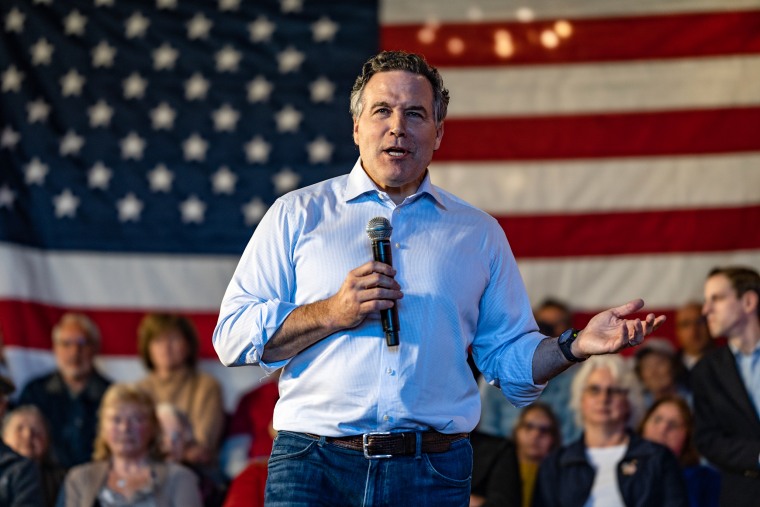
ABC News reported this week on Oz's 2018 vote, and his dual citizenship (which he has said he would relinquish if he wins) has been a target of criticism from political opponents like McCormick. But Pompeo stressed repeatedly on Friday's call that his comments are "separate and apart from politics."
Brittany Yanick, an Oz spokesman, defended the decision by Oz to keep his dual citizenship as made to help him take care of his mother and criticized the attacks as baseless.
"These are pathetic and xenophobic attacks on Dr. Oz by David McCormick, who should be ashamed of himself. Now that he lost President Trump’s endorsement, he’s resorted to sad and desperate attacks that are no different than the tropes used against Catholics and Jews," she told NBC in a statement.
"Dr. Oz has already said when elected to the Senate he would renounce his citizenship. There is no security issue whatsoever, and David McCormick knows that Dr. Oz has maintained his dual citizenship to make it easier to help care for his mother who has Alzheimer’s and lives there."
—Dasha Burns contributed
More than a dozen states appeal to DNC for early primary position
The Democratic National Committee wanted to shake up its presidential primary system and so far, there are plenty of states signaling that they are willing to join the effort.
As of Friday afternoon, nearly 20 states and territories have notified the DNC they’re interested in holding a first-in-the-nation primary or be considered somewhere among the early window of primary contests in 2024. Those requests are required to be sent by the end of the day Friday.
Sources tell NBC News that once the next phase begins — which entails submitting an application and making a pitch before the Rules and Bylaws Committee — those numbers are expected to drop off. There are also some states that have significant hurdles, including Republican legislatures that dictate their primary dates or costly media markets that price out candidates who aren’t independently wealthy.
The panel has said it intends to make a decision by the beginning of August.
The DNC recently scrapped its early state system that long allowed Iowa and New Hampshire to kick off the presidential primary contests followed by Nevada, then South Carolina. They are asking those states to reapply and make their case to be considered in the early window, while allowing other states to try to move up the primary calendar as well.
The dynamic has already set off some backroom brawling. Much of the push for change was prompted by a caucus debacle in Iowa in 2020, where a technological failure delayed revealing results.
Charges have also mounted that the electorates in Iowa and New Hampshire are too white and should not have such an outsized role in dictating the Party’s nominees. Nevada is making an aggressive push to supplant New Hampshire, while New Hampshire is making its case to remain the first-in-the-nation primary.
Here are the states that have so far sent letters of interest to the DNC: Georgia, Illinois, Iowa, New Hampshire, South Carolina, Michigan, Minnesota, Nevada, Nebraska, New Jersey, Texas, Washington, New York, Oklahoma, Colorado, Puerto Rico, Maryland, Delaware. (This list will be updated).
Democratic group aims to flip key state legislatures
The Democratic Legislative Campaign Committee is targeting Republican majorities in three state legislatures this year.
Minnesota’s Senate, Michigan’s House and Senate, and New Hampshire’s House and Senate are where the DLCC sees vulnerable Republican majorities that could be nabbed by Democrats this fall.
Additionally, the group plans to invest to defend Democratic majorities in five state legislatures — Colorado’s House and Senate, Maine’s House and Senate, Minnesota’s House, Nevada’s Assembly and Senate and New Mexico’s House.
DLCC finalized their list of state targets before a Supreme Court draft decision to overturn Roe v. Wade was leaked to Politico earlier this week, the group’s president Jessica Post said in a virtual press briefing on Friday.
However, Post said she was “absolutely horrified about the future of Roe,” and they are motivated to gain Democratic majorities in Minnesota and Michigan to help protect reproductive rights in those states.
In Michigan, a law restricting abortion from the 1930s is still on the books and could go into effect once a Supreme Court Decision overturning Roe is handed down.
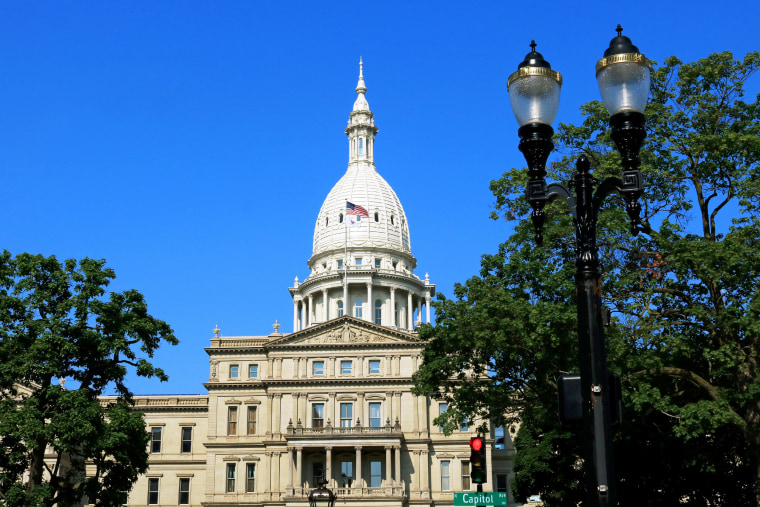
And in Minnesota, Democratic Gov. Tim Walz has so far vowed to protect abortion access in the state. But, he faces a tough reelection fight to keep the governor’s mansion blue this fall.
“Roe has the ability to change the landscape dramatically,” Post said. She added later, “Michigan is at the top of our target list.”
Specifically, the group plans to use their resources in their target states this year to support local candidates, provide polling data and candidate-specific research and potentially finance early campaign investments.
“It takes a lot to support state legislative candidates,” especially if they’re still working full-time, Post said.
Pa. Senate's GOP frontrunners have relied mostly on self-funding, new reports show
A little more than a week before the pivotal Pennsylvania Republican Senate primary, new fundraising reports show how Mehmet Oz and David McCormick have heavily relied on their own personal wealth to boost their bids.
Oz loaned his campaign more than $12 million through April 27, the latest campaign finance reports show, the vast majority of the $15 million he's raised so far. McCormick loaned his campaign $11 million of the $16 million he's raised.
Not only are the candidates giving to their campaigns at relative parity, but they've spent almost exactly the same — about $14.1 million — so far (this includes all campaign spending reported to the Federal Election Commission, not just ad spending).
But just looking at ad spending, the pro-McCormick team is outspending the pro-Oz team largely thanks to big super PAC spending.
McCormick's campaign has spent $10.4 million on advertising, per AdImpact, with his allied super PACS Honor Pennsylvania and Pennsylvania Conservative Fund spending $14.2 million and $2.6 million respectively.
Oz has spent $12.1 million, with the anti-McCormick American Leadership Action spending another $3.2 million.
Jessica Cisneros warns Henry Cuellar could be the “Joe Manchin of the House”
Progressive attorney Jessica Cisneros is warning Democratic primary voters that her primary opponent, Rep. Henry Cuellar, D-Texas, could block the party's priorities if he’s re-elected, likening Cuellar to a certain influential Democratic senator from West Virginia.
“There's so many key issues where he's always standing with Republicans, and he could become the Joe Manchin of the House,” Cisneros said Thursday on MTP Daily. “We don't want Henry Cuellar to be the deciding vote on the future of our fundamental freedoms and rights in this country. We just can't risk that."
Cisneros faces Cuellar in a primary runoff on May 24 after neither candidate won a majority of the primary vote on March 1. Cisneros has made abortion a central issue in the race following a leaked draft of a Supreme Court decision signaling the court was preparing to overturn the landmark Roe v. Wade decision.
Cuellar is the lone Democrat in the House who opposes abortion rights, and he has said his stance reflects his heavily Latino, more socially conservative, district in South Texas. But Cisneros pushed back on that characterization, telling MTP Daily that her close primary race in March and her close primary challenge to Cuellar in 2020 show the district is not as conservative as Cuellar claims.
“People have just taken Henry Cuellar’s word that this district is conservative as it is when it comes to this issue,” Cisneros said.
“I know that it's important to voters because I've been out there talking to them myself,” Cuellar added on the abortion issue. She recalled holding a phone bank shortly after Cuellar was the only Democrat who voted against a measure to codify abortion rights into federal law.
“The first few voters that I got on the line were talking about — they were telling me about how upset they were that Henry Cuellar had sided with Republicans on this issue,” she said.
Cuellar has had support from House leadership in his primary race. House Majority Whip James Clyburn, D-S.C., traveled to the district this week to stump for the nine-term congressman. Clyburn said Wednesday that Cuellar “gives us a much better chance of winning their seat than anybody else."
Cisneros responded to Clyburn’s statement, saying, “People in this district aren't voting for me because I am progressive. They're voting for me because I'm putting forth policies that are actually going to enact change in this district … I really hope that the Democratic leadership doesn't stand in the way of the change that South Texans want to see.”
Republicans are targeting the seat in November. President Joe Biden would have carried the 28th District by 7 percentage points had the new congressional map been in place in 2020. The Cook Politico Report rates the race a Toss Up.
Poll: Fetterman holds large lead in Pennsylvania, while GOP race is a dead heat
Less than two weeks until Pennsylvania’s key Senate primaries, Lt. Gov John Fetterman has jumped out to a nearly 40-point lead in the Democratic contest, while the Republican race is neck-and-neck between celebrity doctor Mehmet Oz and former hedge fund executive David McCormick.
That’s according to a new Franklin and Marshall poll of the state that was conducted April 20 to May 1, and which has a margin of error of plus-minus 4.4 percentage points.
In the Democratic race, Fetterman leads U.S. Rep. Conor Lamb, D-Pa., by 39 points among Democratic voters, 53 percent to 14 percent, with state Rep. Malcolm Kenyatta at 4 percent.
Twenty-two percent say they’re undecided or unsure.
Last month, the poll had Fetterman ahead of Lamb by 24 points, 41 percent to 17 percent.
In the Republican race, Oz — whom former President Donald Trump has endorsed — gets support from 18 percent of GOP voters, McCormick gets 16 percent and conservative political commentator Kathy Barnette gets 12 percent.
A whopping 39 percent are undecided or unsure.
Unlike Ohio’s Senate contest, where Trump’s endorsement of J.D. Vance changed the contours of that primary Vance won, this poll shows Trump’s endorsement of Oz hasn’t really shifted this GOP race.
Last month’s Franklin and Marshall poll — which was conducted mostly before Trump’s endorsement — had Oz at 16 percent and McCormick at 15 percent, with 43 percent undecided.
Ad watch: Abortion politics
Wisconsin state Treasurer Sarah Godlewski, one of the Democrats running to take on GOP Sen. Ron Johnson, is going up with a new TV ad filmed in the aftermath of the leak of a draft Supreme Court opinion overturning Roe v. Wade.
“We’re at the Supreme Court where it looks like Ron Johnson is going to get exactly what he wants: Overturning Roe v. Wade, reinstating Wisconsin’s cruel abortion ban and putting doctors in jail,” Godlewski says in the ad, shared first with NBC News, which was filmed in front of the U.S. Supreme Court.
“But that’s not what Wisconsinites want,” Godlewski adds. “We don’t want politicians making health care choices for women.”
The 30-second spot is part of a six-figure statewide television ad buy, per Godlewski’s campaign, and the portion in front of the Supreme Court was shot on an iPhone. Godlewski, the only high-profile woman in the Democratic primary, has been endorsed by EMILY’s List, which backs women candidates who support abortion rights.
Primary turnout so far is another warning sign for Democrats
Republicans have an edge in enthusiasm so far in 2022, voter turnout suggests, a possible trend that should be concerning for Democrats. Watch NBC News' Steve Kornacki break it down here:
Abortion emerged among top themes in April's midterm election ads
Out of 462 political ads in House, Senate and gubernatorial races in April, inflation, immigration, election integrity and abortion topped the list of issues mentioned by candidates and outside groups.
Inflation was the top mentioned issue, with 46 unique ads — or 10 percent of all political ads tracked by NBC News in April — mentioning inflation or rising prices. Immigration and border security appeared as a theme in 35 ads. Election integrity or voting rights appeared as an issue in 31 commercials and abortion was mentioned in 30 spots.
Immigration and inflation topped the list in March, too, though the sheer number of ads in March (210) was smaller than April.
Abortion is an emerging issue in midterm ads, which are still largely focused on intra-party primary contests. The topic also fell strictly across party lines, with only Republican candidates highlighting anti-abortion rights stances and only Democrats vowing to protect abortion rights.
Most candidates just cited their stance on abortion among a list of other topics they are for or against. But some, like Nebraska state Sen. and gubernatorial candidate Brett Lindstrom, have run entire ads focusing on the issue.
“Like many Nebraskans, I've long prayed for the Supreme Court to overturn Roe vs. Wade,” Lindstrom says in one ad. “Nothing in the Constitution establishes a right to an abortion, and we have a moral obligation to protect life at every stage.”
On the Democratic side, Rep. Conor Lamb, D-Penn., ran ads highlighting his pro-choice stance, saying “If we don't win this Senate race, we're going to lose a lot more than just an election. Republicans are attacking the right to vote. They're attacking womens' right to choose. ... I've beaten Trump-backed candidates in Trump districts three elections in a row. I know how to win tough races.”
As Democrats and Republicans face each other this fall, it’s likely abortion will come into sharper focus as the midterm election cycle moves forward, particularly in light of a leaked draft Supreme Court decision obtained by Politico that would overturn Roe v. Wade this year.
The only primary where abortion has become a focal point this cycle is in Texas’ 28th district, where progressive Jessica Cisneros has targeted Rep. Henry Cuellar, D-Texas, who was the only Democrat in the House to vote against legislation that would enshrine the right to an abortion on the federal level.
Other issues mentioned where opinions and statements fell squarely among party lines was election integrity and voting rights. Six percent of ads mentioned the issue, with only Republicans vowing to strengthen election integrity and only Democrats promising to expand voting rights.
In Georgia’s 7th district, where two incumbents are facing each other due to redistricting, Reps. Lucy McBath and Carolyn Bourdeaux each ran ads highlighting their stances on voting rights.
“My father pushed me in a stroller at the March on Washington. There's nothing more American than the right to vote,” McBath says in one ad before adding, “I'm fighting for my good friend, John Lewis' Voting Rights Act on the front lines to protect our right to vote.”
In her ad, Bordeaux says, “They say we can't pass a new Voting Rights Act, but if we stand together, it can be done.”
In previous months, NBC News ad analyses have also tracked the presence of “boogeymen” in political ads. Just like previous months, in April, President Joe Biden, Speaker of the House Nancy Pelosi and China topped the list of GOP boogeymen, or entities candidates target outside of their direct opponents.
A new boogeyman emerged in April among Republicans, though — Sen. Mitt Romney, R-Utah. He was mentioned in four unique ads by outside groups like Buckeyes for a Strong Ohio, who attacked former Ohio state treasurer Josh Mandel for previously supporting Romney, a Republican senator known for bucking former President Donald Trump. Mandel ran for the Republican nomination for U.S. Senate.
“While we struggle with high gas and grocery bills, Josh Mandel supported the politicians who got us here, endorsing Romney,” the ad’s narrator says.
While GOP groups and candidates have name checked Biden in ads all year, Democrats have just started to use Trump or “Trump Republicans” as boogeymen in their ads.
“Carrick will stand up to the Trump Republicans so we can tackle climate change head on and take on the drug companies to lower the cost of prescription drugs,” an ad paid for by the House Majority PAC in favor of Carrick Flynn’s campaign for Oregon’s 6th district stated.
Democratic Governors Association booking $75 million for initial fall TV ad salvo
The Democratic Governors Association is reserving $75 million of television advertising time for the fall across eight states, NBC News has learned exclusively, as it looks to make early investments aimed at shoring up Democratic incumbents.
The group's top three states as far as initial spending are ones featuring incumbents who flipped their states' governor's mansions blue in 2018 — Michigan ($23 million), Wisconsin ($21 million) and Nevada ($10 million).
The DGA is also booking $5 million in both Colorado and Maine, $4.5 million in Minnesota and $2.5 million in New Mexico. The DGA and its allies in Kansas are booking another $4 million in fall TV spending there, and have already been spending in other races too.
“The DGA is all in to protect our incumbents. As the fight to defend our democracy and fundamental rights shifts to the states, ensuring Democratic governors are in office is more vital than ever,” DGA Executive Director Noam Lee told NBC in a statement. “Our track record of smart, strategic investments has helped us elect Democratic governors across the country, and it is how we are going to win this fall."
The heavy emphasis on Michigan and Wisconsin is no surprise — Govs. Gretchen Whitmer and Tony Evers, respectively, are the Democratic Party's only bulwark in those states against Republican-controlled legislatures. (That's the case in Kansas, with Gov. Laura Kelly, too.)
November's elections are expected to be tough for Democrats as President Joe Biden's approval rating languishes and Republicans have closed the gap on the generic ballot.
But Democrats are hopeful that their party can rebound as the pandemic wanes, particularly with a more empathetic message about the economy and by contrasting themselves with some high-profile Republican gubernatorial hopefuls who continue to spread echo lies about the 2020 election. Vulnerable Democratic governors have also responded to the recently leaked draft Supreme Court opinion on Roe v. Wade by promising to protect abortion access from their seat in power.
Campaign organizations regularly make early, large advertising buys in order to lock in lower rates before advertising time gets more expensive. The DGA's Republican counterpart, the Republican Governors Association, released its list of first major television advertising buys in March — $31.4 million in Arizona, Kansas, Michigan, Nevada and Wisconsin, states where Republicans largely hope to go on offense. Both groups, along with other outside groups, are expected to spend heavily in these races, and others, as Election Day draws closer.
White House looks for political boost from high court's draft leak
The White House has for months been crafting a political and policy strategy for the possibility of the Supreme Court overturning Roe v. Wade, cemented in the belief that such a move could dramatically change Democrats’ dim fortunes in November’s midterm elections.
On Monday night some of those plans were set in motion.
President Biden received a phone call from White House chief of staff Ron Klain informing him that Politico had just published a draft decision overturning Roe v. Wade. White House aides then got to work on a presidential statement on the matter, White House press secretary Jen Psaki told reporters..
By Tuesday morning, Biden had signed off on a statement that made one of the key political points — “it will fall on voters to elect pro-choice officials this November” — and signaled there would be future policy moves by his administration.
A couple of hours later, the president hit on another part of the White House’s political strategy: Warning that abortion rights is just the beginning. “If the rationale of the decision as released were to be sustained, a whole range of rights are in question,” Biden said, citing same-sex marriage and contraception.
Politically, the Biden aide said, the “strategy is to set up a clear choice” in the midterms between Democrats who support abortion rights and Republicans who don’t.
A decision by the Supreme Court isn’t expected until this summer and is unlikely to fundamentally change from the draft.
Even in draft form, however, the document is seen by the White House as potentially helping Democrats win back suburban women voters who were critical to Biden’s election but may be swayed by Republican arguments about issues such as government influence on decisions about their children’s education.
“It has the opportunity to galvanize the Biden coalition in ways that other issues don't,” the Biden aide said of the abortion decision. “That is women, of course. It is communities of color. It is young people across genders. And it is also suburban women and independent women in particular.”
Republicans are poised to pick up seats in the midterms, with voters unhappy about inflation and high gas prices. Democrats have also been on the defensive over Biden’s handling of migrants at the southern border.
With a lack of votes for legislation in Congress to codify protections in Roe v. Wade, even among Democrats, the policy possibilities under discussion in the White House involve possible executive action or using the bully pulpit to influence states.
While the senior Biden advisor was mum on specifics in the White House’s federally-focused strategy, the adviser also acknowledged that much of the work to shore up abortion rights and reproductive protections would fall to the states—and that that’s where the midterm battles would be waged, too.
Still, one ally close to the White House described the Supreme Court decision, politically, as “a gift.”
White House officials made clear the overturning of Roe v. Wade is not a fight they want to have. But the raw political calculation is that specific action by the Supreme Court is easier for Democrats to organize around than a theoretical threat, and that it gives voters something tangible besides economic issues to evaluate candidates on.
“They should feel empowered that they have an opportunity to do something about the Supreme Court's decision here, if it comes to pass, and that opportunity is to make their opinions and voice loud and clear and vote in November for pro-choice elected officials,” the Biden aide said.
Ad spending breakdown: DeWine and Whaley win gubernatorial nominations
NBC News has projected the Ohio gubernatorial general election matchup — Republican Gov. Mike DeWine and Dayton Democratic Mayor Nan Whaley — two candidates who faced different ad spending environments on their way to the nomination.
DeWine outspent every candidate and outside group on ads in the race on both sides of the aisle, according to the ad-tracking firm AdImpact, $4.9 million. That's significantly more than the next-highest-spending Republican, former Rep. Jim Renacci, who spent $1.7 million.
Whaley, on the other hand, was narrowly outspent by Cincinnati Mayor John Cranley, spent on ads. Cranley spent $1.85 million, per AdImpact, while Whaley spent $1.54 million.
Now DeWine and Whaley will face off in what could become an expensive general election matchup.
Correction (May 4, 2022, 1:20 p.m): Due to a misreading of the ad-spending data, a previous version of this article incorrectly stated a lower figure for Whaley's ad spending. Her campaign spent $1.54 million on television ad spending, not $155,000.
Record numbers for early voting in Georgia
Early voting in Georgia's midterm primary election began Monday and voters turned out in record numbers.
The Georgia Secretary of State's office said that 27,298 voters cast their votes yesterday, NBC News' Blayne Alexander and Charlie Gile report (the Secretary's office originally said that the number of early votes was 27,366 but have corrected the total).
On the first day of early primary voting in 2018, only 9,226 voters cast early votes. That's an increase of over 18,000 first-day early votes in four years.
The party breakdown of Monday's vote was: 14,731 Republican, 12,308 Democratic and 259 who were non-partisan.
Early voting began about three weeks ahead of the state's primary election, where voters will pick nominees for the major parties for governor, secretary of state and Congress.
Among the most notable races, Gov. Brian Kemp faces a challenge from Trump-endorsed former Sen. David Perdue in the race for the Republican nomination. Kemp has been polling ahead of Perdue in the state, but he needs to earn over 50 percent of the vote to clear a runoff.
Sen. Raphael Warnock is also on the ballot, though he's expected to easily coast through the Democratic ticket to the general election ballot, where he'll likely face former football star Herschel Walker in November.
Kathy Hochul appoints Rep. Antonio Delgado member as new lieutenant governor
Gov. Kathy Hochul, D-N.Y., has tapped Democratic Rep. Antonio Delgado to be her new lieutenant governor, replacing former Lt. Gov. Brian Benjamin, who resigned after he was indicted on bribery charges.
"We share a belief in working together to get things done for New Yorkers, and Representative Delgado has an incredible record of doing just that in Congress,” Hochul said in a Tuesday statement. “With Antonio Delgado by my side serving as Lieutenant Governor, we will both make history - and make a difference."
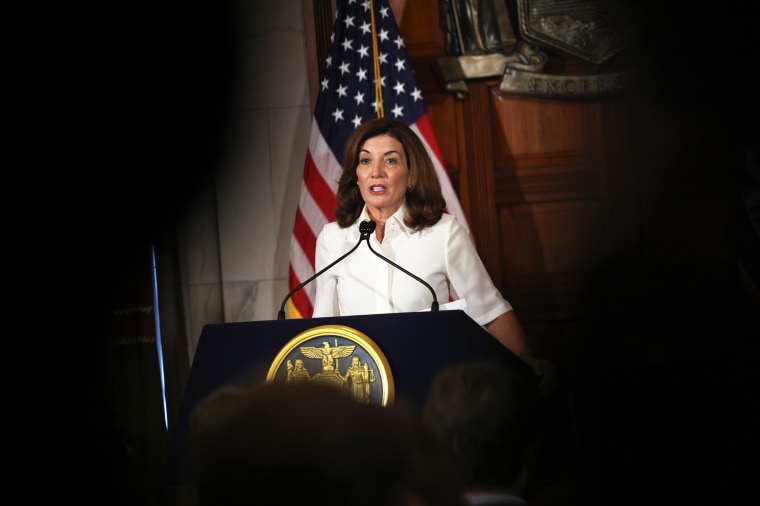
Delgado will serve as Hochul’s running mate as she runs for a full term in November, according to The New York Times, leaving open his competitive Upstate New York House seat.
Delgado, who is Black and Latino, was first elected to represent the competitive 19th District, which is largely white, in 2018, defeating former GOP Rep. John Faso after winning a competitive Democratic primary. He has proven to be a strong fundraiser and was potentially facing a tough re-election fight this year. New York’s congressional map is still in flux after the state Supreme Court tossed out the map as a partisan gerrymander late last month.
It’s not immediately clear when Delgado will leave the House to take on his new role as lieutenant governor. But his impending exit would leave an even smaller majority for the Democratic Caucus. His exit would also make him the 31st House Democrat not running for re-election this year.
More than $73 million has been spent on Ohio Senate primary ads
Roughly $73.3 million has been spent on ads in the Ohio Senate primaries, surpassing all other Senate races so far, with $69.9 million spent on the GOP primary alone.
Wealthy candidates who funded their own campaigns led the pack of Republican candidates vying to replace retiring GOP Sen. Rob Portman, while outside groups also poured in millions, according to the ad tracking firm AdImpact.
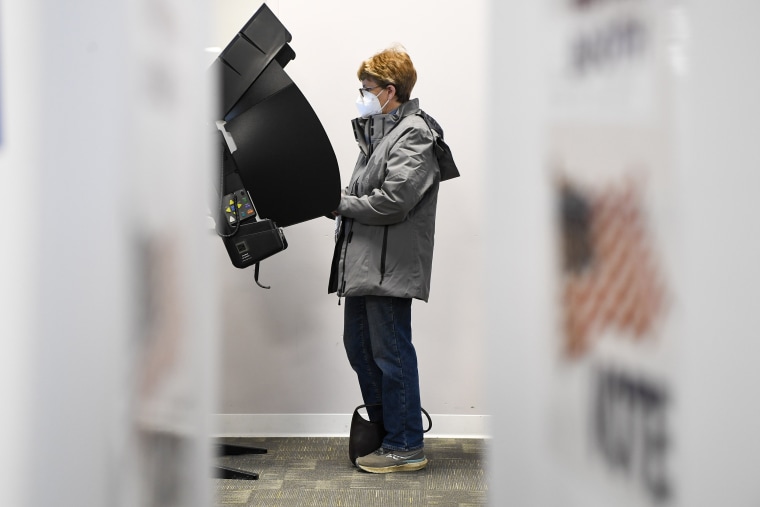
Investment banker Mike Gibbons’ campaign spent the most of any candidate or outside group on ads, dropping $13.5 million on the race. Gibbons loaned and contributed a combined $16.8 million of his own money to his campaign.
The super PAC Protect Ohio Values spent $10.4 million on ads to bolster “Hillbilly Elegy” author J.D. Vance. The group, which is funded by billionaire Peter Thiel, has launched ads touting former President Donald Trump’s decision to endorse Vance. Vance’s own campaign spent $1.7 million on the airwaves.
State Sen. Matt Dolan, whose family owns the Cleveland Guardians baseball team, spent $9.3 million on ads. Dolan also largely self-funded his campaign with an $8 million contribution and a $2.6 million loan.
Club for Growth Action, a conservative outside group backing state Treasurer Josh Mandel, spent $8.9 million on ads while Mandel’s campaign spent $6.2 million. USA Freedom Fund, which is also backing Mandel, has spent $4.8 million
Former Ohio GOP Chairwoman Jane Timken, who has Portman’s endorsement, spent $4.1 million on ads. She also had help from a pair of outside groups, Ohio Leads and Winning for Women Action Fund, which have spent nearly $3.7 million combined.
Just $3.4 million has been spent in the Democratic primary, with $2.9 million coming from Rep. Tim Ryan’s campaign. Ryan is facing attorney Morgan Harper in the race.
Dolan criticizes Vance for campaigning with and defending Gaetz
Ohio Republican state Sen. Matt Dolan criticized one of his fellow U.S. Senate hopefuls, author J.D. Vance, in an interview with NBC News over Vance's decision to campaign with, and defend, a congressman under federal investigation.
Dolan singled out Vance's decision to campaign with embattled Florida Republican Rep. Matt Gaetz, among other allies, over the past weekend. Sources familiar with the case tell NBC that Gaetz is being investigated for sex trafficking — the congressman has denied the allegations and has not been charged with a crime. The Columbus Dispatch reported that during a conversation with reporters on the trail, Vance commented on the allegations against Gaetz.
“Being accused of a crime, as we’ve learned in the past four years in this country, is very often more about corrupt law enforcement than it is about anything anybody’s actually done," he said, per the Dispatch. "Do I think Matt Gaetz is a child sex predator? Of course I don’t."

Dolan blasted those comments in an interview Monday.
"The weekend before the election, he's telling Ohio law enforcement officers: You are corrupt. Those are his words, not mine. And he's trying to demonstrate that a person from out of state who has come in to campaign for him, he has to prove that person's not a sexual predator?" Dolan told NBC News about Vance.
"This is about who can go to Washington and reflect Ohio and fight for Ohio's concerns. If he's demeaning law enforcement and having, let's just say, questionable people supporting him from out of Ohio, Ohioans need to know that."
Dolan's campaign also released comments from the state's former Attorney General, Betty Montgomery, and the National Sheriffs’ Association President, Fayette County Sheriff Vernon Stanforth, criticizing Vance over the comments. Both have endorsed Dolan.
The Vance campaign did not respond to a request for additional comments about the decision to campaign with Gaetz, or about Dolan's criticism.
While most of the candidates in the broad Ohio Republican Senate field have been moving toward the right of the party — Vance recently won former President Trump's endorsement — Dolan has struck out on a different path that's more reminiscent of the political career of the retiring Republican senator whose seat he hopes to replace, Sen. Rob Portman (Portman has endorsed former state GOP chair Jane Timken).
In his interview with NBC, Dolan added that a victory on Tuesday would show that "Ohioans want somebody to go into battle in November representing Republican ideas, Republican values, but keeping Ohio and what's important to Ohio first and foremost."
UPDATE: Gaetz, who has called the investigation against him a "witch hunt," responded to Dolan's comments shortly after publication.
Midterm roundup: A big night for 'J.D. Mandel'
Former President Donald Trump traveled to Nebraska Sunday to rally supporters around his pick for governor, businessman Charles Herbster, who is also facing multiple groping allegations (which Herbster has denied). But Trump didn’t just focus on Herbster’s race in his 104-minute speech, NBC News’ Vaughn Hillyard reports.
Trump flubbed J.D. Vance’s name, Trump’s preferred candidate in Ohio’s Senate race, instead calling him “J.D. Mandel,” an apparent mix-up with another candidate, state Treasurer Josh Mandel. (“We've endorsed J.P., right—J.D. Mandel,” Trump said.)
He also praised Missouri GOP Rep. Billy Long as Long continues to vie for Trump’s endorsement in the Show Me State’s Senate race.
And Trump criticized a series of other sitting Republicans, including Nebraska’s own Sen. Ben Sasse and Rep. Don Bacon, saying he would not endorse Bacon or Bacon’s primary challenger ahead of the May 10 primary. But he added that Bacon is a “bad guy” and wished his primary challenger “good luck.”
Elsewhere on the campaign trail:
Arizona Senate: Politico reports that state Attorney General Mark Brnovich appears to have lost his lead in the GOP Senate primary as other candidates in the race hit the airwaves.
Colorado Governor: Danielle Neuschwanger, who fell just short of the votes needed at the state GOP convention to qualify for the Republican primary ballot, will run a third-party candidacy.
Georgia Governor: Early voting starts today in Georgia ahead of the May 24 primary. GOP Gov. Brian Kemp and former Sen. David Perdue met again on the debate stage Sunday. Trump is holding a tele-rally for Perdue tonight.
Wisconsin Governor: Republican businessman Tim Michels booked another $117,000 in ad spending for this week as he rolls out his new gubernatorial bid.
Florida-27: Miami City Commissioner Ken Russell is ending his Democratic Senate bid to run for Congress against GOP Rep. Maria Elvira Salazar
Ad Watch: Democratic Sen. Joe Manchin backs a Republican House candidate
Just over one week ahead from West Virginia's primary election, a familiar face is backing Rep. David McKinley, R-W. Va., on the airwaves. Sen. Joe Manchin, D-W. Va., is featured in a new ad supporting McKinley in his primary election.
Due to population loss, West Virginia was forced to downsize from three congressional districts to just two, leading McKinley to face another incumbent congressman, Rep. Alex Mooney, R-W. Va., in a primary.
Mooney is endorsed by former President Donald Trump.
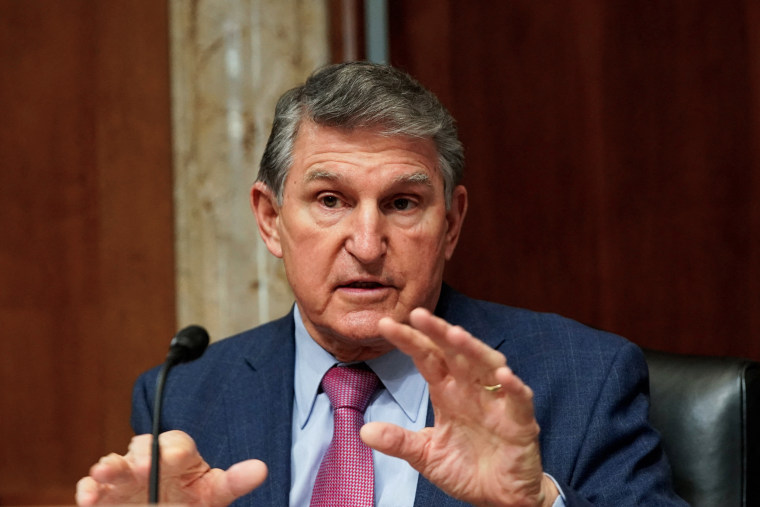
Manchin opens the ad by highlighting the failure of Build Back Better, a tenet of President Joe Biden's agenda that failed in part due to Manchin's opposition of the plan.
"I've always said if I can't go home and explain it, I can't vote for it, and that's why I opposed Build Back Better," Manchin says at the beginning of the ad.
"For Alex Mooney and his out of state supporters to suggest David McKinley supported Build Back Better is an outright lie," he adds. "David McKinley has always opposed reckless spending because it doesn't make sense for West Virginia."
Manchin isn't the first high profile West Virginian to support McKinley on the airwaves. Republican Gov. Jim Justice has also been featured in ads promoting McKinley.
Mooney and McKinley have been locked in an intense, months-long ad war as the two head to a primary on May 10. The non-partisan Cook Political Report rates this district as Solid Republican, meaning whoever wins the primary is likely to keep the seat in November's general election.
AIPAC super PAC spends over $1.6 million in four races
A new AIPAC-backed super PAC is spending big in Democratic congressional primaries. United Democracy Project is running a combined $1.6 million in four races — one in Pennsylvania, another in Texas and two in North Carolina.
In Pennsylvania, UDP has spent $472,000 so far in ads opposing state Rep. Summer Lee, a progressive candidate backed by Justice Democrats, the same group who backed Rep. Alexandria Ocasio-Cortez’s, D-N.Y., first run for Congress. Lee is seeking the Democratic nomination for Pennsylvania’s 12th district. Rep. Fred Keller, R-Penn., decided not to run again after the district became more Democratic following redistricting.
The UDP ads against Summer Lee feature a narrator who attacks her for not supporting Biden.
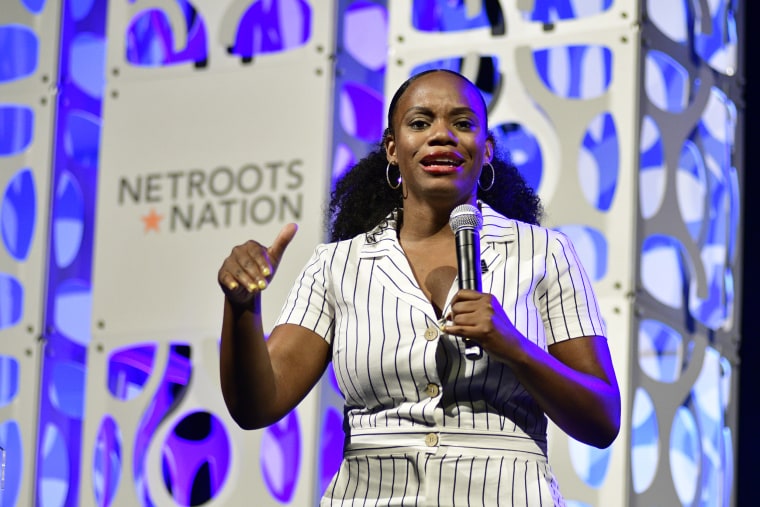
“Summer Lee attacked Biden's character, said he'd take us backwards and Lee refused to support Biden's infrastructure plan that's now rebuilding bridges and roads in Western Pennsylvania,” the ad's narrator says.
"Summer Lee, more interested in fighting Democrats than getting results,” the ad intones.
In Texas’ 28th district, where progressive Jessica Cisneros is facing Congressman Henry Cuellar, D-Texas, in a runoff primary at the end of May, UDP has spent $128,000 so far running ads against Cisneros.
The ad’s narrator tells viewers, “Jessica Cisneros would cost us thousands of jobs in south Texas,” pointing to her plan to cut the number of border patrol agents and reassign them to other functions.
“Jessica Cisneros is backed by groups who want to cut police funding, too, costing us even more jobs. Jessica Cisneros: a risk to our jobs, and our safety,” the narrator adds.
In North Carolina, UDP is running positive ads, supporting state Sen. Don Davis in the state’s first district and state Sen. Valerie Foushee in the state’s 4th district. Foushee faces seven other candidates in the Democratic primary for retiring Rep. David Price’s, D-N.C., seat.
The group has already spent over $577,000 on ads supporting Foushee.
The ads in her favor highlight her life story and her time in the state Senate, “where she stood with Roy Cooper to improve education, stop Republican attacks on voting rights and protect a woman's right to choose,” the ad’s narrator says.
Davis is running for retiring Rep. G.K. Butterfield’s seat and the ads in his favor highlight his life story and his record in the state Senate.
“Davis voted to raise teacher pay, invest in maternal health, and when Republicans tried to gut Medicaid, Don Davis took them on,” the ad’s narrator says.
UDP has spent $444,000 on ads supporting Davis so far.
Nebraska governor’s race heats up ahead of Trump rally
UPDATED 4:20 p.m. | Former President Donald Trump is heading to Nebraska on Sunday to boost his preferred candidate for governor, businessman Charles Herbster. And the rally comes as the race has heated up on the airwaves.
Herbster, who is expected to speak at the rally, faces a crowded field of candidates, including Jim Pillen, a businessman and livestock producer, and state Sen. Brian Lindstrom. Those three candidates have outspent the rest of the field on the airwaves, spending a combined $11.1 million on ads, per the ad tracking firm AdImpact.
Trump’s rally also comes as Herbster is facing sexual misconduct allegations, with eight women, including a state senator, accusing him of groping, according to a report in the Nebraska Examiner.
Herbster has denied the allegations and launched a TV ad accusing his Pillen and GOP Gov. Pete Ricketts, who has backed Pillen in the race, of conspiring to lie about Herbster. The ad compares Herbster to Supreme Court Justices Brett Kavanaugh and Clarence Thomas, who respectively faced allegations of sexual assault and sexual harassment.
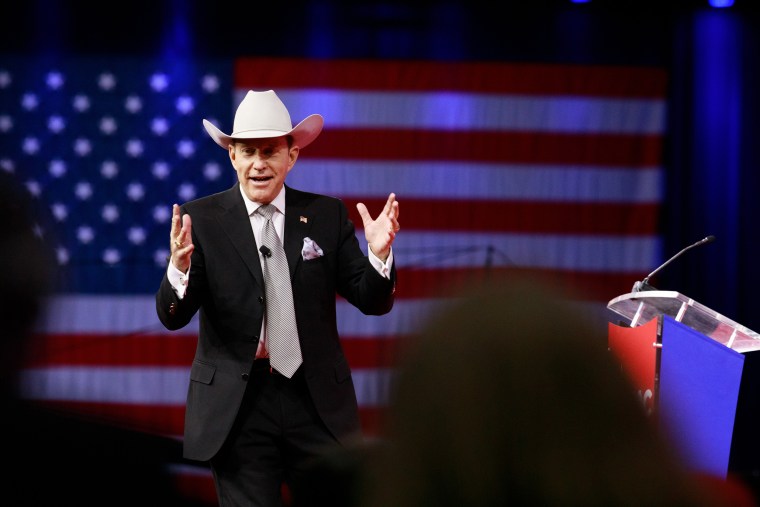
Herbster’s campaign has outspent his opponents on the airwaves, spending $5.2 million as of Friday. Pillen has spent $4.3 million on ads, while Lindstrom has spent $1.5 million. One outside group known as Conservative Nebraska has spent $848,000 on anti-Herbster ads. Another outside group known as Restore the Good Life has spent $510,000 to boost Marine veteran Michael Connely.
Whoever wins the GOP primary on May 10 is expected to win the general election. Trump won the Cornhusker State by 19 percentage points in 2020 and the Cook Political Report rates the Nebraska governor’s race Solid Republican.
This post has been updated to reflect that Trump postponed his rally from Friday to Sunday due to inclement weather.
Midterm roundup: Ohio Senate GOP primary is down to the wire
With the Ohio primary just four days away, outside groups are hitting the airwaves in the competitive GOP Senate contest. Protect Ohio Values, the Peter Thiel-backed super PAC supporting author J.D. Vance, is running a new spot attacking former Treasurer Josh Mandel as a “moderate,”noting his endorsement of 2012 Republican presidential nominee Mitt Romney.
Meanwhile, Drain the DC Swamp PAC has a new ad supporting Mandel, spanning a range of issues including Mandel’s support for the controversial Arizona audit of the 2020 election. Ohio Leads, a super PAC backing former state GOP Chairwoman Jane Timken, is up with a new spot highlighting Vance’s anti-Trump comments.
Sen. Josh Hawley, R-Mo., will hit the campaign trail for Vance on Sunday and Monday, along with Turning Point Action founder Charlie Kirk. And investment banker Mike Gibbons is hosting a tele-town hall on Monday with Sen. Rand Paul, R-Ky., and Rep. Kat Cammack, R-Fla.
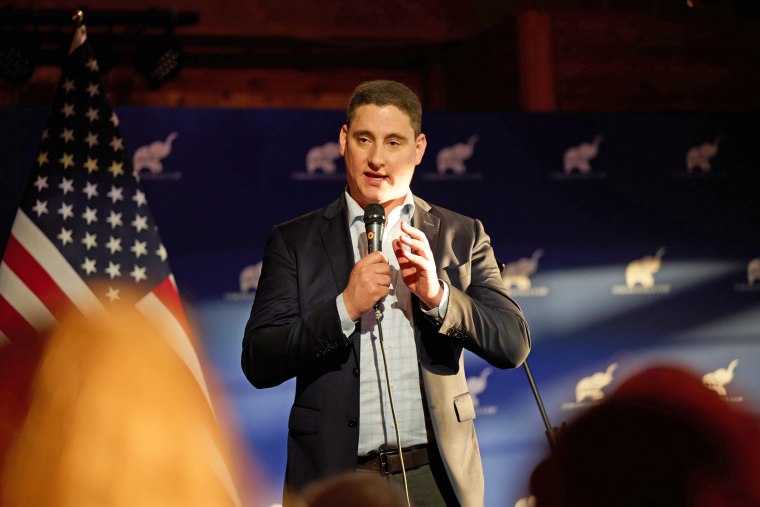
Elsewhere on the trail ...
GA-SEN: Republican Kelvin King is running his first television ad, a bio spot that criticizes incumbent Sen. Raphael Warnock on inflation.
OK-SEN: GOP Sen. James Lankford is putting $312,000 behind a new ad buy that spans virtually all of June ahead of the state’s June 28 primary, per AdImpact.
AZ-GOV: Democrat Aaron Lieberman’s first TV ad takes aim not just at GOP gubernatorial hopeful Kari Lake, but also Democratic frontrunner Katie Hobbs, criticizing her over an employment discrimination case.
HI-GOV: Punchbowl is reporting that Hawaii Democratic Rep. Kai Kahele is leaving Congress to run for governor.
GA-GOV: Republican Gov. Brian Kemp signed a handful of controversial education bills into law Thursday.
MD-GOV: Fox 45 in Baltimore has a new story noting other times when Democrat Wes Moore did not correct interviewers who misrepresented his biography. The good news for Moore: House Majority Leader Steny Hoyer is endorsing him.
IL-5: Democratic Rep. Mike Quigley says he won’t run for mayor of Chicago.
Read more in today's First Read, the daily briefing from "Meet the Press" and the NBC Political Unit on the day's most important political stories and why they matter.
Sign up for First Read here.
Data Download: Biden, Harris have only had two private lunches this year
The First Read number of the day is two, the number of times that President Biden and Vice President Harris have had private lunches this year.
That’s a significant decrease from the 21 times the two lunched in 2021, after Biden said he wanted to forge a similar relationship with his second-in-command as then-President Obama forged with him over regular, private lunches.
At this point during Biden's second year as vice president, he had 13 private lunches with Obama.
When asked about the infrequency of their lunches, Deputy White House Press Secretary Chris Meagher said: “The president and vice president are in constant touch with each other, and he relies on her counsel, partnership, and friendship as they work together to continue to grow the economy, cut costs for working families, rally the world in the face of Russia’s aggression, and make historic investments in our nation’s infrastructure.”
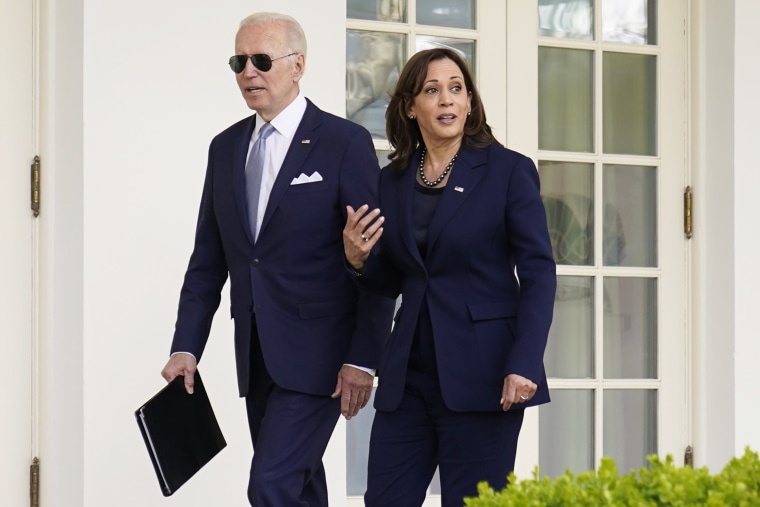
Both Biden and Harris have had separate overseas trips this year while also ramping up their domestic travel schedules. Harris also worked remotely for a period in mid-March after her husband, Douglas Emhoff, tested positive for COVID.
But Biden and Harris’ schedules overlapped often this year, with joint public or private events on 39 days, making the absence of weekly lunches more conspicuous.
Biden has had other private lunches as well this year, including one for old time’s sake with Obama. Harris later joined them for a public event about expanding the Affordable Care Act.
Read more in today's First Read, the daily briefing from "Meet the Press" and the NBC Political Unit on the day's most important political stories and why they matter.
Sign up for First Read here.
Watch: DeSantis stumps for Senate candidate in early primary state of Nevada
Florida Republican Gov. Ron DeSantis traveled to Nevada to campaign for GOP Senate candidate Adam Laxalt Wednesday night and provided some material for the 2024 speculation surrounding the governor. Watch the "MTP Daily" report:
Trump backs Clark County sheriff for Nevada governor
Former President Donald Trump has endorsed Clark County Sheriff Joe Lombardo in the crowded GOP primary to take on Nevada’s Democratic Gov. Steve Sisolak.
“As Governor, Joe will fiercely Protect our under-siege Second Amendment, Oppose Sanctuary Cities, Support our Law Enforcement, Veto any Liberal Tax Increase, Protect Life, and Secure our Elections,” Trump said in a Thursday night statement.
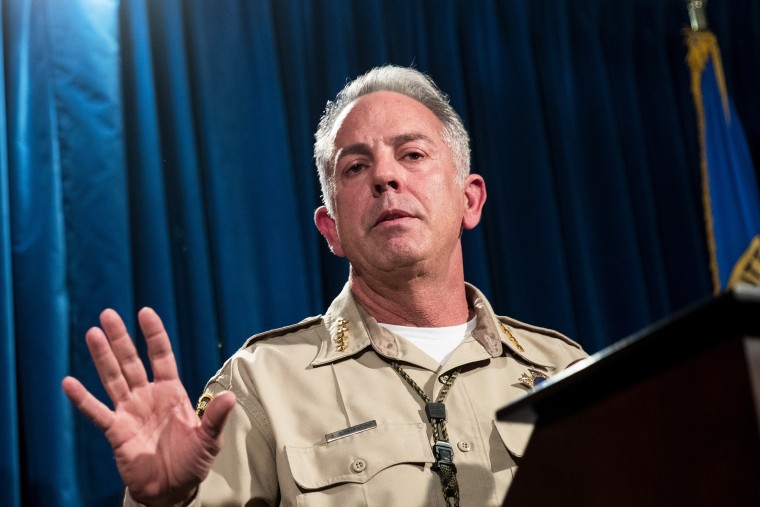
The GOP primary, which is set for June 14, also features North Vegas Mayor John Lee, venture capitalist Guy Nohra, and former Sen. Dean Heller, who Trump supported in 2018 after pressuring Heller to vote to repeal the 2010 health care law. Heller lost re-election that year by 5 percentage points.
In statements to the Las Vegas Sun, Lee said Trump “made the wrong decision” while Nohra said he would “work hard to earn every vote as I have promised." Heller’s campaign manager Jack Finn said Trump’s endorsement is “not going to change our approach one bit.”
Democrats used Trump’s decision to weigh in on the race as an opportunity to blast Lombardo.
“After months of flailing on the campaign trail and getting pummeled on the airwaves by his opponents, Joe Lombardo’s campaign is on life support and desperately called on the one person he claimed he wouldn't seek out,” Nevada Democratic Victory spokesperson Mallory Payne said in a statement. Payne was referring to Lombardo’s pushback on reporters’ questioning whether he would seek Trump’s endorsement.
Nevada is a top target for Republicans in November. President Joe Biden carried the state by just 2 points in 2020 after Hillary Clinton won the Silver State by the same margin in 2016.
Super PAC hits Vance on Ukraine war comments
A super PAC backing former Ohio Treasurer Josh Mandel is up with a new ad criticizing author J.D. Vance as "weak" on Ukraine because of past comments about his ambivalence to the war's outcome.
The ad quotes Vance saying "I gotta be honest with you, I don't really care what happens to Ukraine one way or another." The spot goes on to call Vance's comments "music to Putin's ears," evoking the state's Ukrainian population.
"Wrote a book trashing Ohioans as hillbillies, then sold his story to Hollywood. J.D. Vance, liberal elite, not for Ohio," the ad ends.
The clip comes from an interview with Steve Bannon, who was previously a top aide to former President Donald Trump. In it, Vance added that "I do care about the fact that in my community right now the leading cause of death among 18-45 year olds is Mexican fentanyl that’s coming across the southern border.”
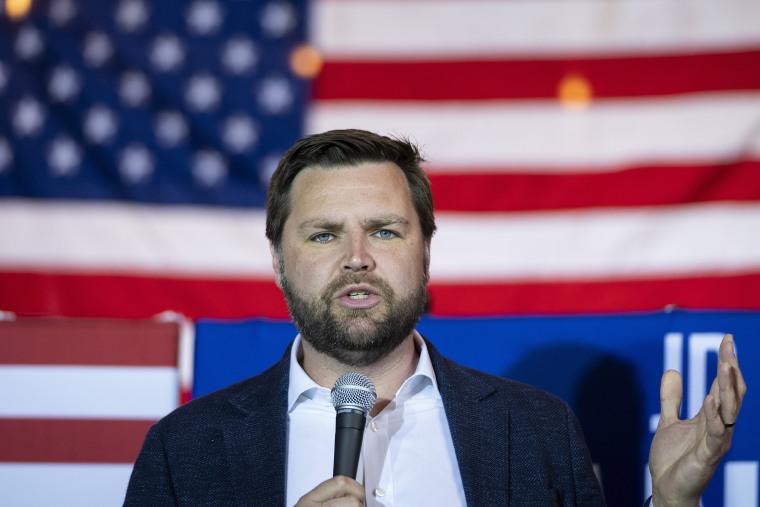
Vance subsequently put out a statement calling "Russia’s assault on Ukraine is unquestionably a tragedy," and saying that America "must avoid blundering our way into the conflict there."
But the Republican's primary opponents have used Vance's comments against him — state Sen. Matt Dolan wrote in a subsequent op-ed that "The misguided and shameful notion that we, as Ohioans and Americans, shouldn’t care about what happens in Ukraine is wrong."
Poll: Wisconsin Senate Democratic primary in dead heat
A new poll of Wisconsin's Senate Democratic primary shows two candidates at the top of the field — Lt. Gov. Mandela Barnes and Milwaukee Bucks executive Alex Lasry — but almost a majority of likely Democratic primary voters unsure of who they support.
Marquette University's poll found Barnes with support from 19 percent, with Lasry close behind at 16. State Treasurer Sarah Godlewski is at 7 percent and Outagamie County Executive Tom Nelson with 5 percent. The margin of error for the poll, conducted between April 19-24 of 363 likely primary voters, is 6.6 percent.
The results represent a downtick in support for Barnes since Marquette's February poll — down from 23 percent. Lasry has seen a slight improvement from 13 percent in April, and Godlewski's support grew from 3 percent to 7 percent.
Lasry has spent markedly more than the the rest of the field on advertising: $5.6 million, per AdImpact. Godelwski has spent $1.6 million, while Barnes has spent just $94,000.
In the other big primary in the state, former Lt. Gov. Rebecca Kleefisch leads the GOP gubernatorial primary with 32 percent, with military veteran Kevin Nicholson at 10 percent and state Assemblyman Tim Ramthun at 5 percent.
As far as voter enthusiasm ahead of November, Republicans and Democrats had similar levels of enthusiasm. Eighty-one percent of Republicans and 84 percent of Democrats said they were either very or somewhat enthusiastic to vote in November.
Maryland Democratic candidates for governor face Baltimore voters in forum
BALTIMORE — Seven of the ten Maryland Democrats running for governor gathered for an economic empowerment forum here on Tuesday night where they discussed the city's issues and laid out their positions on proposed solutions.
For the candidates, it's a crucial city to court. In the 2018 Democratic gubernatorial primary, Baltimore City voters made up 14.3 percent of the primary electorate, the fourth largest county in the state by proportion of voters.
And it has plenty of issues for candidates to talk about — the city is last in the state in high school graduation rate, has the highest rate of homelessness in the state and the highest rate of crime per 100,000 people of any other county in the state. And in eight years under Republican Gov. Larry Hogan, Baltimore has seen a public transit plan for the city axed and funding withheld from some public schools.
It was with that backdrop that voters got a chance to scrutinize most of the candidates at Coppin State University in West Baltimore on Tuesday.

The candidates — former Prince George’s County Executive Rushern Baker, nonprofit leader Jon Baron, state Comptroller Peter Franchot, former state Attorney General Doug Gansler, former nonprofit executive Wes Moore, former U.S. Secretary of Education Tom Perez and philosopher Jerome Segal — discussed their plans to tackle criminal justice reform, economic inequality and expanding public transit.
Three candidates were not in attendance — former U.S. Secretary of Education John King, teacher Ralph Jaffe and Ashwani Jain, a former staffer in the Obama administration.
The candidates weighed in on their stances on the transit system, and explained their plans to implement the Blueprint for Maryland’s Future, an education bill passed by the state legislature in 2021.
On criminal justice reform, the candidates agreed there was more to be done to reform Baltimore’s police department, which has been embroiled in multiple scandals in the last ten years, including the 2015 death of an unarmed Black man, Freddie Gray, in police custody.
Baker touted his record on police reform as a county executive, telling viewers, “by the time I left, we had not only reduced crime by 50 percent, we also had reduced arrests.”
He added, “Here’s the thing. In this city, we have had over 2,000 murders over the last eight years. That is unacceptable.”
There’s very little light between the candidates in this race — all tout relatively progressive stances on everything from funding for Maryland's four HBCUs, K-12 education, transit and criminal justice. But questions about electability in a general election are creeping in.
Maryland is a deeply Democratic state — President Joe Biden won the state by more than 30 points in 2020. But, Hogan, a Republican, won the governor’s mansion for two terms in a row.
Gansler was the only one to bring up the subject on Tuesday, arguing that someone who has won a statewide election would be the best bet in a general election.
"We just need a governor who cares about Baltimore, which is why it’s going to be so important to elect a Democrat that can actually win," he told voters.
All ten candidates have less than three months left until the July 19 primary that was was pushed back from June due to redistricting issues.
The Democratic nominee will face one of four Republican candidates for governor — state Rep. Dan Cox, former state Commerce Secretary Kelly Schultz, attorney Robin Ficker and Joe Werner, who previously ran for office as a Democrat.
New poll shows warning signs for Mehmet Oz in Pennsylvania’ Senate primary
A new Monmouth University poll of Pennsylvania’s upcoming Senate primaries next month contains warning signs for Dr. Mehmet Oz in the GOP contest, despite the celebrity doctor recently receiving former President Donald Trump’s endorsement.
Notably, the poll doesn’t have horserace numbers (this comes after Monmouth’s decision to stop election polling after erring in last year’s gubernational race in New Jersey).
But the other numbers — favorable/unfavorable scores, more likely/less likely to vote) — show Oz faring worse than rival David McCormick.
Favorable/unfavorable scores
- David McCormick 51 percent favorable, 15 percent unfavorable.
- Mehmet Oz 48 percent favorable, 37 percent unfavorable.
- Jeff Bartos 28 percent favorable, 6 percent unfavorable.
- Kathy Barnette 37 percent favorable. 5 percent unfavorable.
More likely/less likely to support
- McCormick 61 percent likely to support (including 19 percent very likely) vs. 29 percent not likely to support.
- Oz 51 percent likely to support (including 22 percent very likely) vs. 42 percent not likely to support.
- Barnette 51 percent likely to support (including 18 percent very likely) vs. 33 percent not likely to support.
- Bartos 45 percent likely to support (including 7 percent very likely) vs. 39 percent not likely to support.
Asked specifically about Trump’s endorsement of Oz, 22 percent of GOP voters say it gives them a more favorable view of Oz, 8 percent say a less favorable view, and 69 percent say it makes no difference.
For the Democratic Senate primary, frontrunners Lt. Gov. John Fetterman and Congressman Conor Lamb both enjoy positive numbers, but Fetterman’s are stronger.
Favorable/unfavorable scores
- John Fetterman 68 percent favorable, 5 percent unfavorable.
- Conor Lamb 51 percent favorable, 6 percent unfavorable.
- Malcom Kenyatta 32 percent favorable, 4 percent unfavorable.
More likely/less likely to support
- Fetterman 74 percent likely to support (including 44 percent very likely) vs. 13 percent not likely to support.
- Lamb 59 percent likely to support (including 23 percent very likely) vs. 24 percent not likely to support.
- Kenyatta 40 percent likely to support (including 14 percent very likely) vs. 45 percent not likely to support.
The Monmouth poll of Pennsylvania was conducted April 20-25, and it has a maximum margin of error of plus-minus 4.9 percentage points.
Midterm roundup: Ad-Vance-ing in the polls
WASHINGTON — Next week’s Ohio primary will be the first big test of whether former President Donald Trump’s endorsement can propel a candidate to victory, and a new poll shows that it might.
Fox News released a poll of the GOP Senate primary showing Trump’s pick in the race, “Hillbilly Elegy” author J.D. Vance, at 23 percent among Republican primary voters — followed by former state Treasurer Josh Mandel at 18 percent, investment banker Mike Gibbons at 13 percent, state Sen. Matt Dolan at 11 percent and former state GOP Chairwoman Jane Timken at 6 percent.
Importantly, Vance’s 5-point lead is within the poll’s margin of error, and 25 percent of GOP primary voters say they’re still undecided.
Meanwhile, the race has pitted Trump against Club for Growth Action, threatening their alliance, per The New York Times. The group, which is backing Mandel, launched a new ad with footage of Vance describing himself as a “Never Trumper.”
Elsewhere on the campaign trail:
Georgia Senate: Former football player Herschel Walker reserved $1 million in airtime in his first major TV buy of the Georgia Senate race tracked by AdImpact. Walker is Trump’s pick in the race, and he is favored to win the May 24 GOP primary. His first TV ad is a 30-second bio spot that also touts Trump’s endorsement.
Utah Senate: Republican Sen. Mike Lee is out with a new spot framing him as someone who hasn’t been changed by Washington.
Florida Governor: The Dispatch reports that Democratic Rep. Charlie Crist has only voted in person four days of this House session, with his spokeswoman saying “the proxy offers a great way to ensure his constituents’ voices continue to be heard” while he’s running for governor.
Kansas Governor: Democratic Gov. Laura Kelly is up with a new spot where she literally stands in the middle of the road to argue she’s “not too far right, or too far left.”
Maryland Governor: At an economic empowerment event in Baltimore last night, seven of 10 candidates for the Democratic nomination for governor discussed their plans for criminal justice reform, the implementation of new public transit and education.
North Carolina 11: Republican Rep. Madison Cawthorn had a rough news day, first accused of bringing a gun to the airport before a new report from the Washington Examiner questioning whether he improperly touted a cryptocurrency based on the “Let’s Go Brandon” meme.
Texas 28: South Carolina Democratic Rep. Jim Clyburn is heading to Texas to stump for Rep. Henry Cuellar before next month’s Democratic primary runoff.
McCormick hits Oz over Trump endorsement in new ad
After Monday night’s Republicans debate in Pennsylvania’s Senate race, where Mehmet Oz touted his endorsement from former President Donald Trump, rival David McCormick has released a new TV ad directly addressing Trump’s endorsement of Oz.
“I like Trump,” says one voter in ad.
“I love Trump,” says another.
“But not his Senate pick,” says a third voter.
“Trump made a mistake on this,” says a fourth.
McCormick struck the same themes in Monday night’s debate, where he told voters, “the reason Mehmet keeps talking about President Trump’s endorsement is because he can’t run on his own positions and his own record.”
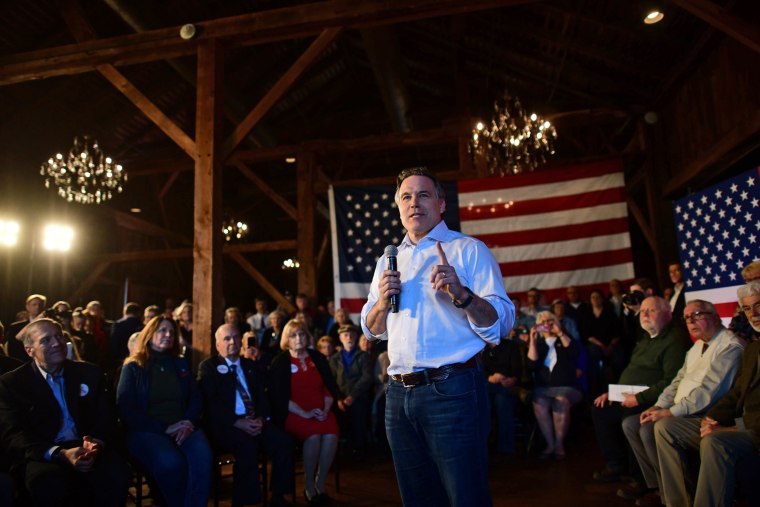
Oz did tout his endorsement from Trump multiple times on the debate stage Monday night. At one point he said, "Mr. McCormick approached President Trump ... but was unable to pull the wool over his eyes. President Trump saw right through him. He therefore did not endorse Mr. McCormick, he did endorse me."
This commercial is the latest in an ad war between Oz and McCormick, who have spent over $20 million combined on the airwaves so far, according to AdImpact, an ad tracking firm.
Oz and McCormick are neck-and-neck in the race and have been at a near tie in recent local polling. The state’s primary is just three weeks away, on May 17.
Cisneros attacks Cuellar on abortion ahead of May runoff
Texas Democrat Jessica Cisneros has launched her first new ad ahead of her runoff election against Repp. Henry Cuellar, a spot that criticizes the incumbent for his 2021 vote against expanding abortion access.
The ad's narrator begins the spot by mentioning Texas' strict abortion law, which went into effect last year and is being challenged in court. It goes on to note that Cuellar, shortly after the state law passed, voted against a federal law that aimed to codify abortion rights protections.
Cuellar was "the lone Democrat against a woman's right to make her own decisions," the narrator says.
"On May 24, you can have the last word. Jessica Cisneros is the pro-choice candidate who will fight for our health care and always protect our right to make our own decisions."
Cuellar has long been to the right of his party's base on emotional issues like immigration and abortion, something that has fueled progressives like Cisneros to oppose him. But the longtime congressman has defended himself from those attacks for years, arguing he's representing the will of his constituents and that he delivers for the district.
The latter is the focus of a new Cuellar ad, where a woman says: "Henry helps us with prescriptions and Social Security benefits. If we lose him in Congress, we lose everything."
Pa. Democratic Senate primary to see increased ad spending as challengers try to catch Fetterman
With just a few weeks left before Pennsylvania’s midterm primary election, candidates have started to target the frontrunner in the Democratic primary for U.S. Senate.
Lt. Gov. John Fetterman has led in the polls and was dominating the campaign ad airwaves up until a few weeks ago. One of the first outside groups to attack him, a pro-Rep. Conor Lamb group called Pennsylvania Progress, drew ire from establishment Democrats for calling Fetterman a “silver spoon socialist.”
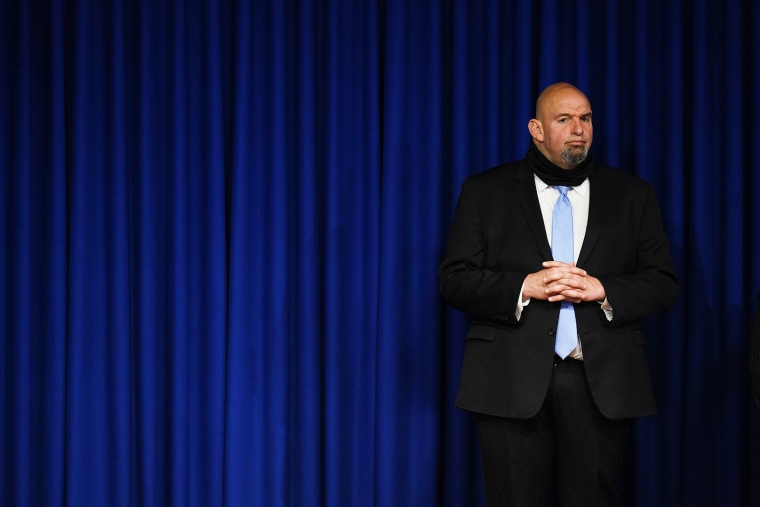
Since then, Fetterman has had to engage in two debates with his rival candidates — Lamb, state Rep. Malcolm Kenyatta and Jenkintown Borough Council member Alexandria Khalil — where he’s been questioned about a 2013 incident where he pointed a firearm at an unarmed Black jogger. The incident was briefly mentioned again at the most recent debate Monday night where Fetterman again denied the allegation that he pointed the gun at the man's chest, according to the Philadelphia Inquirer.
His candidacy has also been criticized as being too progressive to win a general election in Pennsylvania. and in Monday's debate, he flashed some progressivism by arguing that government spending packages passed under the Biden administration didn't contribute to rising inflation.
The contest is about to expand to the airwaves. Through Tuesday, Fetterman has spent the most on TV ads of all the Democratic candidates and groups — over $3.5 million according to AdImpact, an ad tracking firm. Lamb has spent over $1.4 million and Kenyatta trails at less than $100,000.
Outside groups have spent less than Fetterman as well, with Pennsylvania Progress, the group that called him a socialist, having spent $1.2 million before today.
But looking ahead, Fetterman could be outspent in the remaining days leading up to the May 17 primary. For the period between Tuesday and May 17, Lamb has secured $1.3 million worth of ad space and Fetterman has only secured $714,000 worth, according to AdImpact.
Pennsylvania Progress has also already planned over $230,000 worth of ad time.
Oregon Democrat touts Biden endorsement in new TV ad
Rep. Kurt Schrader, D-Ore., has launched a new TV ad touting President Joe Biden’s endorsement ahead of the May 17 primary.
The 30-second spot features footage of Biden praising Schrader earlier this month, saying the seven-term congressman has "played a key part in the progress we've made as a nation on jobs, economic growth and clean energy. And he's [a] strong and consistent voice to make sure we modernize infrastructure and help Oregon and everyone all across America."
Schrader is a member of the moderate Blue Dog Coalition, and he led the group's political arm. Schrader has broken with Biden on some high-profile votes, including as one of two Democrats who voted against Biden's so-called American Rescue Plan for pandemic relief. He also opposed a proposal that would have allowed Medicare to negotiate prices for prescription drugs.
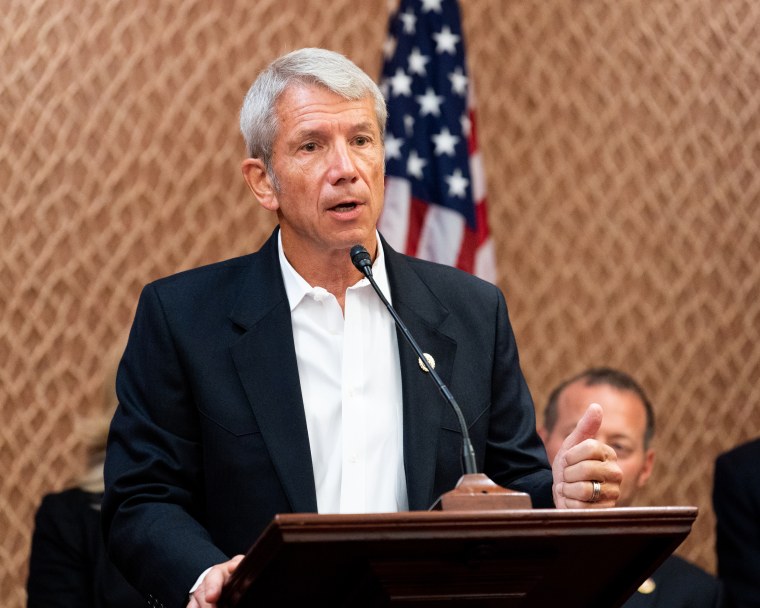
Schrader is now trying is trying to fend off a primary challenge from his left in the newly drawn 5th District. He faces former Talent City Manager Jamie McLeod-Skinner, who has been endorsed by Sen. Elizabeth Warren, D-Mass.
Roughly $2.5 million has been spent on ads in the race, which has divided national and local Democrats. A trio of outside groups, including two with ties to the pharmaceutical industry, has spent a combined $1 million on ads supporting the congressman, according to the ad tracking firm, AdImpact. McLeod-Skinner has only spent $100,000 on the airwaves.
Midterm roundup: Peach State poll
A new Atlanta Journal-Constitution poll shows Georgia Gov. Brain Kemp with a significant lead over his GOP primary challenger, former Sen. David Perdue, despite Perdue running with former President Donald Trump’s endorsement. A majority of likely GOP voters — 53 percent — back Kemp, while 27 percent support Perdue.
Kemp needs to win a majority of the May 24 primary vote to avoid a runoff.
Trump, for his part, is sticking by Perdue, saying in a statement last night, “it is not easy to beat an incumbent, however, if our voters turn out, David Perdue will win in a landslide.”
The poll also finds 66 percent of likely primary voters supporting former football player Herschel Walker, who has Trump’s backing in the Senate race, while the other candidates polled in the single digits. Roughly 23 percent said they were undecided.
The University of Georgia’s School of Public and International Affairs conducted the poll, surveying 866 likely primary voters from April 10-22. The survey had margin of error of 3.3 percentage points.
Elsewhere on the campaign trail:
Colorado Senate: Republican Joe O’Dea is up with a new ad touting his business career, highlighting his support for the military and police, as well as a promise to “stop inflation.”
Ohio Senate: Former state Treasurer Josh Mandel has a new ad that features footage of Trump-backed candidate J.D. Vance saying he’s a “never-Trumper.”
Florida Governor: Republican Gov. Ron DeSantis signed into law a new bill that creates an election police unit for the state that will investigate voter fraud and other election-related crimes.
Pennsylvania Governor: Pennsylvania Attorney General Josh Shapiro, the top Democrat in the gubernatorial race, is up with his first TV ads with a minute-long bio spot and an ad highlighting his work against predatory student loan companies.
Texas Governor: Democrat Beto O’Rourke tested positive for Covid, and says his symptoms are mild.
Wisconsin Governor: GOP businessman Tim Michels launched his gubernatorial bid Monday that he says he will fund primarily with his own personal wealth.
Ohio 11: The Democratic Majority for Israel PAC goes after former Bernie Sanders campaign co-chair Nina Turner in a new ad as Turner takes on Democratic Rep. Shontel Brown in a primary rematch.
Kansas redistricting: A district court judge rejected the GOP legislature’s congressional map, ordering the legislature to draft another one that is less partisan and does not dilute the power of minority groups.
Climate agenda: NBC’s Julie Tsirkin reports that West Virginia Democratic Sen. Joe Manchin and Alaska Republican Sen. Lisa Murkowski organized a bipartisan meeting to discuss the possibility of a bipartisan climate and energy security bill, including seven GOP senators, eight Democratic senators and three House members.
Young Americans sour on Biden, politics broadly
Young Americans could still turn out in droves in the midterms, but they’re souring on President Joe Biden and politics writ large, according to a new online poll from the Harvard Institute of Politics. The new survey comes amid Democratic fears that a depressed youth turnout could hurt their chances in November.
A majority of 18 to 29 year-olds surveyed in the poll agreed that “politics today are no longer able to meet the challenges our country is facing.” Just 41 percent of young Americans approved of Biden, which is down from a similar survey conducted in the late fall, which found 46 percent of young Americans approved of Biden.
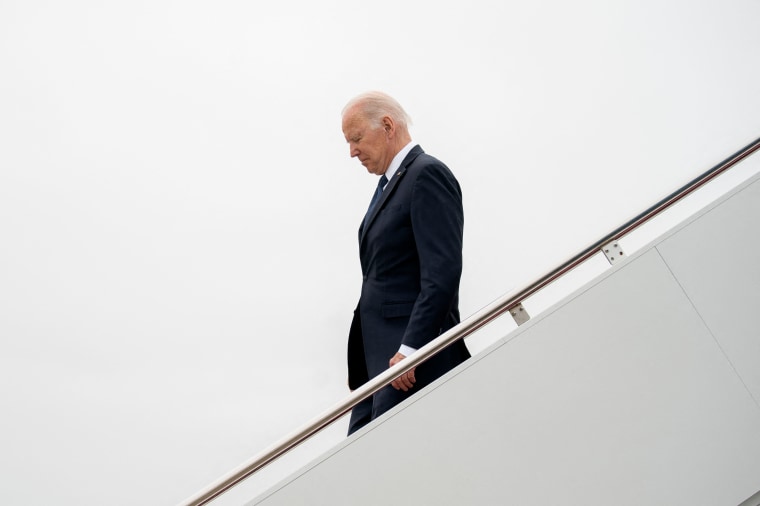
The online poll, which had a margin of error of 2.9 percentage points, did find that young voters expressed interest in the upcoming midterm elections, with 36 percent saying they will definitely vote. That figure was at 37 percent during the 2018 midterms, which saw record high youth turnout for a midterm.
Young Americans also still tend to favor Democrats, with 55 percent saying they preferred Democratic control of Congress, and 34 percent saying they preferred GOP control. B
But Young Republicans reported an increase in enthusiasm about the election, while Democratic enthusiasm dropped compared to 2018.
That year, 51 percent of Democrats said they were more likely to vote, while 46 percent now say the same. Meanwhile 43 percent of Republicans said they were more likely to vote, an increase from the 36 percent who said the same in 2018.
"While this is an off-year election; there’s no evidence in this survey that young Americans are off the grid,” IOP Polling Director John Della Volpe said in a statement. “Their contempt for a system that favors the elite and is overwhelmingly partisan is clear, but at the same time they see a role for government and are unlikely to abandon those most in need.”
The poll surveyed 2,024 18 to 29 year-olds online from March 15 through March 30.
Ad Watch: Democratic senate candidate hits both parties in new spot
Republicans appear to have a midterm strategy to win over voters this year — attack President Joe Biden and Democrats over inflation and immigration. On top of those issues, Democrats are also facing a stalled agenda, and a war between Russia and Ukraine as they have struggled to settle on a unified message.
In North Carolina, Democrat Cheri Beasley, a former state Supreme Court chief justice, is trying out one message she hopes will resonate with voters: Blame both parties.
In a new ad out Monday, Beasley tells voters, "Looking at Washington, I think both parties are doing the job wrong. Instead of focusing on what people care about, they get caught up in political games."

Beasley is not the only candidate distancing herself from both parties to gain favor with voters. Earlier this month, Rep. Tim Ryan, D-Ohio, ran an ad in his campaign for U.S. Senate where he said, “We can't afford to be Democrats and Republicans. Right now, we have to be Americans first."
Both Beasley and Ryan are running in states with incumbent Republican senators. Ryan is running to fill Sen. Rob Portman's, R-Ohio, seat when he retires at the end of his term. Beasley is looking to flip Sen. Richard Burr's, R-N.C., seat when he retires at the end of his term.
In Georgia, too, Sen. Raphael Warnock, D-Ga., has struggled to find a message to entice voters after just one year in office, where Democrats failed to pass any major piece of President Biden's agenda. In a recent ad, he highlighted just that — his newness to the Senate.
"In just a year in the Senate did I think I could fix Washington? Of course not," he says in the ad, trying to convince voters that he needs a full term to make a big difference.
NRSC targets Mark Kelly on immigration
The National Republican Senatorial Committee is targeting Sen. Mark Kelly, D-Ariz., in a new ad campaign in the senator’s home state.
While Arizona Republicans won’t have an official nominee to replace Kelly until after the August 3 primary, the NRSC — the campaign arm for Senate Republicans — is filling the void when it comes to attacking the Democrat.
The ad's narrator claims that “Kelly votes 97% with Biden. He voted for sanctuary cities, for benefits to illegals and against a border wall.”
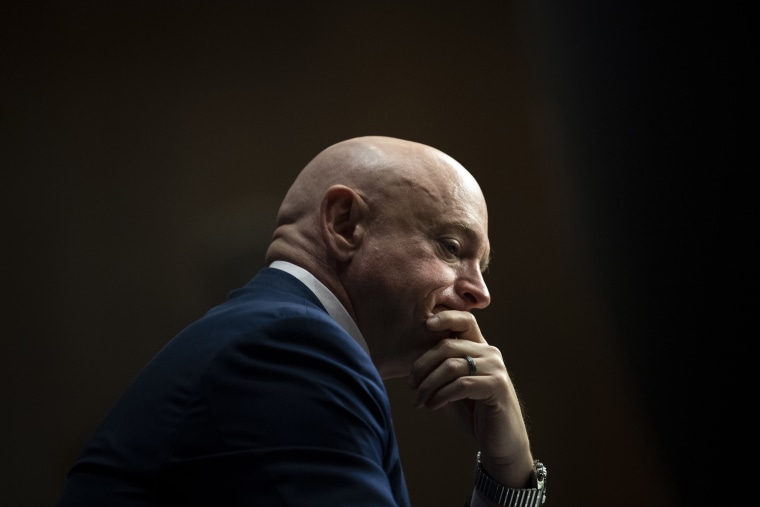
“Tell Senator Kelly stop voting with Biden and against Arizona,” the ad continues.
Kelly has voted with Biden’s agenda 97.7 percent of the time, according to FiveThirtyEight. But he's also opposing the president on at least one major immigration issue — the administration’s plan to lift Title 42, a pandemic-era rule that prohibited migrants seeking asylum from crossing the border.
Kelly and a bipartisan group of senators even introduced a bill to delay the lifting of Title 42, which is currently set to end on May 23.
The NRSC is running ads targeting Kelly in English and Spanish, hoping to appeal to Arizona’s large Spanish-speaking population.
“This will continue to be an important theme in both English and Spanish advertising,” Chris Hartline, the NRSC’s communications director told NBC News.
This particular commercial is part of a seven-figure ad buy, Hartline added.
He also said that the group will continue to attack Kelly on other themes, too, including inflation and his past in business.
David Perdue’s 2022 gubernatorial bid has been mostly about 2020
In Georgia’s upcoming Republican gubernatorial primary, former Sen. David Perdue has relied — almost entirely — on Donald Trump and relitigating the former president’s discredited claims about fraud in the 2020 presidential election, according to an analysis of Perdue’s ads, speeches and tweets in his contest against incumbent Gov. Brian Kemp.
All five of Perdue’s television ads have mentioned the 2020 election or election security, and they all prominently feature Trump’s endorsement.
“Kemp is just another establishment politician who fought Trump,” Perdue says in his most recent ad. “I'll make sure our elections are never stolen again,” he continues, arguing that Kemp shouldn’t have certified the 2020 presidential election results after Joe Biden defeated Trump in the Peach State by more than 11,000 votes.
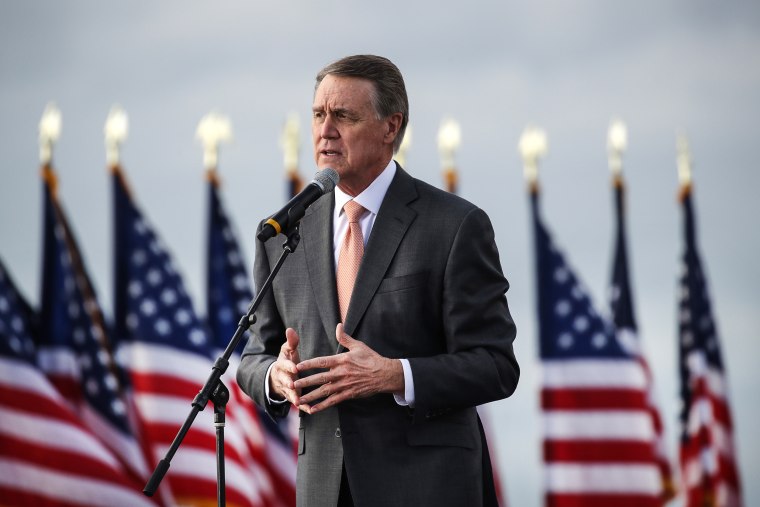
In Perdue’s five-minute speech at Trump’s rally in Commerce, Ga., in March, all five minutes were dedicated to Trump’s presidential record, the 2020 election and Perdue’s top campaign issue of establishing an election law enforcement agency and eradicating Dominion voting machines.
“In the state of Georgia, thanks to Brian Kemp, our elections in 2020 were absolutely stolen,” Perdue said.
And of Perdue’s nearly 70 tweets since March 1, 17 have mentioned Trump; four have mentioned Trump’s son, Donald Trump Jr.; eight have mentioned 2020 election theories or allegations of fraud; and only four mention other issues — like eliminating the state income tax and education.
“President Trump endorsed me because he knows Kemp can’t defeat Abrams in November. Kemp abandoned conservatives, divided our party, and can’t pull us together,” Perdue, the former senator who lost his seat in Jan. 2021, tweeted back in March.
“Georgia conservatives have been abandoned by Kemp, and he cannot pull the party together to win the general election," Perdue’s campaign said in a statement to NBC News.
“While David Perdue continues to run a failing campaign based on lies about Brian Kemp's record, Gov. Kemp will continue to tell the truth, [and] share his record with Georgia voters," said Cody Hall, Kemp's communications director, responds.
Polls have consistently shown Kemp leading Perdue in the May 24 primary, with one Fox News poll from March putting the incumbent governor ahead by double digits.
Still, Charles Bullock, a political-science professor at the University Georgia, points to recent polling finding that nearly half of Republican voters believe Trump’s endorsement is very or somewhat important, as well as three-quarters of them saying that widespread voter fraud took place in 2020.
In fact, Perdue allies point to how Trump’s endorsement of Kemp in 2018 catapulted him to the governor’s mansion four years ago.
If no candidate clears 50 percent of the vote next month, this GOP gubernatorial primary will head to a June 21 runoff, and the winner will face Democrat Stacey Abrams in November.
Rivals confront Fetterman at debate over 2013 gun incident
Pennsylvania Senate Democratic hopefuls Rep. Conor Lamb and state Rep. Malcolm Kenyatta pushed Lt. Gov. John Fetterman onto the defensive during Thursday's primary debate over questions about a 2013 incident when Fetterman confronted an unarmed Black jogger with a shotgun after saying he heard gunshots.
Asked if he would do anything differently about the incident today, Fetterman recounted the situation and said that: "It's not it's certainly not a situation that anyone would want to be involved with with gun violence. But I'd like to point out that I'm the only Democrat on this stage that has successfully confronted crime and gun violence and has been in charge of a police department."
He quickly clashed with his rivals over the question of whether he pointed his gun at the jogger, Christopher Miyares. Miyares has said that Fetterman pointed the gun at his chest, but Fetterman has repeatedly denied that charge. When the lieutenant governor describes the incident, he has said he had his gun but never pointed it at Miyares.
“Not only will John not admit that to pointing, he won't admit that he was pointing the gun at this person," Lamb said during the debate.
"He also won’t really answer your question as to whether he did anything wrong and should have done it differently. And I just think that's disqualifying for any of us who have to work hard to gain the trust of the black community.”
Then state Rep. Malcolm Kenyatta, who is Black, repeatedly asked Fetterman if he would apologize for the incident. After Fetterman denied pointing the gun at the man and repeated his comments that he "successfully confronted gun violence" in his town while mayor, Kenyatta replied: "You're the only Democrat who used a shotgun to chase down an unarmed black man."
While the conversation about the incident may have been the flashpoint of the debate, the three candidates mixed it up on a variety of other issues.
Lamb and Kenyatta came out against suspending the federal gas tax, something Fetterman said he'd support. Lamb and Fetterman supported extending the Title 42 pandemic border policy that has blocked asylum on the Southern border, and split on Philadelphia's recent, and brief, reimposition of its indoor mask mandate (Fetterman and Kenyatta against it, with Lamb supportive of it).
And the group tangled over Fetterman's support for a tax on the wealthiest individuals. Fetterman responded to a question from the moderator about what income levels he'd want a wealth tax to apply for by saying "you know it when you see it."
That prompted both Lamb and Kenyatta to attack, criticizing Fetterman for offering a lack of specifics.
The race for Indiana's ninth district heats up on the airwaves
Indiana’s primary election is less than two weeks away, and the Republican fight for the state’s ninth Congressional District is heating up on the airwaves.
The seat is up for grabs in the wake of Rep. Trey Hollingsworth’s decision not to seek another term, setting up a battle featuring nine candidates, three of whom have been spending on TV ads.
Stu Barnes-Israel, a veteran who’s running for the Republican nomination, has been up on the air for weeks. In an ad from March, he touts his “conservative plan” to “fight for freedom, lower gas prices and secure the southern border.”
Barnes-Israel has also had an outside group, Hoosier Values, running ads in his favor.
In one such ad, the narrator says, “Hoosiers don't need another politician in Congress. We need a conservative outsider. Stu Barnes Israel.”
“Stu supports a strong military and opposes Biden's disastrous foreign policy,” the narrator adds later.
Barnes-Israel has also earned endorsements from former Secretary of State Mike Pompeo, Sen. Tom Cotton, R-Ark., and former Interior Secretary Ryan Zinke.
His most prominent opponents are two candidates who have run for the seat before — businessman Mike Sodrel and former state Sen. Erin Houchin. Sodrel even served as the representative for this district for one term from 2005 to 2007.

Sodrel’s ads have focused on inflation, with a narrator telling voters “Mike Sodrel will work to get American energy independent again, stop inflation and lower prices at the gas pump.”
He’s also got an outside group running ads to support him and attack Houchin.
“Career politician Erin Houchin has failed us. It's time to drain the swamp,” a narrator says in an ad funded by the House Freedom Action. The group supports conservative candidates in congressional elections across the country. In Wyoming, they’re backing an opponent to Rep. Liz Cheney, R-Wyo., and in Colorado, they support right wing Rep. Lauren Boebert, R-Colo.
Meanwhile, Houchin has been touting her record in state politics in an ad.
“To save America, we have to fight,” she says. “I fought Biden's mandates, and won. After the 2020 election, I wrote the bill to require photo ID for everyone. I authored the ban on critical race theory and have been the state's number one defender of our law enforcement officers.”
She adds, “I'm pro-life, pro-Trump, pro-Second Amendment.”
Of the candidates, Sodrel has spent the most on ads so far, dropping $225,000, per AdImpact, an ad-tracking firm. Houchin is behind him, having spent $133,000 and Barnes-Israel trails, with only $111,000 spent on ads.
Sanders advisor: Democrats need to use power, authority
Faiz Shakir, a senior advisor to Sen. Bernie Sanders and his former campaign manager called on Democrats to embrace a more progressive stance in the midterm elections in an interview with MTP Daily Thursday.
Shakir discussed a memo he recently wrote to Sanders supporters, in which he argued that a progressive agenda is popular and can work to win elections.
“The Democratic Party is certainly losing some support,” Shakir said on Thursday. “Who are they losing support with? Young people, working class people, disaffected people who have become cynical about politics. Who speaks to them? How do you get people who aren’t already with you? And I think Senator Sanders’ vision does that.”
Watch the full interview:
Outside group hits Alabama GOP's Mike Durant on gun comments
A new ad in Alabama's hotly contested GOP Senate primary uses old footage of Mike Durant talking about gun regulations to argue that he's a "RINO," or a Republican In Name Only.
The new spot from Alabama RINO PAC, which popped up earlier this year to attack Durant, relies on recently unearthed footage of Durant in 2011, when he said: "From a military perspective, the first thing that needs to be done is to disarm the population. Let’s face it, if we could do that in some of our U.S. cities, that would be a pretty good step toward law and order. But, you ever ask yourself: Why don't we do it here? Because it's hard. It could result in rioting and widespread rebellion, making the situation worse."
While the comments are more than a decade old, they were recently unearthed by the conservative media website Breitbart. In response, Durant told the Rightside Radio show that the comments were "mischaracterized" and that he's "absolutely pro-2nd amendment" with his "own collection of weapons."
"I was an attack helicopter pilot in special aviation operations. I shoot more rounds every month than most people shoot in their lives. You know, this is just typical. If this is the best you can do ... my opponents can dig up something from 10 years ago that wasn’t really what I was saying, then, you know, I guess it’s part of the game. But to me, it’s really meaningless.”
Durant is running primarily against former GOP Senate aide Katie Britt and Rep. Mo Brooks, who had been endorsed by former President Trump before he rescinded his endorsement.
Alabama RINO PAC has spent about $630,000 on ads in the race so far, far less than other outside groups — the Club for Growth, which is backing Brooks, has spent $3.5 million and Alabama's Future, which has opposed Brooks, has spent $3.7 million, per ad-tracking firm AdImpact.
Durant has spent more on advertising than any other candidate with $2.4 million, ahead of Britt's $1.9 million.
UPDATE: Durant launched an ad on Friday responding to the super PAC spot, calling it a "false attack ad."
March NBC poll found country split over transportation mask mandate
In light of the recent federal court decision that halted the Centers for Disease Control and Prevention's mask mandate on public transportation, NBC's last poll in March found a slight majority supported keeping the mandate in effect.
FIfty-one percent said that the government should continue to require face masks on public transportation, with 46 percent saying that they wanted the government to end the requirement (within the poll's 3.1 percent margin of error).
Out of those who wanted the mandate to continue, 38 percent wanted it to last longer than 6 more months, 28 percent wanted it to last between 4-6 months, 16 percent wanted it to last 2-3 more months and 3 percent said they wanted it to last for the next month.

The main fault lines on the issue were by political leaning and race. Eighty-four percent of Democrats supported keeping the mandate in place, but just 22 percent of Republicans.
People of color (70 percent keep, 27 percent end mask mandate) were far more likely than whites (43 percent keep, 55 percent end) to support the mandate's extension.
NBC polled 1,000 adults from March 18-23, about a month before this week's decision U.S. District Judge Kathryn Kimball Mizelle for the Middle District of Florida that the CDC lacked the authority to impose the mandate. The Justice Department is appealing the ruling, but right now, the mandate is not being enforced.
Rep. Joe Wilson endorses primary challenger against fellow SC Rep. Nancy Mace
GOP Rep. Joe Wilson, R-S.C., has endorsed Republican Katie Arrington in her primary bid against one of his own colleagues, fellow GOP South Carolina GOP Rep. Nancy Mace.
“Katie is a proven fighter for our conservative principles of limited government with expanded freedom which provides for a strong national defense and the safeguarding of our border,” Wilson said in a statement first reported by The State Newspaper. Wilson garnered national attention for shouting, "You lie!" during former President Barack Obama's 2009 State of the Union address.
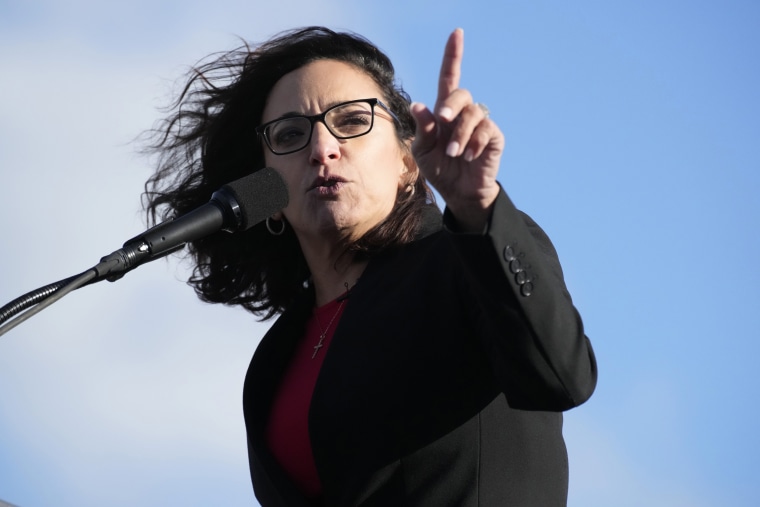
Mace responded by saying that Wilson is not sufficiently conservative and that he "is the reason we need term limits in Congress."
It’s unusual, but not unprecedented, for a House member to back a primary challenger taking on one of his or her colleagues. Four Democratic House members, for example, have endorsed attorney Jessica Cisneros over Texas Rep. Henry Cuellar.
Former President Donald Trump endorsed Arrington in February, setting up the primary as a test of Trump’s influence in the party. Mace sharply criticized Trump after a mob of Trump supporters stormed the Capitol on Jan. 6, but she was not one of the 10 House Republicans who voted to impeach him for inciting an insurrection.
Mace has argued that she is best positioned to win the 1st District in November. Arrington lost the 1st District in 2018 after defeating another Trump critic, former GOP Rep. Mark Sanford, in a Republican primary. The 1st District did become more Republican after redistricting, per 538. The Cook Political Report rates the 1st District race Solid Republican.
Like other Republicans facing Trump-backed primary challengers, Mace outraised Arrington in the first fundraising quarter of the year. Mace raised $863,000, ending the quarter with $2 million in her campaign account, while Arrington raised $814,000 and had $754,000 on hand.
The South Carolina primary is set for June 14.
Bernie Sanders' campaign memo had advice for his candidates. So who has he endorsed?
Sen. Bernie Sanders' former campaign manager Faiz Shakir made headlines for a memo that pointedly reminded us all that the Vermont Independent hasn't ruled out another run for president in 2024.
The memo that caused all the stir, addressed to Sanders' "allies," was mainly directed at candidates on the ballot this year, detailing a list of suggestions for how Sanders' preferred candidates should respond to questions about his endorsement.
Yet Sanders has only endorsed eight candidates so far, and a majority are running in deeply Democratic areas.
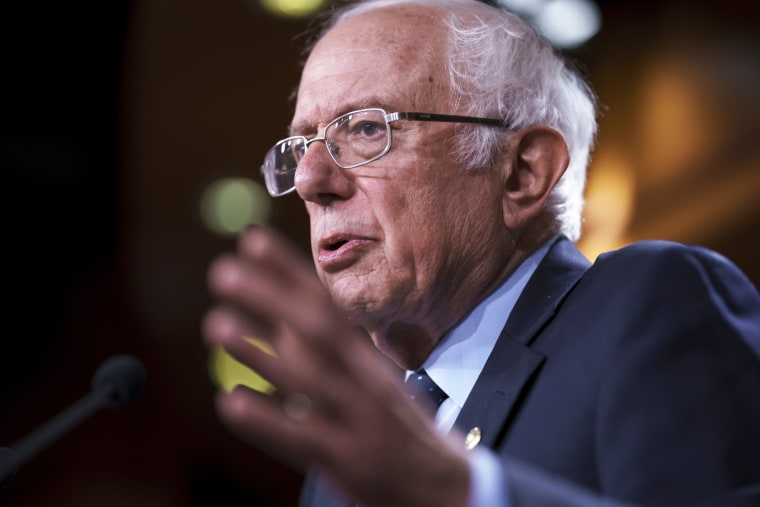
He's only backed one candidate for Senate — Vermont Democratic Rep. Peter Welch, who is running for his home state's open Senate seat. Sanders has also backed two House candidates taking on Democratic incumbents in primaries: attorney Jessica Cisneros, who faces Rep. Henry Cuellar, D-Texas, in a May 24 primary runoff next month, and Nina Turner, his presidential campaign co-chair who is taking on Ohio Rep. Shontel Brown in a May 3 primary.
Three Democrats running in solidly Democratic open House seats have also earned Sanders' endorsement. Former Austin City Councilman Greg Casar won the Democratic primary in Texas' 35th District in March, while state Rep. Jasmine Crockett is competing in a primary runoff on Texas' 30th District. Sanders has also endorsed state Rep. Summer Lee, who is running in the open 12th District race in Pittsburgh. Lee's primary is set for May 17.
Democrat Lee Merritt of Texas had Sanders’ backing in his failed bid for Texas attorney general. Sanders has also endorsed Los Angeles City Councilmember Gilbert Cedillo.
Of these candidates, Cisneros has taken the most heat for her progressive policies. Shakir did provide some advice for candidates like Cisneros, encouraging them to embrace Sanders' endorsement.
"Sen. Sanders is putting forward an extremely popular vision for the Democratic Party that will win back critical support that we have lost," he wrote.
Shakir also noted at the end of the memo that Sanders "is interested in endorsing more candidates."
Jonathan Allen contributed to this report.
Watch: Over 90 percent say Marijuana should be legal for medical or recreational use
On 4/20/2022, just 12 states fully prohibit marijuana use, with 91 percent of Americans support legalizing marijuana for either medical or recreational use, according to a Pew poll. Watch the full breakdown below:
Even small bipartisan efforts becomes baggage in GOP primary races
Even Republican incumbents who seemingly made all the right moves to avoid an intra-party challenge in the 2022 midterm elections are finding that any hint of working across the political aisle can be fodder for attacks on their party purity.
Take, for example, Sen. John Boozman, R-Ark., who recently became the subject of an attack ad from a super PAC called the Arkansas Patriot Fund — an ad which singled out Boozman's votes to confirm eight of President Joe Biden’s cabinet nominees early in his presidential term.
Historically, bipartisan votes for presidential nominees have not been a flash point for primary contests unless a nominee is particularly controversial. And Boozman is one of the most conservative members of the Senate, only voting with Biden’s agenda 34.1 percent of the time, according to FiveThirtyEight. Only 16 senators vote with Biden less often, according to the analysis.
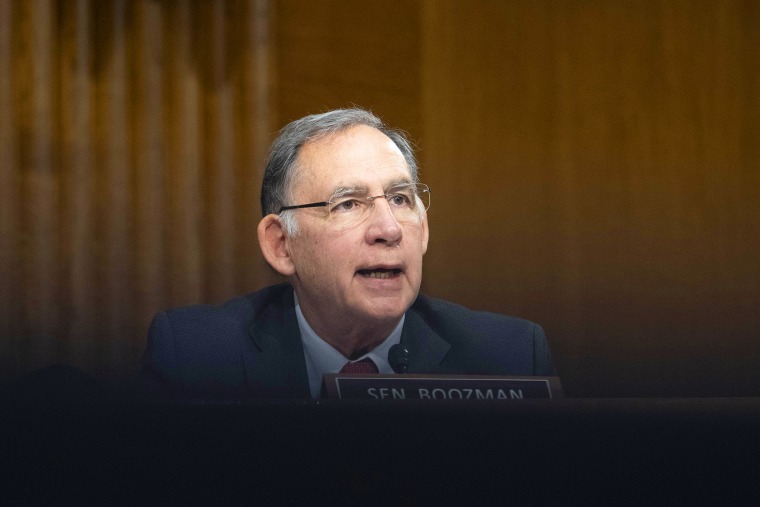
President Donald Trump has even endorsed Boozman, a move that’s usually considered a conservative seal of approval. But that hasn't stopped the Arkansas Patriots Fund from calling the senator “Biden's favorite Republican.”
Arkansas Patriots Fund is a PAC that supports Boozman's primary challenger, veteran Jake Bequette. It's funded by Republican mega-donor Richard Uihlein, the founder of shipping and packing supply company Uline. He's a donor to other conservative groups, including Club for Growth Action.
The GOP infighting over working with the other party has also popped up in Nevada, where one Republican primary candidate for governor, John Lee, is attacking another, Joe Lombardo, in a TV ad for being Nevada Democratic Gov. “Steve Sisolak's favorite Republican.”
The narrator in the ad accuses Lombardo for being too liberal because he served on Sisolak’s transition team when he became governor.
Lombardo and Sisolak are distant now, but originally became friends in the aftermath of the 2017 mass shooting at a music festival in Las Vegas. At the time, Lombardo was the Clark County sheriff and Sisolak was head of the Clark County Commission.
The attacks reflect the more ideologically conservative primary electorate, said Dr. Lawrence Jacobs, the Director of the Center for the Study of Politics & Governance at the University of Minnesota and author of the book “Democracy under Fire: Donald Trump and the Breaking of American History.”
“It's a very small number of people who are involved in the primaries, and they are exercising enormous influence,” Jacobs said.
Jacobs added that primary voters "tend to be much more ideologically extreme, whereas most Americans tend to be a bit more moderate and they're willing to look at compromise."
Nationally, a 2021 Morning Consult poll found that 71 percent of Democrats and 70 percent of Republicans agreed with the statement, “the policies with bipartisan support are the best policies.”
The same poll found that 78 percent of Democrats and 76 percent of Republicans agreed with the statement, “I respect politicians more when they make efforts to get bipartisan support.”
Midterm roundup: Granite State Grind
President Joe Biden traveled to New Hampshire Tuesday, where he was joined by two Democrats facing tough re-election fights: Sen. Maggie Hassan and Rep. Chris Pappas. Both lawmakers also got shoutouts from the president for their work on the bipartisan infrastructure package, per NBC News’ Mike Memoli.
Their appearances at Biden’s event shows that some vulnerable Democrats may not be skittish about appearing with Biden, even as his approval ratings hit new lows — and especially when they can tout new infrastructure spending.
Elsewhere on the campaign trail:
California Senate: A tech executive is defending his quixotic Senate bid amid allegations it’s a personal vendetta (Dan O’Dowd’s first ad dropped this week, which attacks Tesla over its self-driving cars).
Georgia Senate: In Sen. Raphael Warnock’s new ad, the Democrat tells viewers that he knew he couldn’t “fix Washington” in just one year because he’s not a magician, but touts the work he has done since taking office.
North Carolina Senate: The Club for Growth, which is backing Rep. Ted Budd, is running a new spot where Lt. Gov. Mark Robinson criticizes Budd’s Senate GOP primary rival, former Gov. Pat McCrory, calling him “a nice guy, but he’s no conservative.”
Pennsylvania Senate: Lt. Gov. John Fetterman has a new TV ad up in the Democratic primary responding to attack ads from a super PAC backing Rep. Conor Lamb. In the GOP primary, former Secretary of State Mike Pompeo is headlining a campaign rally for former hedge fund manager David McCormick.
Vermont Senate: Democratic Rep. Peter Welch is up with his first TV spot of his Senate campaign, touting his work as the state’s at-large congressman. Welch’s campaign reserved $69,000 worth of airtime, per AdImpact.
Florida Governor: Republican Gov. Ron DeSantis has asked lawmakers to rescind a special carve-out for Disney that shields it from certain regulations and taxes amid conservatives’ anger at the company. Meanwhile, Democratic Agriculture Commissioner and gubernatorial hopeful Nikki Freid is suing the federal government over a statute that bans marijuana users from owning firearms or getting concealed-carry permits.
Michigan 11: The Democratic primary between Reps. Haley Stevens and Andy Levin has become a proxy war for the party’s ideological divides, particularly on Israel, NBC News’ Jonathan Allen reports from the 11th District.
Maryland Governor: The family of the incarcerated man that Maryland Democrat Wes Moore partially based his best-selling book off is accusing the Democrat of exploiting their relative’s life story.
Nebraska Governor: Republican Charles Herbster, who was accused of groping by eight women, will speak at Trump’s April 29 rally in Nebraska.
Tennessee 05: The Tennessee GOP kicked former State Department spokeswoman Morgan Ortagus and two other candidates off the primary ballot for failing to vote in three recent GOP primaries and actively participating in the state or local parties. Ortagus, who has Trump’s endorsement in the 5th District race, said her team “is evaluating the options before us,” NBC News’ Allan Smith reports.
Why is Bidenism failing? The NBC News poll offers an answer
Washington Post columnist Perry Bacon Jr. asked a provocative question: Why is Bidenism failing?
Noting President Biden's low poll numbers after more than a year into office — despite pursuing relatively popular policies and trying to be a more unifying president than Donald Trump was — Bacon pointed to centrist complaints that Biden has swung too far left, progressive criticism that he hasn't been progressive enough, and a structural explanation that growing polarization makes it nearly impossible for any president to be popular.
But our NBC News poll offers another answer: It's the leadership. Or at least the perceptions of Biden's leadership.
Biden's approval rating started off relatively strong despite the political polarization — 53 percent approve, 39 percent disapprove in April 2021 — and so did perceptions of his leadership
But by the end of the year — after the chaotic Afghanistan withdrawal, the Delta and Omicron surges, the end of "Build Back Better" negotiations, and growing signs of inflation — Biden's presidential qualities tumbled, even though the unemployment was falling below 4.0 percent and hundreds of thousands of jobs were being created each month.
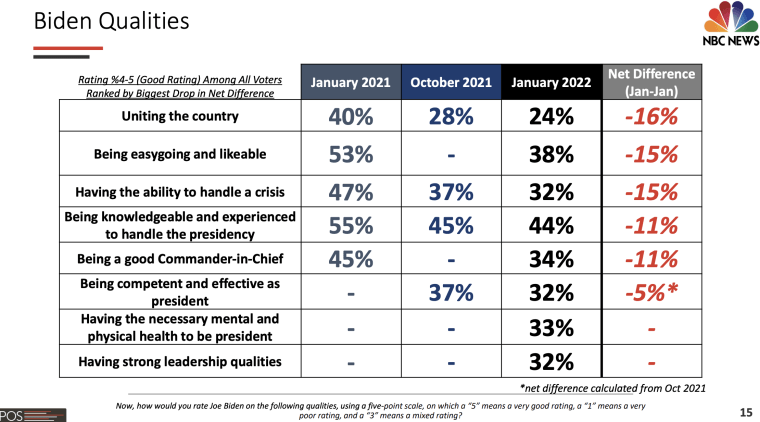
Compared with past presidents on these qualities, Biden's numbers on "being easygoing and likeable" were worse than George W. Bush's and Barack Obama's, though far better than Donald Trump's.
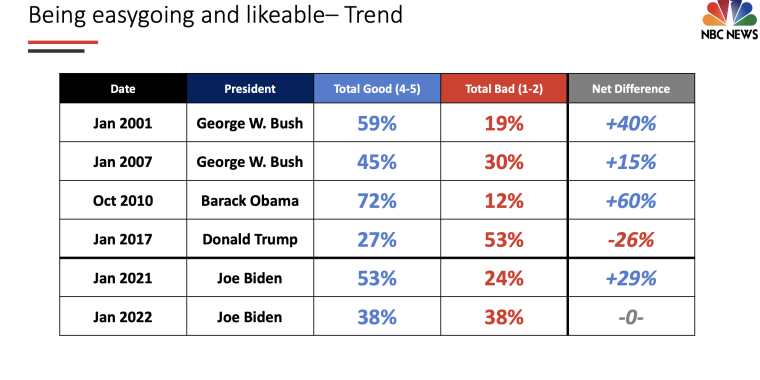
But on a perceived Biden strength -- "uniting the country" -- Biden's net rating was lower than Trump's.
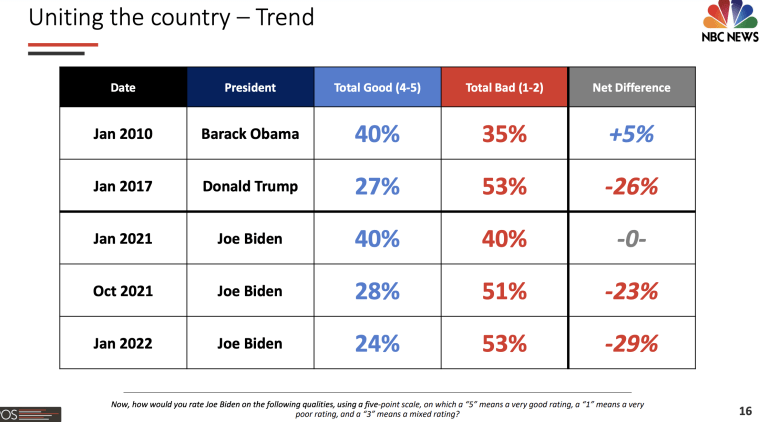
And Biden has tied Trump on "being a good commander-in-chief,” while significantly trailing Obama, Bush 43 and Bill Clinton on the same question.
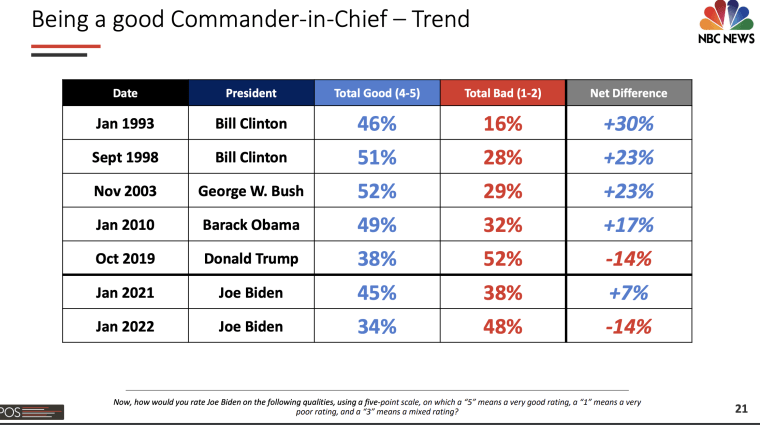
The thing about poll numbers is that they can change. Just ask Obama. Or even Trump (who did see his approval rating increase during the course of his presidency).
But to answer why Bidenism is failing — right now — those perceptions above help tell part of the story about Biden's presidency.
Latest fundraising wave shows handful of struggling incumbents in competitive districts
We've already told you about some of the biggest fundraisers of the quarter, but there's a flip-side of the latest round of Federal Election Commission reports — a handful of incumbents who got beat out by their challengers.
Two House members, one from each party, who are running Cook "toss up" races were outraised by challengers of the opposite party in the first fundraising quarter — Michigan Democratic Rep. Dan Kildee and Ohio Republican Rep. Steve Chabot.
Republican self-funder Paul Junge, who raised nearly $1.3 million (including a $1.1 million contribution from Junge himself), outraised Kildee and his $869,000. But Kildee did have more cash on hand, with $2.4 million in the bank to Junge’s $1.2 million.
And while Chabot raised raised $197,000 and had $582,000 banked away at the end of the quarter, the top Democrat in his race, Greg Landsman, raised $533,000 and had $419,000 in the bank.
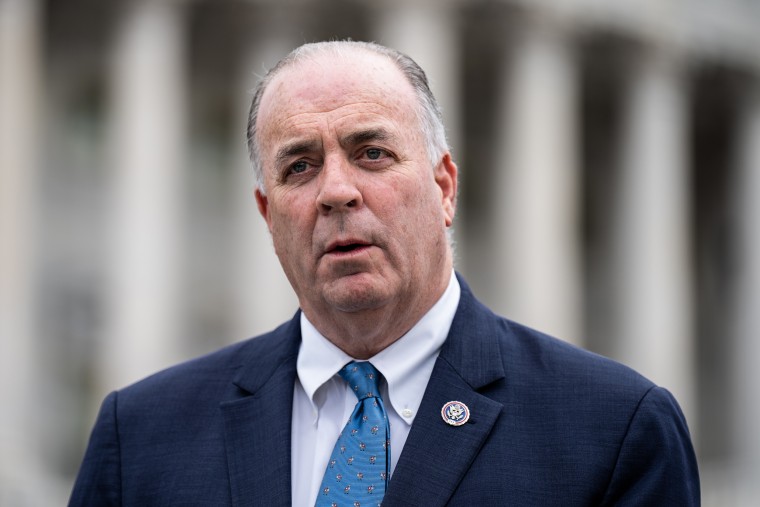
In other competitive, but not "toss up" races:
Iowa Republican Rep. Marianette Miller-Meeks (who raised $440,000) was outraised by Democrat Christina Bohannan (who raised $514,000) in her "likely Republican" race.
Former Democratic Rep. Max Rose outraised New York GOP Rep. Nicole Malliotakis ($706,000) in the "lean Democratic" seat.
Indiana Democratic Rep. Frank Mrvan ($178,000) was outraised by Republican Blair Milo ($208,000) in his "likely Democratic" seat.
California Republican Young Kim, who had a strong $1 million quarter, was outraised by Democrat Asif Mahmood, who raised $1.4 million.
And Arizona Democratic Rep. Tom O'Halleran ($579,000) was outraised by Republican Eli Crane ($650,000).
A handful of incumbents in competitive seats were also outraised by their primary challengers as well.
The most stark example was Texas Democratic Rep. Henry Cuellar, who was massively outraised by his primary runoff opponent, Jessica Cisneros. Cisneros raised $1.7 million, spending $1.1 million and closing the quarter with more than $1 million. Cuellar raised $753,000, spent $586,000 and had $1.4 million on hand.
GOP Rep. Dave Schweikert, who has long been dogged by ethics issues, was also outraised by a primary challenger, Elijah Norton, because of his challenger’s loans to his campaign. Norton loaned his campaign $900,000, totaling almost $1.1 million in receipts for the quarter, while Schweikert, who loaned his campaign $200,000, ended with $380,000 raised for the quarter.
Other incumbents in safe seats were outraised by their primary challengers too, including Illinois Democratic Rep. Danny Davis, Georgia Republican Rep. Marjorie Taylor Green, Colorado Republican Rep. Lauren Boebert, Minnesota Democratic Rep. Ilhan Omar, and New York Democratic Reps. Carolyn Maloney and Jamaal Bowman.
Pennsylvania, Ohio top Senate candidate spending
Almost half of Senate candidate spending in competitive races during the first three months of the year was concentrated in two states: Pennsylvania and Ohio.
Senate candidates in the nine races the Cook Political Report rates as competitive spent a combined $111 million, according to fundraising reports filed Friday. Pennsylvania saw the most spending, with $25.7 million, with Ohio a close second with $24.7 million in spending.
Both contests have competitive Republican primaries in May with wealthy candidates spending millions of their own money, while Pennsylvania is also hosting a contested Democratic primary.
Former hedge fund manager David McCormick spent nearly $9.6 million from January through March, surpassing the rest of the GOP field ahead of Pennsylvania’s May 17 primary. McCormick was followed by celebrity doctor Mehmet Oz, who spent 6 million. Lt. Gov John Fetterman led the Democratic field, spending nearly $4.3 million.
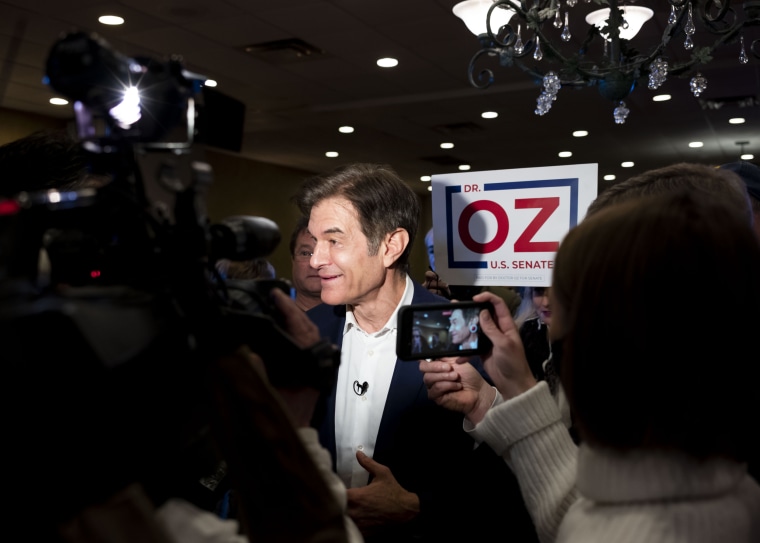
Ahead of Ohio’s May 3 GOP primary, investment banker Mike Gibbons has spent nearly $8.4 million, followed by state Sen. Matt Dolan, who has spent $6 million. Both have been self-funding their campaigns.
Although Pennsylvania and Ohio saw the most combined spending from candidates, the candidate in a competitive race who spent the most campaign cash in the first quarter was Sen. Raphael Warnock. The Georgia Democrat spent $10.8 million from January through March as he runs for a full term in November.
Warnock accounted for much of the $15.5 million that candidates spent in the Georgia race. In Arizona, candidates spent a combined $12.8 million, while contenders spent $12 million in Wisconsin. Florida GOP Sen. Marco Rubio and Democratic Rep. Val Demings spent $8.2 million in Florida, while Senate candidates in Nevada spent a combined $6.1 million.
Senate races in North Carolina and Nevada saw the lowest amounts of candidates spending, with $4 million and $2.3 million spent in those races respectively.
Pro-impeachment Republicans outraise Trump challengers
All six of the Republicans who voted to impeach former President Donald Trump after the Jan. 6 attack on the Capitol outraised their Trump-backed primary challengers in the first there months of 2022, new fundraising reports show.
On average, a House incumbent facing a Trump-backed challenger raised nearly twice as much as the primary challenger and ended the quarter with more than three times as much cash on hand
One of the most high-profile Trump critics, Wyoming Rep. Liz Cheney, outraised her primary opponent, Harriet Hageman, $2.9 million to $1.3 million. Cheney also ended the first fundraising quarter on March 31 with significantly more campaign cash. Cheney had $6.8 million in her campaign account, while Hageman’s campaign had nearly $1.1 million.
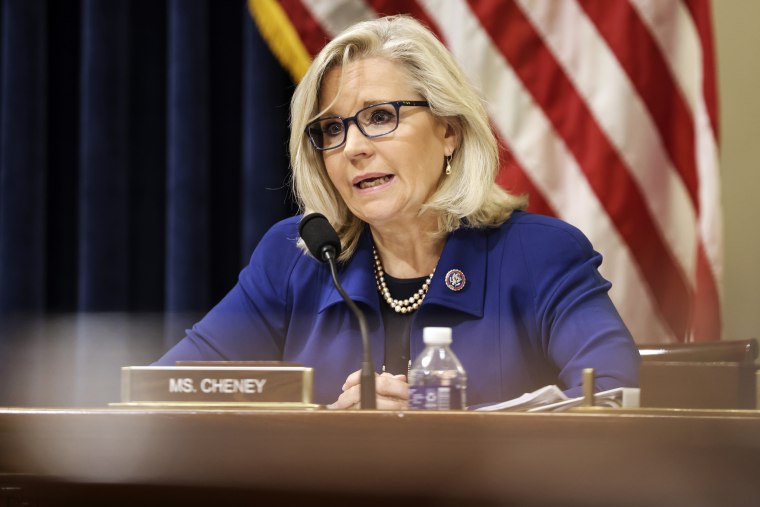
Alaska GOP Sen. Lisa Murkowski is the only Republican senator up for re-election this year who voted to convict Trump of inciting an insurrection. She maintained a financial advantage in her race, where she faces Trump-endorsed Kelly Tshibaka. Murkowski raised nearly $1.6 million in the first quarter and hand $5.3 million on hand, while Tshibaka raised $673,000 and ended the quarter with $968,999 on hand.
Three other House Republicans who did not vote to impeach Trump, but who face Trump-endorsed challengers – Illinois Rep. Rodney Davis, South Carolina Rep. Nancy Mace, and West Virginia Rep. David McKinley – also raised more than their primary opponents during the first fundraising quarter, according to reports filed Friday with the Federal Election Commission.
McKinley’s primary presents the first test of the power of Trump’s endorsement against a sitting House member. He faces fellow GOP Rep. Alex Mooney on May 10, after the pair of lawmakers were drawn into the same district after redistricting.
McKinley narrowly outraised Mooney with a $482,000 haul to Mooney’s $465,000. But Mooney had more cash on hand, with $1.4 million in his campaign account to McKinley’s $1 million.
Former Obama campaign manager backs Arizona Democrat for governor
Former Obama campaign manager Jim Messina announced Monday that he is backing, and will informally advise, Marco Lopez, a Democratic candidate for governor of Arizona — a move which could give the underdog candidate some footing to gain ground on his primary opponent, Arizona Secretary of State Katie Hobbs.
“If we want Arizona to go blue in November, we need someone like Marco on the ticket who can excite Latinos and the diverse coalition that helped President Biden win Arizona in 2020,” Messina said in a press release from Lopez’s campaign.
Lopez, the former mayor of Nogales, Arizona, served as the chief of staff to the United States Customs and Border Protection under the Obama Administration. But with four months until the Democrats’ August primary, Lopez must catch Hobbs.
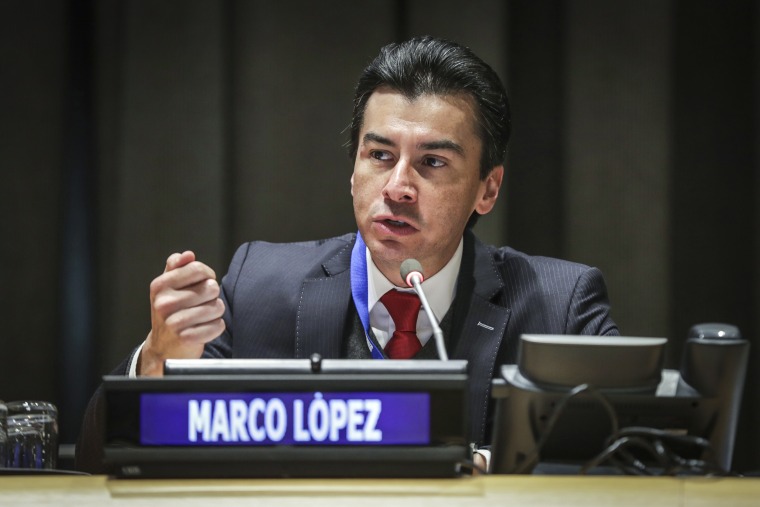
“We know there’s a large degree of undecided voters throughout the state of Arizona, and we encounter them,” Lopez said, adding about Hobbs: “They’re waiting for us to come in off the sidelines and make our case known.”
The Hobbs campaign did not respond to a request to comment on the record about the endorsement.
There is scant public polling in the primary, but the last credible poll released in early January in Arizona showed Hobbs, who also has maintained a fundraising advantage, with a sizable lead over Lopez and state Rep. Aaron Lieberman . But Hobbs has faced scrutiny in recent months, including losing a lawsuit over the treatment of a Black legislative aide and the subsequent firing of that aide in 2015.
“Steady as you go, stay focused and stay on message,” Lopez said, referring to Messina’s advice to him as he harkened back to Obama’s early rise as a largely-unknown candidate.
This fall, Democrats are facing an exceedingly-tough race to replace Republican Gov. Doug Ducey. Former local news anchor Kari Lake, who is backed by Trump, continues to sit atop the GOP polls, but she is facing a stiff challenge from another well-financed Republican, Karrin Taylor Robson.
Midterm roundup: Trump bets on JD Vance in Ohio Senate
A Good Friday announcement may not necessarily be the best way to maximize exposure, but former President Donald Trump’s decision to endorse author J.D. Vance in Ohio's Senate race late Friday afternoon shook up another crowded GOP primary.
The news came one day after NBC reported Trump had decided to endorse but had been facing pressure from others to hold off.
Just weeks from the May 3 primary, Vance now has a major selling point for GOP voters who may be on the fence. But his opponents aren’t backing down, and some are still emphasizing Vance’s past critiques of Trump and Trump supporters.
The big picture: After a slew of safe endorsements, Trump is stepping out onto the ledge with endorsements in crowded primaries, with several coming up in May. Wins in races like Ohio, Pennsylvania, Georgia and North Carolina would help Trump keep hold on the power he has among Republicans, but the former president is taking risks that could hurt how he’s perceived if his candidates lose.
Elsewhere on the campaign trail:
North Carolina Senate: WRAL reports on how GOP Rep. Ted Budd, who’s running with Trump’s blessing, continues to avoid debating his top primary rival, former Gov. Pat McCrory.
Iowa Senate: Democratic Senate hopeful Abby Finkenauer will remain on the ballot, thanks to a state Supreme Court ruling regarding her nominating petition signatures.
Oklahoma Senate: Former EPA head Scott Pruitt, who resigned amid multiple ethics scandals, is running for Senate.
Florida Governor: Speaker Nancy Pelosi endorsed Democratic Rep. Charlie Crist for governor in Florida, Politico reported. Crist faces Agriculture Commissioner Nikki Fried and state Sen. Annette Taddeo in the Democratic primary to take on GOP Gov. Ron DeSantis.
Georgia Governor: A federal judge ruled against Democratic gubernatorial hopeful Stacey Abrams’ challenge to the state’s campaign finance laws.
Ohio 11: Democratic Majority for Israel PAC is up with a new spot touting Democratic Rep. Shontel Brown’s first few months in Congress weeks ahead of her primary rematch against Democrat Nina Turner. DMFI was a big Brown ally during Brown’s special election victory over Turner last year.
Midterm roundup: Campaign cash
The Federal Elections Commission fundraising reports for the first quarter of 2022 are due by midnight Friday and the political world will get a new look at which House and Senate contenders have financial advantages heading into another expensive midterm election cycle.
Some candidates have stepped up their fundraising, including Sen. Ron Johnson, R-Wisc. He raised $7.1 million in the first quarter, according to Fox News, ten times the $711,000 he raised in the final quarter of 2021.
Senate Democrats have also announced eye-popping hauls ahead of the filing deadline. On Thursday Sen. Raphael Warnock, D-Ga., announced he raised a whopping $13.6 million in the first fundraising quarter, ending the quarter with $25.6 million on hand for his re-election. His chief GOP opponent, former football player Herschel Walker, announced Friday morning that he raised $5.5 million, but he did not release a cash on hand number.
Ohio Senate: Former President Donald Trump is expected to endorse author JD Vance in Ohio’s Republican primary for Senate. The May 3 primary is just a few weeks away, but NBC News’ Marc Caputo and Vaughn Hillyard report that other leading candidates in the race, including former GOP Chair Jane Timken and former state treasurer Josh Mandel, are less than thrilled about Trump’s decision and are actively working to dissuade him from endorsing Vance.
Pennsylvania Senate: Democratic Lt. Gov. John Fetterman slammed an ad from an outside group that called Fetterman a “democratic socialist” as “demonstrably a lie,” in an interview with NBC10 in Philadelphia. Fetterman described himself as “a good, solid Democrat.” Rep. Conor Lamb was also asked about the ad, which came from a group backing Lamb in the Senate primary, and said, “The Republicans will call any of us a socialist that gets the nomination. What we have to discuss as Democrats is who does that lael stick to and who it doesn’t.”
Nebraska Governor: Several women, including a state senator, have accused GOP gubernatorial candidate Charles Herbster of groping them. Herbster, who has been endorsed by Trump, denied the allegations, calling them “a ridiculous, unfounded dirty political trick.”
South Carolina 01: GOP Rep. Nancy Mace launched her first TV ad of her primary, where she faces a Trump-backed challenger, Katie Arrington. Her opening spot focuses on border security and immigration, featuring Mace at the southern border saying, “Finish the wall and secure the border, once and for all.” Mace’s campaign spent $78,000 on broadcast and radio, per AdImpact.
Texas Rep. Henry Cuellar launches first ad of primary runoff race
Rep. Henry Cuellar, D-Texas, is out with the first ad of his runoff election against progressive challenger Jessica Cisneros.
Cuellar's campaign is re-airing an ad that originally ran in mid February, a few weeks before Texas’ March 1 primary. In it, he attacks Cisneros over her plans to become less dependent on law enforcement officials on the border, alleging, “she'd split Border Patrol in half, leaving us with open borders that would make us less safe and cost us thousands of jobs.”
Cisneros is an attorney and is running as a progressive alternative to Cuellar, who is one of the more moderate Democrats in the House. The two faced off in 2020, where Cuellar narrowly beat Cisneros in a primary.
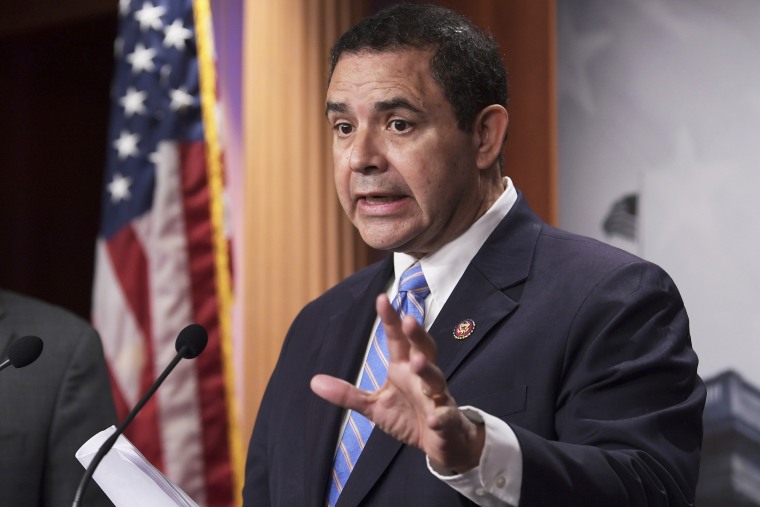
In the rematch this year, the presence of a third candidate prevented either Cuellar or Cisneros from getting over 50 percent of the primary vote, which was needed to avoid a runoff.
So far, both candidates have spent over one million dollars on ads, according to AdImpact, but that number is expected to rise as they get closer to the May 24 runoff.
A new issue that could impact voters in the runoff is the Biden administration’s plan to lift Title 42, a pandemic-era immigration policy that prevents migrants from entering the U.S. when seeking asylum. Title 42 is supposed to be lifted on May 23, the day before the runoff.
It will once again allow for migrants to present at the U.S.-Mexico border, claim asylum and be allowed into the U.S. pending an asylum hearing in front of a judge. During the pandemic, migrants were forced to wait in Mexico while waiting for their asylum case to be adjudicated, rather than enter the U.S.
Cuellar is one of a handful of House Democrats to already come out against the White House’s plan, telling Chuck Todd on MTP Daily yesterday, “why are we letting 100 people in – 100 percent of them, when we should only be saying ‘Bienvenidos’ to only 10 or 12 percent.”
“The system has to be at the border, it has to be more efficient. The way the administration, with all due respect, and we’ve given them very constructive ideas – is not the right way of handling the border situation,” Cuellar added.
Cisneros has previously advocated for the Biden administration to lift Title 42.
Watch: No matter how you slice it, most Americans oppose removal of Trump's Title 42
NBC News' Steve Kornacki joined Meet the Press Daily Thursday to break down the latest polling data showing that, no matter how you slice it, most Americans oppose the removal of President Donald Trump's Title 42 border rule. Watch the conversation below:
New ad highlights Stacey Abrams’ business experience in Georgia
In a new ad out Thursday, Georgia Democratic gubernatorial candidate Stacey Abrams touts her business experience in a playful ad with her former business partner.
The ad begins with Abrams and Lara Hodgson, both co-founders of the invoice payment solutions company NowAccount, listing opposites about each other.
“Lara talks to anyone,” Abrams says.
“Stacey listens to everyone,” Hodgson says.
“Lara’s an independent,” Abrams quips.
“Stacey is a Democrat,” Hodgson responds.
“Lara’s more Star Wars,” Abrams says.
“Stacey's Star Trek,” Hodgson answers.
Eventually, the two discuss how they grew their company and how that experience would serve Abrams as governor.
“We built a company together to finance other small businesses,” Abrams says near the end of the ad. “That's how we're going to grow Georgia's economy,” she adds.
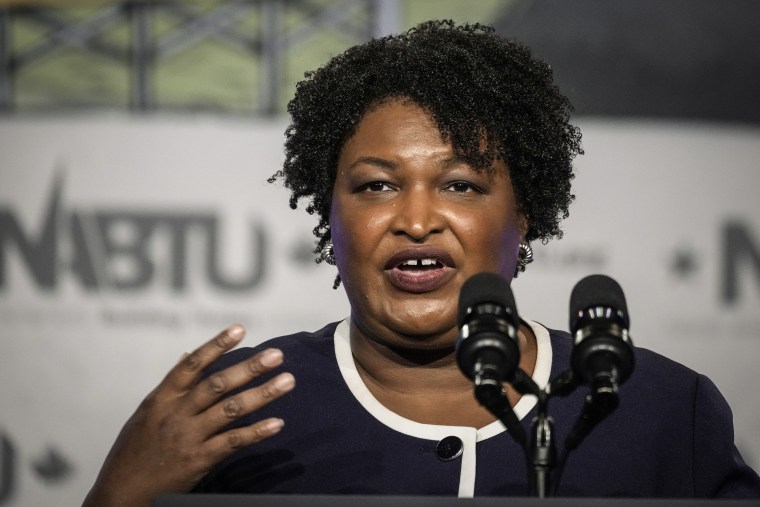
This is a new commercial in a long string of recent ads from Abrams as Georgia voters approach their primary elections in May. Though Abrams is running unopposed and is the de facto party nominee, she’s gearing up for a tough general election battle with the eventual Republican nominee.
Plus, Abrams has a lot of money to spend while she waits for Gov. Brian Kemp and his opponent, former Georgia Sen. David Perdue, to duke it out in the Republican primary.
Abrams hasn’t yet reported how much she raised in the first three months of 2022, but at the end of January her campaign had already raised $9.2 million since the beginning of December, when she announced she would run for governor.
Abrams has already spent over $4.4 million on ads, more than any other candidate running for governor, including Kemp, who has spent $1.5 million, and Perdue, who has spent $920,000.
This is the first ad to tout Abrams' business experience with an old partner. Her other commercials have focused on how she helped Georgia families after the last election and her community organizing during the pandemic.
Rapahel Warnock raises $13.6 million in first fundraising quarter
Sen. Raphael Warnock, D-Ga., raised a whopping $13.6 million in the first three months of the year as he gears up for a competitive re-election race, his campaign announced Thursday.
Warnock ended the first fundraising quarter on March 31 with $25.6 million in his campaign account. His campaign claimed Warnock’s haul broke the record for the most money a Senate candidate has raised in the first quarter of an election year.
“From fighting to cap the cost of insulin and lower prices at the gas pump to pushing for student loan debt relief, Reverend Warnock's commitment to serving the people of Georgia continues to drive the biggest grassroots fundraising effort in any Senate race this cycle,” Warnock campaign manager Quentin Fulks said in a statement.
Warnock’s chief GOP opponent, former football star Herschel Walker, has not yet announced his first quarter fundraising numbers. But he has also proven to be a strong fundraiser, pulling in $5.3 million in the last three months of 2021. Fundraising reports are due to the Federal Election Commission on Friday.
Although Warnock starts the race with a financial advantage, the Georgia race is still expected to be close. President Joe Biden won the state by less than half a percentage point in 2020, becoming the first Democratic presidential nominee to win Georgia since 1992. And Warnock won a special election runoff by 2 points. He’s now running for a full term.
The Cook Political Report rates the Georgia Senate race a Toss Up.
Climate group launches $3M ad buy in 5 swing states
A climate change advocacy group composed of scientists who are mothers is launching a $3 million ad campaign targeting voters in five key swing states on how they can personally take action on the issue.
The campaign – paid for by Science Moms, a nonpartisan climate group – will air in Arizona, Wisconsin, Georgia, North Carolina and Pennsylvania, and encourages viewers to reach out to their elected officials to urge them to “stop big polluters.”
The ads are designed to enable viewers who are frustrated with government inaction on climate change with a to-do list to take action on the issue themselves, the group’s leaders told NBC News.
“We’re speaking up and asking our leaders how they plan to stop big polluters because it’s time for our representatives to represent our interests, like you know, our kids having a future,” says Dr. Joellen Russell, a climate scientist at the University of Arizona and a founder of Science Moms, in one of the group’s ads.
The ads, shared first with NBC News, also urge viewers to swap out carbon burning cars and appliances for better, environment-friendly alternatives, and to share information about climate change with friends and family in-person and on social media. The ads will run across digital platforms and steaming services.
Science Moms launched in 2021 as a $10 million educational campaign of Potential Energy – a nonprofit, nonpartisan coalition aiming to tackle climate change by targeting mothers.
The group has said it will be the largest climate change educational campaign since former vice president Al Gore’s $100 million effort around the issue in 2007.
Ahead of Tax Day, DNC launches ad campaign spotlighting one GOP tax proposal
The Democratic National Committee launched a new digital ad campaign Wednesday, targeting voters in swing states ahead of Tax Day.
The ads, which will run in North Carolina, Georgia, Florida, Wisconsin, New Hampshire, Pennsylvania, Arizona and Nevada, will put a spotlight on a tax plan released earlier this year by Sen. Rick Scott, R-Fla., which could result in raising taxes for over half of Americans.
The ads will appear in Google Search results when people in those states search for tax services.
One ad says, “This Tax Day, don’t forget: Republicans want to raise YOUR taxes. Can you afford it? Millions of Americans could see a bigger tax bill if Republicans win control in DC.”
Scott, who is the chairman of the National Republican Senatorial Committee, Senate Republicans’ campaign arm, said he released the plan by himself, independent of his leadership role within the party. Still, in this ad campaign, the DNC is tagging Republicans in general with having a plan to raise taxes on voters.

The ad buy is part of a larger strategy heading into the fall midterm elections to highlight what Republicans could do if they took control of the House and Senate in November, a DNC aide told NBC News.
This isn’t the first digital ad campaign the committee has funded attacking Scott’s “plan to rescue America.”
In February, the DNC targeted The Villages retirement community in Florida with digital ads highlighting Scott’s proposal. In March, they took over the homepage of the Louisville Courier Journal with ads telling viewers that Senate Majority Leader Mitch McConnell, R-Ky., planned to raise taxes and make health insurance more expensive.
McConnell and other Republicans have disavowed Scott’s proposal, with McConnell telling reporters, “We will not have as part of our agenda a bill that raises taxes on half the American people.”
Klain: A challenge to get domestic message out while Ukraine 'dominates' public's attention
White House Chief of Staff Ron Klain says the administration is facing challenges in getting their message out on the economy and other domestic issues at a time when the public’s focus is largely consumed by Russia's invasion of Ukraine and the continuing war.
“Obviously, what dominates the news, understandably, is the war in Ukraine," Klain told NBC News in an interview with the Chuck Toddcast. "And I don't know how successful we were in getting all these domestic things … out to the American people to hear, given what's going on in Ukraine,” he said.
But Klain promised a “robust” domestic agenda for the administration between now and the November midterm elections.
“I think we have a robust agenda between now and November, that does include the reconciliation bill, but not only the reconciliation, but we need to get Covid Relief done,” Klain said.
Listen to the full Chuck ToddCast:
He also listed a litany of other priority items for Biden and his team, including a bipartisan innovation bill focused on creating jobs in various tech sectors, funding for access to mental health care, supporting cancer research and allocating more military aid to Ukraine.
“Congress has been very generous so far. But if it goes on, we're going to need more help, because these weapons are not free,” Klain told Todd.
Klain did, however, acknowledge the short time scale with which the administration has to work with before November’s elections.
“The point is that 2023 is next year, he said. “We need to deliver results for the American people this year. And this year really means you know, five remaining months, one of which is August, when very little gets done. And so we really have to move the key pieces of legislation left to be moved through the House and Senate with tempo.”
Cheri Beasley launches first TV ad of North Carolina Senate race
Democrat Cheri Beasley is launching her first TV ad of the North Carolina Senate race, highlighting her legal career as she focuses on the general election.
“This is the road I used to take to the Fayetteville courthouse,” Beasley says as she drives a white S.U.V. in the ad, shared first with NBC News.
“As a public defender, I represented North Carolinians who couldn’t afford a lawyer – because everyone has a right to representation, no matter who you are or where you’re from. As a judge and Chief Justice of the North Carolina Supreme Court, I led with a commitment to justice and integrity,” adds Beasley, the first Black woman to lead that state’s high court.
“It’s the same approach I’ll take to the Senate, because Washington isn’t listening, and I’ll be a voice for all of North Carolina,” she says.
The ad is part of a six-figure buy on statewide broadcast networks. Her spot is also a sign that Beasley is focused on introducing herself to general election voters as Republicans battle it out ahead of the May 17 primary.
GOP Rep. Ted Budd, who has former President Donald Trump’s endorsement, and former Gov. McCrory are locked in a competitive primary, which also features former Rep. Mark Walker. If no candidate wins more than 30 percent of the vote, the primary will head to a July runoff.
Beasley cleared the field on the Democratic side after posting strong fundraising numbers and racking up local endorsements. She raised more than $3.6 million in the first fundraising quarter of the year, her campaign announced last week.
North Carolina has featured close, and expensive, races, but Republicans have found success in the Tar Heel State in recent election cycles. Trump won the state by 1 percentage point in 2020 as GOP Sen. Thom Tillis won re-election by 2 points, defeating Democrat Cal Cunningham, whose campaign was upended by allegations of an extramarital affair.
The Cook Political Report rates the North Carolina Senate race as Lean Republican.
Oklahoma Gov. Stitt fights back against 'soft on crime' dark money allegations
Oklahoma Republican Gov. Kevin Stitt is fighting back after coming under fire from a trio of political advocacy groups pouring money into ads attacking him for being "soft on crime," among other criticisms.
Three groups — Conservative Voice of America, Sooner State Leadership Fund, and The Oklahoma Project — have spent over $3.5 million so far this year to run commercials against the incumbent governor, according to AdImpact, an ad tracking firm.
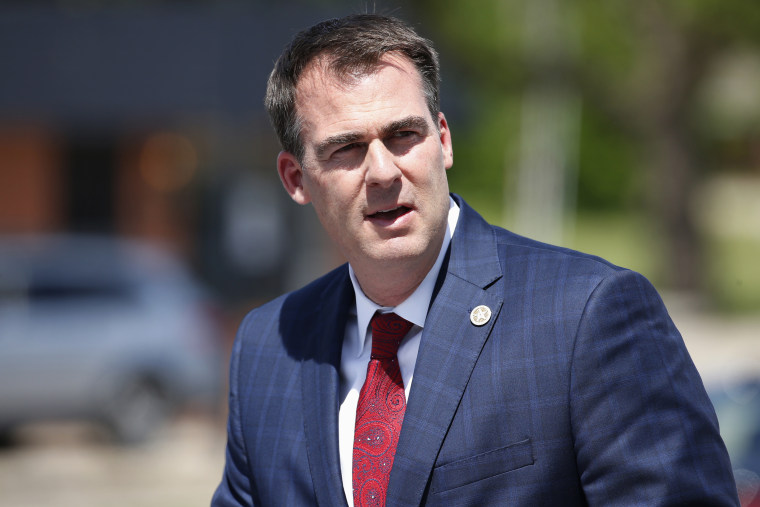
Two of the groups, Conservative Voice of America and Sooner State Leadership Fund, have hammered Stitt for his mass commutation of low level drug offenders in 2019 and have aired some particularly gruesome ads on the air, holding Stitt responsible for the release of one man who allegedly went on to kill three people after he was released.
Stitt finally addressed the attacks directly in his own commercial this week, accusing Conservative Voice of America of using an actor in their ads attacking him, rather than a real Oklahoma voter.
He’s also released three other ads since the beginning of March promoting himself, touting his success at building a budget surplus and cutting taxes while in office. So far, though, his ad spending has been no match for these "dark money" groups. Stitt has only spent $489,000 on ads in the race, according to AdImpact.
Conservative Voice of America and Sooner State Leadership Fund are organized as 501c4 social welfare organizations, which allows them to operate without disclosing their donors. That designation also allows such groups to only advocate for issues but not promote one candidate over another.
Sooner State Leadership’s website lists former state Rep. Trebor Worthen as its founder. Worthen would not answer questions about its donors, but in emailed statements to NBC News, Worthen said, “We are funded by business and community leaders who care deeply about our future and wish to exercise their First Amendment rights to advocate for policy changes that Oklahoma needs and deserves.”
Worthen added that the group is, “dedicated to promoting issues we care about and encouraging strong leadership in Oklahoma.”
Conservative Voice of America did not answer multiple calls or emails from NBC News.
The Oklahoma Project is a political action committee, or PAC, and does disclose its donors. The group has so far spent almost $450,000 on ads against Stitt and appears to be funded mostly by small dollar donors. It appears to be left-leaning.
One major donor to the group is Oklahoma Forward, a PAC funded by Tulsa businessman George Krumme, according to OpenSecrets. According to FEC reports, Krumme has donated in previous cycles to Democratic groups and candidates, including to the Democratic National Committee, Sen. Raphael Warnock's, D-Ga., 2020 campaign for Senate and the Oklahoma Democratic Party.
Biden faces tough task of shifting inflation blame
President Joe Biden’s administration has sought to blame the recent rise in costs, particularly at the gas pump, on Russia’s decision to invade Ukraine, branding the spike as “Putin’s price hike.”
But he has a lot of convincing to do.
Just 6 percent of Americans surveyed in the latest NBC News poll conducted in March blamed Russia’s invasion of Ukraine for inflation, which hit a 40-year high of 8.5 percent, the Bureau of Labor Statistics announced Tuesday.
The largest portion of Americans surveyed in the poll — 38 percent — blamed Biden and his policies for rising costs, while 28 percent blamed the Covid pandemic and 23 percent blamed corporations.
The survey, conducted by the Democratic firm Hart Research Associates and the GOP firm Public Opinion Strategies, also found that more Americans listed “cost of living” as the most important issue facing the country. One-in-five Americans listed cost of living as the most important issue compared to 14 percent who said the same in the January survey.
A majority of Americans — 62 percent — also said their family income was falling behind the cost of living, while 31 percent said their income was staying about even, and 6 percent said their income was going up faster than the cost of living.
The NBC News poll was conducted March 18-22 of 1,000 adults — 750 of whom were reached by cellphone — and has an overall margin of error of plus-minus 3.1 percentage points.
Data Download: Over $43 million already spent on Pennsylvania Senate ads
It's one of the most expensive campaigns in the nation and Dr. Mehmet Oz leads the ad spending in the Pennsylvania Senate race, having spent $9.6 million on the airwaves so far, according to the ad tracking firm AdImpact.
And this weekend, Oz received the endorsement of former President Donald Trump, whom he has compared himself to due to their status of outsiders and having been television stars.
In all, more than $43 million has already been spent on the race by candidates of both parties.
Oz is the top spender in this race, but an anti-Oz group called Honor Pennsylvania is close behind him, spending over $9.5 million already. Oz’s top opponent, former hedge fund manager David McCormick has spent just shy of $7.5 million.
The top spender on the Democratic side is Lt. Gov. John Fetterman, who has already spent over $3.3 million.
But, these dynamics could all change in the coming weeks. Through May 17, the date of the Pennsylvania primary, McCormick has reserved the most ad time – $2.7 million worth of it.
Rep. Conor Lamb, who is running against Fetterman, takes the next biggest chunk, having reserved almost $2.5 million worth of commercial space on TV in the coming weeks.
Oz trails, having just over $1.8 million reserved, while Fetterman only has $675,000 booked so far.
However, Fetterman and Oz could reserve more ad time ahead of May 17, and Lamb and McCormick could decrease their buys before their ads air.
Misinformation spreads among Latinos online
"Meet the Press Reports" this week examines the spread of political misinformation among Latino Americans. Watch the full show on-demand on Peacock and check out the "MTP Daily" report below:
New DNC ads tout Jackson confirmation
The Democratic National Committee is making a six-figure ad buy aimed at Black voters following Judge Ketanji Brown Jackson’s historic confirmation as the first Black woman to join the Supreme Court.
The ads will run on radio stations and newspapers in Black communities in several battleground states, including Georgia, North Carolina, Florida, Pennsylvania, Michigan and Wisconsin, in addition to the District of Columbia.
“President [Joe] Biden, Vice President [Kamala] Harris, and Democrats kept their commitment to our community because our votes make the difference,” a narrator says in the radio ad, shared first with NBC News. “Our president helped get America back to work, provided funding for our families and small businesses, and reaffirmed that we have a seat at the table.”
A print ad features a photo of Jackson and in large, bold white letters, proclaims, “Promise made, promise kept.”
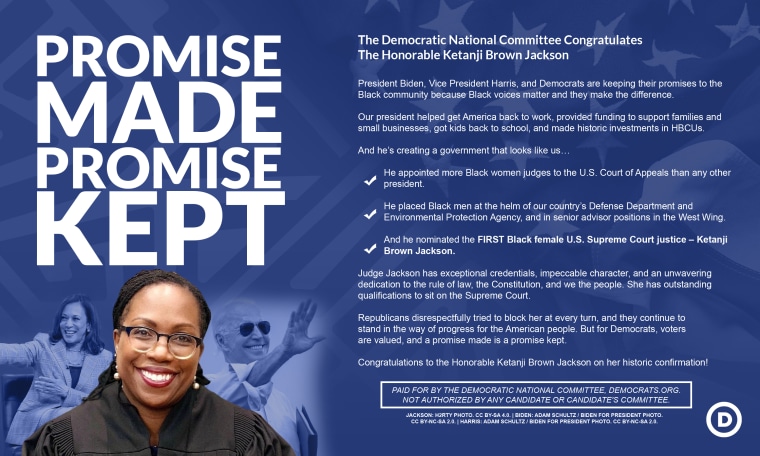
“With these ads, we’re making sure the Black community hears that for President Biden and Democrats, a promise made to voters is a promise kept," DNC Chairman Jaime Harrison said in a statement.
The Democratic Senatorial Campaign Committee also launched digital ads targeting Black voters in Senate battlegrounds, criticizing Republicans for trying to block Jackson’s confirmation.
The ads come as Biden’s approval rating among Black voters has dropped in recent months. In the Aug. 2021 NBC News poll, 83 percent of Black voters approved of Biden. But in the latest NBC News poll conducted in March, Biden’s approval rating among Black voters was at 62 percent.
Midterm roundup: Democratic dollar dominance
WASHINGTON — The Democratic base may not be excited about the midterms, but the party's donors are still opening up their wallets, fueling some eye-popping fundraising hauls for Senate candidates.
Arizona Sen. Mark Kelly announced yesterday that he raised $11.3 million in the first quarter of the year (fundraising reports are due to the Federal Election Commission in one week). That’s ten times more than one of his GOP challengers, Blake Masters, who announced earlier this week raising $1.1 million in the first quarter.
And Nevada Sen. Catherine Cortez Masto announced a $4.4 million haul, while North Carolina Senate hopeful Cheri Beasley said she raised $3.6 million. New Hampshire Sen. Maggie Hassan raised $4.3 million, ten times more than the next closest GOP opponent who’s announced his fundraising so far. And Florida Rep. Val Demings raised a whopping $10 million for her race against GOP Sen. Marco Rubio.
But Democrats learned the hard way in 2020 that money can’t buy voters’ love. A slew of Senate hopefuls who outraised their GOP opponents still ended up losing.
Elsewhere on the campaign trail
Nevada Senate: Sen. Ted Cruz, R-Texas, will head to Nevada on April 21 and 22 to campaign for former Attorney General Adam Laxalt in his race against Cortez Masto, per a Laxalt campaign press release.
Ohio Senate: Ohio Right to Life endorsed “Hillbilly Elegy” author JD Vance in the GOP Senate primary. The group is a “significant player” in Ohio conservative politics, notes NBC’S Henry Gomez.
Pennsylvania Senate: Trump signaled he could pick a favorite in the GOP Senate primary, telling the Washington Post he would make a decision in “about a week.” NBC10’s Lauren Mayk breaks down the potential impact Trump could have on the race.
Michigan Governor: Democratic Gov. Gretchen Whitmer touted her lawsuit to protect abortion rights, telling MSNBC’s José Diaz Balart, “The assault on women's privacy rights and bodily autonomy is no longer a theoretical risk. It is a very clear and present danger.”
New York Governor: Former Gov. Andrew Cuomo isn’t running for governor — at least not as a Democrat — following yesterday’s filing deadline, per Politico. He does have until May 31 to file as an independent.
Pennsylvania Governor: Democrat Josh Shapiro nearly matched the combined haul of the other top GOP candidates in the Pennsylvania governor’s race, raising more than $4.5 million in the first quarter per the Pittsburgh Post Gazette. Businessman Dave White led the GOP field with a $1.8 million haul.
Georgia 07: Democratic Rep. Carolyn Bourdeaux made her first TV ad buy tracked by AdImpact in her May 24 primary race against fellow Rep. Lucy McBath, spending $68,000 on the airwaves.
Breaking down the gender and education gap
Ad spending in Nebraska's race for governor tops $8 million
As Nebraska’s May 10 primary election gets closer and closer, ad spending in the governor’s race keeps going up, now topping over $8 million, according to data from the ad tracking firm, AdImpact.
The majority of that spending can be attributed to just three GOP candidates for governor — businessman Charles Herbster, businessman Jim Pillen and state Sen. Brett Lindstrom.
So far, Herbster has spent the most, a whopping $3.9 million on broadcast, cable and radio ads. Just behind him is Pillen, with over $2.8 million spent, including on multiple ads featuring an endorsement from actor and comedian Larry The Cable Guy. Lindstrom trails the two with almost $1.2 million spent on ads.
All three of these candidates tout major endorsements, which have been featured in their ads. Herbster has been endorsed by former president Donald Trump, Pillen was endorsed by Nebraska Gov. Pete Ricketts and Lindstrom has been endorsed by Jean Stothert, the mayor of Omaha.
However, each candidate has liabilities that have made them unappealing to some Republican voters and appears to have prevented any one candidate from pulling away ahead of the primary election.
Pillen faces allegations that his company, Pillen Family Farms, knowingly hired undocumented workers and altered government forms to protect them.
Herbster attacked Pillen over this allegation in one recent ad that featured a narrator saying, “Illegal immigration means more crime, higher taxes. Jim Pillen? He's part of the problem.” The ad detailed the allegations and accused Pillen of advocating for the University of Nebraska to become a sanctuary campus.
Meanwhile, Herbster’s been under attack on the airwaves by the group Conservative Nebraska. They allege he supports raising taxes and have boosted allegations that Herbster paid his property taxes late over 400 times.
Another group, Restore the Good Life, has been attacking Lindstrom in TV ads, calling him a “liberal tax raiser” who supported raising the gas tax.
Though neither group has disclosed its donors, Gov. Ricketts told local reporters that he and his family donated $600,000 to Conservative Nebraska to support an ad attacking Herbster.
Midterm roundup: Tar Heel tussle
The GOP Senate primary in North Carolina is heating up ahead of the May 17 contest. Former President Donald Trump heads to the state on Saturday for a rally featuring his Senate pick, GOP Rep. Ted Budd, and controversial Rep. Madison Cawthorn.
The Club for Growth PAC, which is backing Budd, released a poll yesterday showing Budd leading former Gov. Pat McCrory, with 44 percent of those surveyed backing Budd and 31 percent backing McCrory. Former GOP Rep. Mark Walker was in third place with 11 percent. A candidate needs to win more than 30 percent of the primary vote to avoid a runoff.
The Club for Growth has been spending in the race and another outside group with ties to the Club is up with a new ad knocking former McCrory over critical race theory. McCrory’s campaign also released a digital spot tying Budd to Cawthorn ahead of Saturday's rally (McCrory’s ad dubbed the event the “Budd-Cawthorn rally.”)
Arizona Senate: Arizona Attorney General Mark Brnovich, who is a top candidate for Senate, issued a report stating there was no evidence of widespread fraud in the 2020 election in Maricopa County, but there were concerns with some voting procedures, NBC’s Vaughn Hillyard and Zoë Richards report. Trump has not yet endorsed in the race, but he has criticized Brnovich in the past.
Ohio Senate: Democratic Rep. Tim Ryan is working to win back white, working-class voters as he runs for Senate, telling the New York Times, “I feel like I am representing the Exhausted Majority.”
Georgia Secretary of State: Georgia Secretary of State Brad Raffensperger is hitting the airwaves ahead of his May 24 primary race against Trump-backed GOP Rep. Jody Hice. Raffensperger’s campaign reserved $419,000 worth of airtime in his first media buy of the election tracked by AdImpact.
North Carolina 13: Local conservatives are opposing Trump’s pick in North Carolina’s 13th District, Bo Hines, who doesn’t live in the district, Politico reports.
Ohio 07: Rep. Bob Gibbs announced yesterday that he’s not running for re-election in the newly drawn 7th District, becoming the 17th Republican to retire. Gibbs had been drawn into the same district as former Trump aide Max Miller, who has Trump’s endorsement.
Inflation, immigration emerge as top ad topics in March
As key primaries and November’s general election draw nearer, one-in-five political advertisements in the month of March specifically mentioned either immigration and the border, or inflation and the cost of living, according to an NBC News analysis.
Of a total of 210 unique ads tracked by NBC News last month in House, Senate and gubernatorial contests, 28 blamed illegal immigration or “open border” policies for problems in their state or district. All of these ads were aired by Republican candidates, and they ranged from passively mentioning illegal immigration to centering a whole commercial on problems at the southern border.
“Biden's open border is killing Alabamians,” goes an ad by Alabama GOP Senate candidate Katie Britt. “Christian conservative Katie Britt will fight back. She'll build the wall, stop the trafficking of drugs and young girls, support law enforcement and protect your right to protect your family,” the narrator in that ad says.

Another 18 advertisements faulted inflation or rising gas prices for their constituents’ problems.
In one of them, Sen. Ron Johnson, R- Wis., calls inflation, “the Democrats' tax on the middle class.”
“I'm Ron Johnson, and I approve this message because I'm concerned about rising prices just like you.”
But unlike with the ads on immigration and the border, Democratic candidates also cited inflation in their commercials.
“The price of gas, housing, prescription drugs: soaring. The old way of doing things isn't working,” said Andrew Kalloch, who’s running for the Democratic nomination for Oregon’s 4th congressional district.
For the third month in a row, NBC News also examined the “boogeymen” featured in political ads all across the country. Boogeymen tend to be people or trends that candidates attack in lieu of striking their direct opponents.
As he was in January and February, President Joe Biden was the top boogeyman target last month, with 29 ads out of 210 ads naming him. All of those 29 were from Republican candidates.
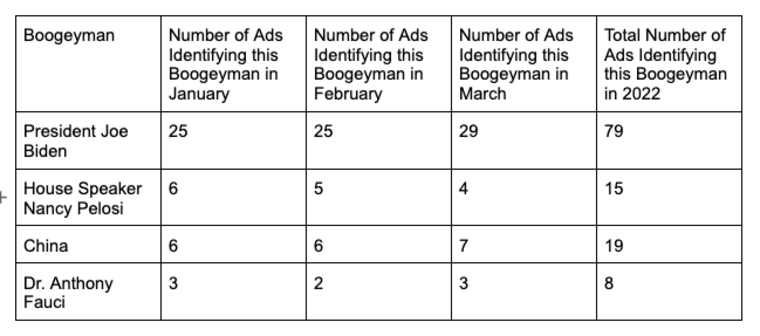
Other top boogeymen observed in January and February were China and House Speaker Nancy Pelosi. They were still prevalent in March’s ads, though they dropped in numbers compared to earlier months.
China was mentioned in seven out of 210 ads and Speaker Pelosi was named in just four.
One of the ads that focused on China as a boogeyman came from Rep. Tim Ryan, a Democrat running for Senate in Ohio.
In the ad, he strings together clips from events where he talks about the country.
Ryan says, “China is out manufacturing us left and right, left and right. America can never be dependent on communist China.”
Midterm roundup: Keystone clash
The Senate Democratic contest in Pennsylvania is taking a negative turn as the May 17 primary approaches. Pennsylvania Progress, a super PAC supporting Rep. Conor Lamb, launched a TV ad saying Lt. Gov. John Fetterman is a “self-described democratic socialist” and “a risk we can’t afford.”
“Conor Lamb may be the only person in Pennsylvania who saw the trash the Republican side is putting up on TV and said, ‘Yeah, we need more of that,’” Fetterman’s campaign spokesman Joe Calvello said in a statement.
(Fact check: While Fetterman backed Bernie Sanders in the 2016 presidential race, he’s never described himself as a Democratic socialist.)
Meanwhile, on the Republican side, former President Donald Trump said yesterday that he plans to endorse in the Senate primary and “maybe fairly soon,” per Politico.
Elsewhere on the campaign trail…
Ohio Senate: Republican candidates for Senate in Ohio faced off at another debate last night. State Sen. Matt Dolan accused former state GOP chair Jane Timken of being soft on crime for hiring former Trump advisor Corey Lewandowski, who faces sexual harassment allegations. Per NBC’s Henry Gomez, Timken was on the offensive against former state treasurer Josh Mandel and businessman Mike Gibbons. The debate was held the same day Mandel and author J.D. Vance began running ads grumbling about being labeled racists.
California 22: The special election to replace former GOP Rep. Devin Nunes is heading to a June runoff. Republican Connie Conway, a former leader in the state Assembly, secured one runoff spot, but it was too early to call the second spot. Vote counting will take a week thanks to mail ballots that can arrive as late as April 12.
North Carolina 11: State Sen. Chuck Edwards upped his ad offensive this week, reserving $286,000 worth of airtime since Monday in his primary race against GOP Rep. Madison Cawthorn. Edwards’ latest spot does not name the controversial congressman, but Edwards says, “If you want a celebrity, go watch the Kardashians. But if you want a proven conservative that will fight and win, then I’m your man.”
Wisconsin: Wisconsin held municipal elections yesterday, and NBC’s Shaq Brewster reports from Milwaukee on the impact of a recent ruling barring the use of unmonitored ballot drop boxes.
Ron Johnson highlights ‘Right-to-Try’ law in new ad
Sen. Ron Johnson, R-Wisc., is highlighting his “Right-to-Try” legislation in a new TV ad as he faces a tough re-election race.
The legislation, one of Johnson’s top legislative achievements, allows those with terminal illnesses to receive experimental drugs that the Food and Drug Administration has not yet approved.
“Without the efforts of Sen. Johnson, my mom wouldn’t be here today,” a man named Mark Akins says in the ad, shared first with NBC News. Akins explains that his mother was able to access critical medicine thanks to Johnson’s bill, which former President Donald Trump signed into law in 2018.
The 30-second spot is part of a statewide ad buy on broadcast and cable networks, per Johnson’s campaign. The campaign reserved nearly $840,000 in air time on Tuesday, according to the ad tracking firm AdImpact.
Johnson’s campaign has spent $3.3 million on ads so far, but that spending has been eclipsed by one of his Democratic challengers, Milwaukee Bucks executive Alex Lasry, who has spent $4.4 million on ads, and the anti-Johnson group Opportunity Wisconsin, which has spent $5.8 million.
Johnson is a top target for Democrats who are looking to hold onto their razor-thin Senate majority. President Joe Biden won Wisconsin by 1 percentage point. Johnson won a second term in 2016 by 3 percentage points, as former President Donald Trump carried the state by 1 percentage point.
Vance and Mandel play the 'not a racist' card in Ohio's hostile GOP Senate primary
Two new TV ads landed with an identical theme Tuesday in Ohio's combative Republican Senate primary.
In their 30-second spots, rivals J.D. Vance and Josh Mandel both grumble about being branded as racists.
"Are you a racist?" Vance, a Marine Corps veteran and the author of "Hillbilly Elegy," asks, jabbing a finger toward the camera in the opening seconds of his ad. "Do you hate Mexicans?”
Mandel, a former state treasurer and, like Vance, a veteran of the Marines, filmed his ad on the Edmund Pettus Bridge in Selma, Ala., site of the historic civil rights marches led by Martin Luther King Jr.
"Martin Luther King marched right here so skin color wouldn't matter," says Mandel, pointing to the bridge. "I didn't do two tours in Anbar Province fighting alongside Marines of every color to come home and be called a racist."
The ads wade into different grievances. Vance's — the first TV ad of his Senate campaign — focuses on immigration and the opioid epidemic. He talks about his mother's struggle with addiction, a topic familiar to readers of his best-selling memoir and the Netflix film adaptation of it.
“The media calls us racists for wanting to build Trump’s wall,” Vance says of the Republican former president before criticizing his Democratic successor. “Joe Biden’s open border is killing Ohioans with more illegal drugs and more Democrat voters pouring into this country."
Vance closes by approving "this message, because whatever they call us, we will put America first."
Mandel's commercial — airing as part of an existing statewide ad buy — focuses on critical race theory, an academic concept taught mostly at the college level that Republicans have turned into a shorthand for local school curriculum that delves into issues of race. The spot opens with a woman from Cortland, Ohio, calling critical race theory "crap" before the scene shifts to Mandel in Selma.
"There's nothing racist about stopping critical race theory and loving America," Mandel asserts.
Morgan Harper, a Democratic Senate candidate in Ohio, quickly criticized Mandel's ad.
“The Republican Party’s tired CRT talking points bear no resemblance to reality," Harper said in an emailed statement. "But for Josh Mandel to misappropriate Dr. King, the Civil Rights movement, and the legacy of Selma for his own political gain is absolutely outrageous."
Both Vance and Mandel have faced accusations of racism, including in cases that have nothing to do with these topics.
While Vance is known for his hard-line rhetoric on immigration, he also has campaigned with Rep. Marjorie Taylor Greene, R-Ga., and defended her at a debate last week after being asked about her recent speech at a white nationalist event.
Mandel's first campaign for state treasurer in 2010 earned criticism for suggesting the Black incumbent had ties to a mosque. He later apologized but has since caught attention for tweets that have targeted Democratic women of color in Congress. He's called for Rep. Ilhan Omar, D-Minn., a Somali-born Muslim, to be deported. And he's called Rep. Alexandria Ocasio-Cortez, D-N.Y., a "pollutant."
Ohio's GOP primary, set for May 3, is one of the most expensive in the country. Recent polls have shown a close race with Mandel and businessman Mike Gibbons at the top of the pack and Vance, former state party chair Jane Timken and state Sen. Matt Dolan also competitive.
The front-runner in the Democratic primary, Rep. Tim Ryan, was criticized last week for an ad that blames China for the loss of U.S. jobs. Asian American groups have condemned the ad, saying it foments anti-Asian sentiment.
Midterm roundup: Tuesday's not-so-special election
Voters head to the polls Tuesday in California's 22nd District for the low-profile special election to replace former GOP Rep. Devin Nunes, who resigned to run Trump’s social media company. The eventual winner will only serve for a short time — as Nunes’ district was broken up in redistricting.
The race features four Republicans and two Democrats, per the Los Angeles Times. Three candidates are running for a full term in the new 21st District. Candidates from all parties compete on the same ballot for the special election. If no one wins a majority of the vote, the top two vote-getters advance to a special election on June 7.
Elsewhere on the campaign trail:
Nevada Senate: Army veteran Sam Brown launched his first statewide TV ad with a 30-second bio spot in his GOP primary race against former state Attorney General Adam Laxalt, who has Trump’s endorsement.
Ohio Senate: Sen. Ted Cruz, R-Texas, endorsed former Ohio state Treasurer Josh Mandel in the GOP Senate primary.
Georgia 07: Democratic Rep. Lucy McBath released her first TV ad ahead of the May 24 primary, where she faces fellow Democratic Rep. Carolyn Bourdeaux in this newly drawn district. The ad focuses on how her son’s murder prompted McBath to pursue public service.
Nebraska 01 special: The special election to replace former Nebraska GOP Rep. Jeff Fortenberry, who resigned after he was convicted of lying to the FBI, has been set for June 28, per the Omaha World Herald.
Texas 34 special: There’s another special election in June for Texas’ 34th District, per the Texas Tribune, where voters will head to the polls on June 14 to replace former Democratic Rep. Filemon Vela, who resigned to join a lobbying firm.
And Maryland GOP Gov. Larry Hogan announced Monday that he would approve the state’s new congressional map after a court order had sent Democratic legislative leaders back to the drawing board. After Maryland’s map is finalized, there will be four states — New York, Ohio, Kansas and Florida — who have yet to finish the redistricting mandated after the 2020 census.
Sununu says Gridiron comments were 'jokes' to bring 'smiles' back to D.C.
New Hampshire GOP Gov. Chris Sununu tells "Meet the Press Daily" that his remarks at last weekend's Gridiron Dinner — the annual white-tie gathering of journalists, politicians and newsmakers in Washington — in which he reportedly made light of former President Donald Trump's mental fitness, were simply jokes made in the spirit of the dinner.
"They are jokes. It's a gridiron dinner and it's a great event," Sununu said. "I think I opened up with a joke about my father and we made jokes about MSNBC and CNN and Joe Biden," he added. "These are all jokes and it's a way to bring some bipartisanship and smiles back to Washington."
Watch the full interview below:
Republican incumbents targeted by Trump remain steadfast
Former President Donald Trump's sway over the GOP will be tested this year as he seeks to oust multiple Republican lawmakers by supporting their primary challengers.
NBC News spoke to two of these congressmen — Reps. Tom Rice of South Carolina and Fred Upton of Michigan — about whether they think Trump is the future of the party and whether they fear a defeat to the challengers he’s endorsed against them.
Both lawmakers voted to impeach former the president after Trump supporters attacked the U.S. Capitol on Jan. 6, 2021 as Congress moved to certify Trump's 2020 loss.
“Donald Trump’s policies, I believe, lifted American families. I think he was a consequential president, but if he attacks the Constitution, if he’s wrong, I’m going to vote against him,” Rice said.
Rice is facing a challenge from South Carolina State Rep. Russell Fry, who’s earned Trump’s endorsement and has been running scathing ads against Rice.
Still, Rice believes he holds more influence among his constituents than the former president.
“I’m sure he’ll influence some of [the voters in my district], the question is are there enough of them versus enough of what I believe to be more reasonable folks who recognize Donald Trump made a huge mistake that day,” Rice added.
Upton also drew the former president's ire after he voted to impeach Trump in 2021 and voted in favor of a commission to investigate January 6.
“He’s a little bit on a scorched earth path right now,” Upton said of Trump.
The longtime congressman has not said if he's definitely running for re-election, although his campaign has aired TV ads in the newly drawn 4th District. He initially faced a primary challenge from state Rep. Steve Carra, who Trump endorsed. But GOP Rep. Bill Huizenga was drawn into the same district, and Trump opted to endorse Huizenga instead, prompting Carra to drop out of the race.
Upton told NBC News that he’s worried that Republicans are ignoring those in their party who don’t worship Trump to their own detriment.
“Some of the folks here are so beholden to Trump that they don't accept those of us that are willing to stand up,” Upton said.
“If we’re going to be in the majority, we’re going to have to appeal to more than just the Trump vote,” he added.
Midterm roundup: 20(20) questions
Former President Donald Trump rallied supporters in Michigan on Saturday, where he once again repeated false claims that the 2020 election was fraudulent and boosted his preferred candidates, NBC’s Vaughn Hillyard and PJ Tobia report from the rally in Washington Township.
Those candidates, and others vying for Trump’s endorsement, echoed Trump’s claims in interviews with NBC. Trump has not weighed in on the gubernatorial contest, but James Craig, a top candidate in the race, attended the rally and would not say whether he would have certified the 2020 election.
“I’ve already said that I would call for a forensic audit to understand the issue. So I’m not going to have you try to back me into a corner,” Craig said, dodging repeated questions from Hillyard.
Republican John Gibbs, the Trump-backed candidate taking on Michigan GOP Rep. Peter Meijer, who voted to impeach Trump after Jan. 6, told NBC that he believes Trump won the 2020 election.
Elsewhere on the campaign trail…
NC-11: GOP Rep. Madison Cawthorn responded to the outrage about his comments saying his colleagues used cocaine and invited him to sex parties by saying “the left and the media” used his comments “to disparage my Republican colleagues and falsely insinuate their involvement in illicit activities.” Cawthorn’s campaign, meanwhile, placed a $54,000 ad buy as he preps for a May 17 primary, per AdImpact. And Cawthorn is scheduled to speak at a Saturday Trump rally in North Carolina.
PA-SEN: Lt. Gov. John Fetterman didn’t attend yesterday’s Democratic Senate debate, but that didn’t stop Rep. Conor Lamb and state Rep. Malcolm Kenyatta from attacking the frontrunner, per the Philadelphia Inquirer.
GA-7: Democratic Rep. Lucy McBath placed her first TV ad spending tracked by AdImpact, spending $74,000 on the airwaves in her race against fellow Democratic Rep. Carolyn Bordeaux.
GA-SEN: Former football star Herschel Walker, the top GOP Senate candidate, has “repeatedly misrepresented his academic credentials,” CNN reports.
UT-SEN: Trump endorsed Sen. Mike Lee, R-Utah, on Friday. Lee faces multiple challengers in his race, including the anti-Trump former presidential hopeful, Evan McMullin.
OH-SEN: A new outside group in Ohio, Buckeyes for a Strong Ohio, has booked over $300,000 worth of time on the airwaves. The group is running spots attacking former state GOP Chair Jane Timken, who’s running for the Republican nomination for Senate.
Outside group knocks Ron Johnson’s wealth in new ad
An outside group that has been spending against Sen. Ron Johnson, R-Wisc., released a new ad Monday criticizing the two-term senator’s personal wealth.
The TV ad from Opportunity Wisconsin, shared first with NBC News, features an Air Force veteran who says Johnson “is supposed to serve Wisconsin. Instead, he served himself,” and called Johnson’s actions “a dereliction of duty.”
The ad echoes other similar spots from the group that note Johnson doubled his wealth while in office and accuse him of personally benefiting from a loophole in the 2017 tax law. Johnson has said he pushed for the provision to help businesses remain competitive and “had nothing to do with any donor or discussions with them.”
Opportunity Wisconsin has outspent every other group and campaign on the airwaves so far in the Senate race, dropping $5.8 million on ads. The latest spot is part of a nearly seven-figure campaign, per a statement from the group, and it will air on broadcast and cable networks, as well as digital platforms, in the Milwaukee, Madison, Green Bay, and Wausau media markets.
Wisconsin is a top target for Democrats who are looking to hold onto their razor-thin Senate majority. President Joe Biden won Wisconsin by 1 percentage point. Johnson won a second term in 2016 by 3 percentage points, as former President Donald Trump carried the state by 1 percentage point.
What Washington’s cryptocurrency regulation might look like
Data Download: Zelenskyy popularity in U.S. soars while Putin's sinks
Sixty-seven percent. That’s the number of Americans who have a positive view of Ukrainian President Volodymyr Zelenskyy among Americans in the latest NBC News poll, while just 7 percent viewed him negatively, giving Zelenskyy a net-positive of 60 percent.
For comparison, the late Princess Diana, had a net positive rating of 75 percentage points in a survey conducted shortly after her death. Zelenskyy’s rating is also on par with Pope John Paul II, who had a 58 percent net positive rating.
At the other end of the spectrum, Russian President Vladimir Putin’s net negative rating was minus 87 percentage points, with 88 percent of Americans viewing Putin negatively and just 1 percent viewing him positively. That rating put Putin just behind Saddam Hussein, who had a net negative rating of minus 91 percentage points.
Gen Z finds itself on the ballot for the 2022 midterms
Two of the youngest congressional candidates of the 2022 cycle also stand on the farthest ends of the political spectrum.
Democrat Maxwell Frost, 25, is a progressive running to replace Rep. Val Demings, D-Fla., who is leaving her congressional seat to run for the Senate.
And Republican Karoline Leavitt, a former Trump White House assistant press secretary who will turn 25 this year, is making a bid to flip one of New Hampshire’s congressional seats from blue to red.
Frost and Leavitt are members of Generation Z — those born after 1996 — and will meet the constitutional requirement to be at least 25 years of age to serve in the U.S. House of Representatives.

“I believe my youth is my greatest strength,” Leavitt told NBC News.
Frost, a former national organizing director for the gun safety group March for Our Lives, says he's using his organizing background to raise money. “We’re not raising money; we’re organizing money,” he said.
One-in-three voters are now from Gen Z and the millennial generation, according to Cristina Tzintzún Ramirez, the president and executive director of NextGen America, a liberal-leaning group focused on young voters.
And candidates of any age face the challenge of getting these younger voters engaged in the political process.
“It requires investing in the power and speaking to the pain of young people for them to turn out,” said Tzintzún Ramirez.
Leavitt, who also worked for Rep. Elise Stefanik, R-N.Y., agrees that reaching young voters is a “daunting challenge,” and says she decided to run for Congress because she’s concerned about the “lack of conservative voices” in her generation, who tend to be Democratic voters.
“If we fail to change the hearts and minds of young people in America, we will not only lose elections as Republicans, but we will lose our country,” she said.
As for Frost, the Florida Democrat has recruited volunteers and donors from across the country into his campaign. Last quarter alone, he received 13,000 individual contributions — from different age groups and professions. Frost had raised nearly $600,000 as of Dec. 31.
He sees his campaign as a “small part of a bigger puzzle,” and is focused is on encouraging people to vote for something, rather than against something.
“We’re running for office across the country, and we’re not going to let anything get in our way,” he said.
Talking policy with Benjy: Climate group looks to gain upper hand on gas prices
Just as President Biden is trying to reframe rising gas prices as a story of private companies gouging workers, environmental groups are looking to make the message stick in congressional races.
The League of Conservation Voters is launching a new $100,000 digital and TV ad buy in four districts, NBC News has learned, targeting GOP incumbents Mike Garcia and Michelle Steel in California and Maria Salazar and Carlos Gimenez in Florida, while Climate Power is spending $200,000 on a national and D.C. ad hitting similar themes.
“As Vladimir Putin wages war, oil companies are making billions by price gouging us at the pump and Republicans are helping them do it,” the national ad, “Higher Profits,” begins. “They took millions from big oil and blocked a clean energy plan that will lower costs for families. They’re leaving us dependent on oil and at the mercy of foreign dictators.”
Republicans have highlighted gas price issues with gusto, arguing it shows the need to empower a party that’s traditionally more supportive of domestic oil production, even if there may not be any one simple policy fix. The latest NBC News poll found voters favored politicians who backed more drilling.
But environmental groups also see a unique opportunity to make the case for independence from fossil fuels on national security grounds. They see signs in polling that Americans blame gas companies in part for high prices, a message President Biden has tried to run with by accusing companies of not using existing permits to increase production and lower prices. A strategy memo from Democratic pollster Geoff Garin, commissioned by LCV and Climate Power, urges Democrats to go on offense on the issue.
“There’s this notion that Republicans are on safe footing around gas prices and that there’s only a price to pay for Democrats, and it’s wrong,” Lori Lodes, Executive Director of Climate Power, told NBC News. “There really is a special place in gas price hell for Republicans who are taking contributions from fossil fuel companies.”
Midterm roundup: Border politics
Sen. Mark Kelly, D-Ariz., is encouraging President Joe Biden not to end the order known as Title 42 that has prevented immigrants from crossing the U.S.-Mexico border during the pandemic, amid fears that rescinding the authority would cause a surge of migrants at the southern border. Kelly and Sen. Krysten Sinema, D-Ariz., stressed that the Department of Homeland Security doesn’t appear to have a plan “to maintain a humane and orderly process” at the border.
A surge of migrants could create yet another headache for Biden, but also for senators like Kelly, who are top GOP targets. Republicans have long been hammering Kelly and other vulnerable Democrats on immigration, and a surge of migrants could provide another opening for GOP attacks.
Elsewhere on the campaign trail:
New York redistricting: A state judge struck down New York’s congressional and state legislative maps as unconstitutional gerrymanders, giving legislators until April 11 to draw new district lines.
Georgia Senate: Two super PACs backing GOP Senate candidates Gary Black and Latham Saddler are planning seven-figure ad buys attacking Republican frontrunner Herschel Walker ahead of the May 24 primary, in an attempt to force Walker into a primary runoff, Politico reports.
Wisconsin Governor: Former Wisconsin GOP Gov. Tommy Thompson met with former President Donald Trump at Trump’s Mar-a-Lago club as Thompson weighs another run for governor, the Milwaukee Journal Sentinel reported. Former Lt. Gov. Rebecca Kleefisch, who is running for governor, also met with Trump earlier in March.
Pennsylvania Senate: Democratic Lt. Gov. John Fetterman announced yesterday he’d participate in three Senate primary debates. But Rep. Conor Lamb still criticized Fetterman for skipping a debate this weekend, claiming Fetterman is afraid to answer questions about a 2013 incident where he pulled a gun on a Black man who was jogging. (Fetterman has said he pursued the man after hearing gunshots, and he “didn’t know what race that individual was.”)
Florida Governor: Agriculture Commissioner Nikki Fried’s campaign is signaling that she plans to question Rep. Charlie Crist’s past relationship with Trump in the Democratic primary for governor, NBC’s Marc Caputo reports.
Secretaries of State: Secretary of State races have drawn candidates who embrace conspiracies about the 2020 election, per the Associated Press, with seven of the eight GOP secretaries running for re-election drawing such primary challengers.
Michigan 10: Trump endorsed Army veteran John James, who is running in Michigan’s open 10th District after two unsuccessful runs for Senate.
Michigan Attorney General: An outside group dropped a new ad in the Palm Beach, Fla., media market pushing Trump to abandon his preferred candidate for Michigan attorney general, Matt DePerno, per the Washington Examiner.
Super PAC funded by crypto executives aims to spend $10 million in Democratic primaries
A super PAC funded by a cryptocurrency executives is throwing its support behind Democratic congressional candidates this election cycle.
Protect Our Future, which is funded by Sam Bankman-Fried, founder of the cryptocurrency exchange FTX, as well as others affiliated with FTX and the crypto space, plans to invest at least $10 million on Democratic primaries this year, according to a spokesperson for the group.
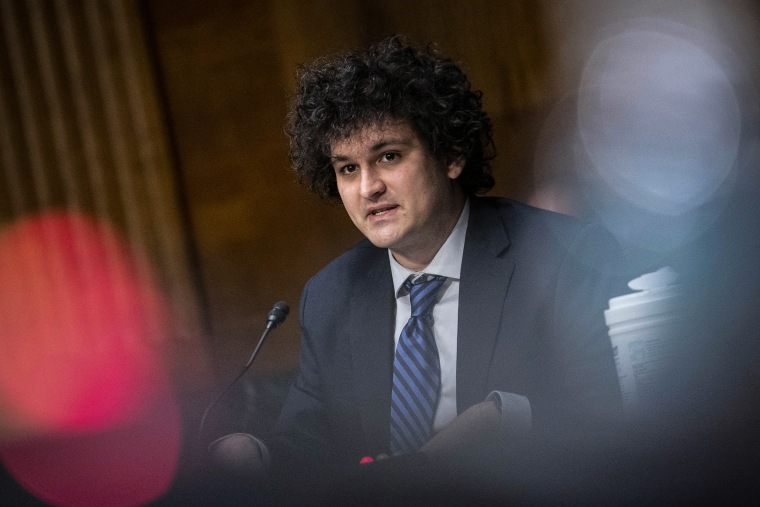
The spokesperson said the PAC is “focusing initially on candidates who take a long term view on policy planning, especially as it relates to pandemic preparedness and prevention."
And the group is already engaging in early primaries in deep-blue districts.
Ahead of the March 1 Texas primary, Protect Our Future PAC spent over $770,000 on ads supporting state Rep. Jasmine Crockett in her bid for the open congressional seat in Texas’ 30th District. Crockett won over 48 percent of the vote in the Democratic primary and is headed to a May runoff against Jane Hamilton, who took over 17 percent of the vote.
In Oregon’s new 6th District, the PAC has spent almost $1.5 million supporting researcher Carrick Flynn for the Democratic nomination in the open seat.
And in Georgia’s 7th District, where Democratic Rep. Lucy McBath is running, Protect Our Future has spent over $1.4 million supporting her bid against fellow Democratic Rep. Carolyn Bordeaux.
The spokesperson also told NBC News that the group focused on these three candidates because of their dedication to preventing future pandemics and addressing inequities in pandemic response.
Protect Our Future has also already endorsed a number of other congressional candidates, including Reps. Shontel Brown, D-Ohio, and Ritchie Torres, D-N.Y.
The PAC is also supporting Nikki Budzinski in Illinois’ 13th District, which is currently held by Republican Rodney Davis; Mayor Robert Garcia in California’s 42nd District, which is currently held by Republican Ken Calvert; and Gilbert Villegas in Illinois 3rd District; which is currently held by Democrat Marie Newman, who is running in another seat due to redistricting.
Though Protect Our Future has already spent heavily on midterm ads, it’s not the only group funded by donors with ties to cryptocurrency that plans to back Democratic candidates this cycle.
Web3 Forward hasn’t disclosed any of its donors, but the Texas Tribune reports it is affiliated with another PAC that counts an FTX executive among its leading donors.
Web3 Forward spent over $880,000 on ads promoting Crockett ahead of her primary, according to AdImpact.
"Cryptocurrency: The Wild West" premieres tonight on “Meet the Press Reports,” on NBC News NOW, Thursday nights at 10:30 PM ET and on-demand Fridays on Peacock.
GOP Sen. Cassidy not ruling out Louisiana governor bid
Senator Bill Cassidy, R-La., isn't closing the door on 2023 gubernatorial bid but remains “focused on being a Senator,” he told NBC News.
“When someone asks you about it, of course, you put it in the back of your mind, you kind of work on it,” Cassidy, who was re-elected last year by a wide-margin for another six-year term, said on Thursday. “But right now, I’m just totally focused on doing the job here.”
Cassidy has publicly rebuked former President Donald Trump throughout his presidency, creating a unique brand for himself among Senate Republicans. He voted to convict Trump for inciting the January 6th insurrection during the second impeachment trial, and turned to bipartisan deal-making in the 50-50 split Senate.
Louisiana's unique electoral system pits all candidates into a non-partisan primary, with the top two candidates moving onto a late fall election if one can't win the majority of the vote. Democratic Gov. John Bel Edwards is term-limited and won't be running.
“So there’ll come some point in the future where I’ll make a decision,” Cassidy said. “But that’s just gonna be kind of a, you know, talking through it with my wife, all this sort of thing, and mulling over in the background. But that’s ways off.”
Earlier this week, The Advocate reported that Cassidy "is seriously considering a run for governor next year, according to sources who have spoken to him." And he expanded a bit on his thought process in a recent interview with Politico.
More than 50 House Republicans attend fundraiser for Cheney's primary rival
More than 50 GOP House members attended a fundraiser on Wednesday night to support the campaign of Harriet Hageman, the GOP primary challenger to Congresswoman Liz Cheney in Wyoming, NBC News has confirmed.
The fundraising effort is the latest escalation by colleagues within Cheney’s own party to actively aid her challenger’s candidacy. In February, the RNC voted to censure Cheney, and former President Donald Trump has already endorsed Hageman.
House Minority Leader Kevin McCarthy spoke at Wednesday night’s D.C. fundraiser, which raised more than $200,000 to benefit Hageman’s campaign.
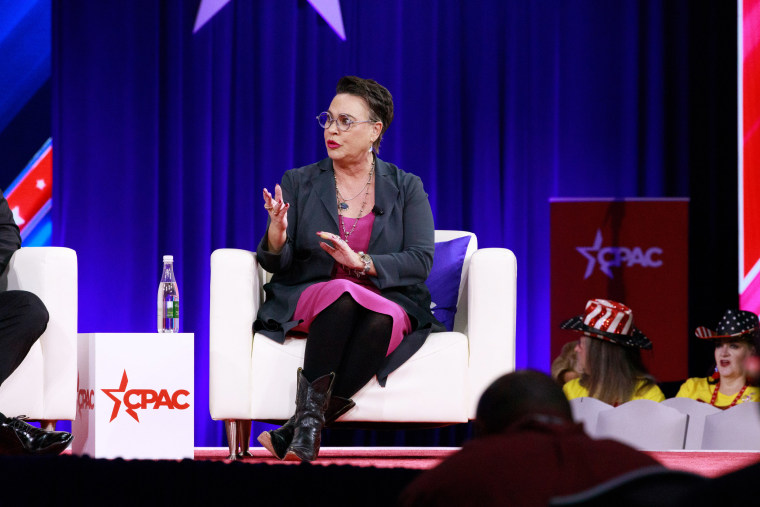
Just over four months away from Wyoming’s primary contest, Cheney continues to battle for re-election, appearing at a fundraiser alongside U.S. Sen. Mitt Romney in mid-March in Virginia. CBS reported that the effort raised more than $500,000 for Cheney's re-election (NBC News has not confirmed that total).
While the first fundraising quarter of 2022 ends Thursday, Cheney significantly outraised Hageman in 2021— $2.7 million to $412,000.
Cheney continues to serve as the vice chair of January 6th Committee, helping investigate the Capitol attack and individuals who may have been involved in the leadup to the attack on the Capitol last year or in efforts to overturn the 2020 presidential election.
Midterm roundup: A (Caw)thorn in the GOP’s side
Controversial Rep. Madison Cawthorn, R-N.C., drew the ire of his fellow Republicans and House Minority Leader Kevin McCarthy when he said in a podcast interview that lawmakers he “looked up to” had invited him to orgies and done cocaine in front of him. McCarthy suggested Cawthorn could face unspecified “consequences,” and that Cawthorn told him the claims were exaggerated.
With Cawthorn once again in the headlines, North Carolina GOP Sen. Thom Tillis endorsed one of Cawthorn’s primary challengers, state Sen. Chuck Edwards, CNN reported yesterday. And the New York Times had a dispatch from Cawthorn’s district, where some voters and party leaders are souring on the freshman congressman.
Just how many GOP voters are turned off by Cawthorn? He’ll find out on May 17, when he needs to win with more than 30 percent of the vote to avoid a runoff.
Elsewhere on the campaign trail
Ohio Senate: Republican Mike Gibbons’ campaign is up with a new spot combatting fellow Republican Senate hopeful Josh Mandel’s attacks on him, this time with a Marine veteran accusing Mandel of exploiting military service. https://host2.adimpact.com/admo/viewer/60a1b6b8-020b-4344-b46a-5d5d9ecad293
Pennsylvania Senate: Celebrity doctor Mehmet Oz took the stage with his fellow GOP Senate candidates yesterday, sharing a stage for the first time with a chief rival, former hedge fund manager David McCormick. But it was Oz who quickly became a frequent target, NBC’s Henry Gomez reports.
Illinois Governor: The Democratic Governors Association made its first TV ad buy tracked by AdImpact, reserving $728,000 worth of airtime in the Illinois governor’s race.
Michigan 11: The Democratic member-on-member primary between Reps. Andy Levin and Haley Stevens is sparking frustration within the party.
And Louisiana legislators overrode Democratic Gov. John Bel Edwards’ veto of the state’s new congressional map.
Poll: 21 percent of Americans say they've dealt with cryptocurrency
One in 5 Americans — 21 percent — say they have invested, traded in or used cryptocurrency such as Bitcoin or Ether, according to results of a recent national NBC News poll.
The crypto users are disproportionately men ages 18-49, Black respondents, political moderates and urban dwellers.
Among all Americans, 19 percent say they have a positive feeling toward cryptocurrency, 25 percent have a negative impression and 31 percent say they’re neutral.
An additional 25 percent say they either don’t know what cryptocurrency is or are unsure about it.
(The NBC News poll of 1,000 adults — 750 of whom were reached by cellphone — was conducted March 18-22 and reported an overall margin of error of plus or minus 3.1 percentage points.)
As the use of cryptocurrency grows nationally, Washington has noticed, as well. President Joe Biden’s much-anticipated executive order on assessing crypto policies has triggered a major step toward the federal government's developing possible new regulations.
"Cryptocurrency: The Wild West" premieres tonight on “Meet the Press Reports” on NBC News NOW, Thursday at 10:30 p.m. ET and on demand Fridays on Peacock.
Sens. Kirsten Gillibrand, D-N.Y., and Cynthia Lummis, R-Wyo., recently announced they are collaborating on what would be the first major bipartisan effort to regulate the crypto markets. They plan in the coming weeks to propose a “broad-based regulatory framework for how this industry should potentially be regulated in the future,” according to Politico. Their goal is to conduct a “very complex and intensive review of the different aspects of this industry,” with proposed regulation by the Commodity Futures Trading Commission and the Securities and Exchange Commission.
If it moves forward, the proposed legislation would follow many regulations in states like Wyoming in formally categorizing cryptocurrencies. In Wyoming, it has been established as property. Gillibrand and Lummis say they plan to include language that would classify crypto as commodities or securities.
According to the World Economic Forum, there are more than 18,000 types of cryptocurrencies with a total market value of $1.7 trillion. Every day, $91 billion worth of crypto is traded.
Rubio demands Education Secretary Cardona answer questions about monitoring new Florida law
Education Secretary Miguel Cardona on Monday pledged to monitor Florida’s implementation of a controversial new law that restricts schools from teaching young kids about sexual orientation and gender identity.
“By signing this bill, Governor [Ron] DeSantis has chosen to target some of Florida’s most vulnerable students and families, all while under the guise of ‘parents’ rights.’ Make no mistake: this is a part of a disturbing and dangerous trend across the country of legislation targeting LGBTQI+ students, educators, and individuals,” Cardona said.
Cardona’s statement prompted Florida Sen. Marco Rubio, who is running for re-election this year, to fire back Tuesday with a letter demanding answers from the secretary about what that might entail. Rubio's questions range from "Should pre-K through third grade students be required to engage in classroom discussions about sexuality and gender identity?" to "In detail, please explain the course of action the Department plans to take in implementing your order to 'monitor' the Florida law?" to "How does the Department intend to protect the right of a parent to care, raise, and educate their child?"
Here's the letter obtained by NBC News. "Parents, students, and educators want their leaders helping them recover from the trauma of the pandemic—not playing political games or pushing policies that target some of our most vulnerable students," an Education Department spokesperson said in a statement.
Midterm Meter: 'Dangerous territory' for Democrats in latest NBC News poll
"Meet the Press Daily" takes a look at how the latest NBC News poll has impacted our Midterm Meter ahead of this November's election, watch below:
Trump suggests Perdue is a “long shot” candidate for Georgia governor
In a wide ranging interview with two anchors from the right-wing “Real America’s Voice” news network, former President Donald Trump suggested that former Georgia Sen. David Perdue might lose his primary challenge against GOP Gov. Brian Kemp.
“I endorse a lot of people that are long shots,” Trump told anchors John Solomon and Amanda Head at Trump's Mar-a-Lago club. “Look, we’re fighting a governor who’s done a very poor job in Georgia and a horrible job on the election and hopefully David Perdue is going to win.”
“I mean that is – these are not sure things,” Trump added.
The Kemp-Perdue primary takes place on May 24.

The former president also spoke about his recent decision to withdraw his endorsement of Rep. Mo Brooks, R-Ala., who is running in Alabama’s Republican primary for the state’s open Senate seat..
Trump rescinding his endorsement of Brooks was widely seen as an attempt to avoid a loss by one of his preferred candidates. Before he withdrew his endorsement of Brooks, the congressman was polling lower than other candidates and struggled to keep pace with their fundraising.
The former president said he pulled away from Brooks because of the congressman's comments at an August rally that people concerned about fraud in the 2020 election should "put that behind you." (There is no evidence of widespread fraud in the 2020 election.)
“So, [Brooks] has a 53-point lead after I endorse him, nothing before I endorse him. He’s got a 53-point lead and then he goes out and starts talking about, ‘Let’s get on to the future, let’s not talk about the 2020 election fraud anymore,’ … He loses his entire lead and he goes from first place, unbeatable, to last place,” Trump said.
The Alabama primary also is on May 24.
NBC News poll: Support for Roe v. Wade boosts candidates
Voters are more likely to back a candidate who support the landmark Supreme Court decision that codified a woman’s right to an abortion, according to a new NBC News national poll.
A majority of registered voters – 56 percent – said they are more likely to vote for a candidate who supports the Roe v. Wade decision, while 25 percent said they are less likely to do so.
Opposing Roe v. Wade was one of the least popular candidate attributes among the 15 tested in the survey, with a net negative rating of 38 percentage points. If a candidate opposes Roe v. Wade, 58 percent of voters said they were less likely to support that candidate, while 20 percent said they were more likely to vote for that candidate.
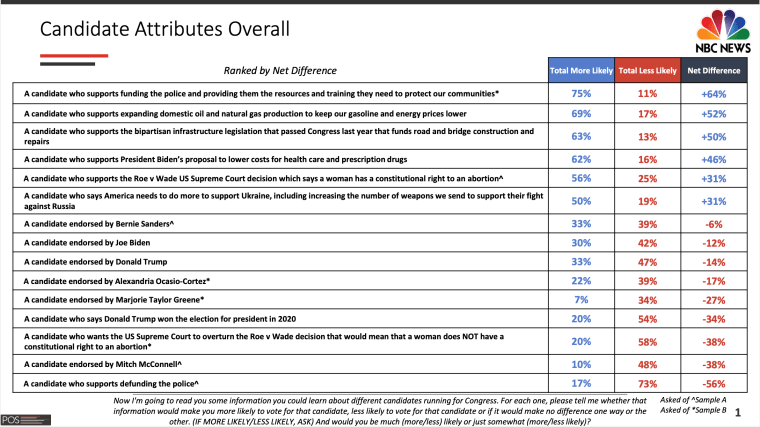
The data underscores the potential political impact should the Supreme Court uphold restrictions on abortion or even overturn Roe. V. Wade altogether later this year, with a decision looming on Mississippi’s ban on abortions after 15 weeks of pregnancy.
Americans do not currently list abortion as a top issue, with just 3 percent of adults naming abortion as the most important issue facing the country in the latest NBC News survey. But that could change depending on how the court rules, and if abortion becomes a major campaign issue.
Views on abortion predictably fell along partisan lines.
The vast majority of Democrats – 91 percent – said they were more likely to vote for a candidate who supports abortion rights, while 30 percent of Republicans said they would do the same. A plurality of independents — 46 percent — said support for abortion rights would make them more likely to vote for a candidate, while 14 percent said that would make them less likely.
The NBC News poll was conducted March 18-22 of 1,000 adults — including 750 respondents who only have a cellphone — and the overall margin of error is plus-minus 3.1 percentage points. The margin of error for the poll's 790 registered voters is plus-minus 3.5 percentage points.
Data Download: The number of the day is 72
Seventy two: That’s how many seats the National Republican Congressional Committee is targeting in November, ahead of a midterm that many expect to be fought on favorable ground for Republicans. Republicans need a net gain of just five seats to take control of the House.
The new announcement from the NRCC is a rejiggering of their target list now that redistricting is almost finished. Nearly half of the target list — 33 districts — are seats that President Biden won by at least 10 percentage points. The decision to target Democratic territory underscores Biden’s sinking approval ratings even among his party’s base, as well as the reality that redistricting has resulted in fewer competitive districts.
Other numbers you need to know today:
$102 million: That’s how much the Democratic super PAC House Majority PAC is spending on its initial wave of TV ad buys, reserving airtime across 50 media markets, per the New York Times.
21: The number of states suing the CDC and other federal agencies calling on them to end the public transportation mask mandate.
4 million: The number of people who have fled Ukraine, the United Nations announced Wednesday.
17 percent: The portion of Americans surveyed in the latest Gallup poll who listed inflation as the most important problem facing the country, up from 10 percent who said the same in February.
Midterm roundup: Map flaps
Five states have yet to finalize their redistricted congressional maps, according to 538, including Florida, Louisiana, Maryland, Missouri and New Hampshire. And things just got more complicated in Florida where Republican Gov. Ron DeSantis vetoed the congressional map passed by the GOP-controlled legislature, extending the intraparty feud.
Even in states where maps were finalized, court battles continue to cast uncertainty over the new district boundaries. Ohio’s Redistricting Commission has struggled to get a map past the courts, and the Ohio Supreme Court put out a new schedule that said it won’t review the latest map until after the state’s May 3 primary, per The Columbus Dispatch.
Elsewhere on the campaign trail:
Ohio Governor: On the GOP side, incumbent Gov. Mike DeWine is up with his first TV spot touting the state’s school re-opening and his budget proposal adding funding for law enforcement amid some progressive pushes to cut funding. The Democrats vying to take on DeWine faced off on the debate stage Tuesday night, where the governor was the main focus, per the Cincinnati Enquirer.
Ohio Senate: Rep. Tim Ryan, the frontrunner in the Ohio Democratic primary, is out with a new ad focused on one topic — China.
Pennsylvania Senate: Two of the frontrunners in the GOP primary, celebrity doctor Mehmet Oz and former hedge fund manager Dave McCormick, will share a stage at a forum on Wednesday morning, per the Philadelphia Inquirer’s Jonathan Tamari.
Connecticut Governor: Democratic Gov. Ned Lamont is up with his TV first ad touting his economic record.
Virginia 02: Democratic Rep. Elaine Luria is out with a new statement blasting the Biden Administration’s defense budget, arguing “it sucks.”
‘Inside shenanigans’: Tennessee GOP candidates slam residency bill
Some Republican candidates in one crowded House primary in Tennessee are frustrated with new legislation on candidate residency that could disqualify some of them from the race.
“With this new ridiculous law, Davy Crockett wouldn’t have even been able to run for Congress again in Tennessee if he had survived the Alamo without waiting three years once moving home,” Dave Vitalli, a TV actor and GOP candidate for the 5th Congressional District, told NBC News.
The Tennessee legislature on Monday approved a bill requiring U.S. House and Senate candidates to reside in the state for three years or more, and in the county they’re running in for at least one year, in order to qualify to run. It’s not clear if GOP Gov. Bill Lee will sign the bill into law ‑ his spokesperson Laine Arnold said the administration is reviewing the legislation.
Some states add additional requirements on their candidates, but, if enacted, the bill could face legal challenges for potentially violating the Constitution, which states members of the U.S. House must be at least 25 years old, a U.S. citizen for at least seven years, and live in the state they represent.
The new rule would disqualify at least two GOP contenders in the competitive 5th District primary, including Vitalli, who moved from New York to Tennessee in 2021.
Morgan Ortagus, a former spokesperson for former President Donald Trump’s State Department who has Trump’s endorsement and who moved to Tennessee last year, would also be disqualified.

“No one questioned my residency when I served our country in the intelligence community, the Trump Administration, nor in the U.S. Navy Reserves, and President Trump certainly didn’t question my residency when he endorsed me for this seat,” Ortagus said in a statement Tuesday.
Tennessee GOP state Sen. Frank Niceley, who sponsored the bill, said that despite criticism of the residency requirement from some running for Congress, he has never received so much support for a piece of legislation, and pointed to sizable majority votes in both chambers.
"No one thinks it's a good idea to let people move in here and run for office,” Niceley told NBC News. “It's one thing to know the interstates coming into a town, which one of the candidates did not know, but it's another thing to understand the culture."
But Vitalli argues Niceley is using his bill to bolster his candidate of choice in the 5th District Republican primary, former Tennessee Speaker of the House Beth Harwell.
“It is a shame candidates are so weak that the only way they can win is to use their political cronies to pass laws that eliminate two of their top competitors,” Vitalli said. “Harwell may win due to these inside shenanigans, but the real losers will be the Tennessee voters that her and her cronies have stripped of a chance to have more choices at the ballot box.”
Asked about Vitalli’s accusation, Niceley demurred, saying, “I think this is a good bill for future generations."
Nine Republicans have filed with the Federal Elections Commission to run in the 5th District primary. Democratic Rep. Jim Cooper, who currently represents the 5th District, announced in January he is retiring at the end of his term after concluding there is "no way” for him to win under Tennessee’s new congressional map, which divided Nashville into three different districts. The Cook Political Report rates the new 5th District Solid Republican.
NBC News poll: Covid drops as a top issue
Two years into the Covid pandemic, the threat of the virus is no longer a top issue facing Americans, according to a new national NBC poll.
Just 3 percent of Americans surveyed listed the coronavirus as the most important issue facing the country, an 11-point drop from January’s survey, when 14 percent of Americans listed Covid as their No. 1 issue.
In January, the coronavirus ranked the third-most important issue. But it dropped to eighth place in this most recent survey, trailing the cost of living (at 21 percent); jobs and the economy (at 16 percent); the war between Russia and Ukraine (14 percent); voting rights and election integrity (13 percent); climate change (10 percent); taxes and spending (8 percent); and border security and immigration (7 percent).
The drop in Covid as a top issue comes at the same time as the NBC News poll shows an increase of Americans giving President Biden a thumbs-up on the issue— 51 percent approved of his handling of the coronavirus, up from a 44 percent approval rate in January. And 46 percent disapproved of Biden’s handling of the pandemic, down from 53 percent in January.
But that didn’t help Biden’s overall job approval rating, which dropped to just 40 percent, the lowest level of his presidency.
Republican pollster Bill McInturff of Public Opinion Strategies, who conducted the poll along with Democratic pollster Jeff Horwitt of Hart Research Associates, linked Biden’s low overall approval rating to the drop in concern about Covid.
“Americans very rarely give you credit for something going well,” McInturff said. “They move on to the next problem.”
A majority of Americans now believe the country has turned a corner on the pandemic, with 62 percent saying the worst is behind us, a significant uptick from the 44 percent who said the same in January. That’s the highest level of optimism since vaccines became widely available in April 2021, when 61 percent of Americans believed the worst of the pandemic was behind us.
Americans were split on whether the federal government should continue to require face masks on public transportation, with 51 percent saying the requirement should stay in place, and 46 percent saying it should end.
And the number of Americans surveyed who were vaccinated remained unchanged from January at 76 percent. There was a slight uptick in Americans who had also received a booster shot, with 51 percent saying they received a booster compared to 45 percent who said the same in January.
The NBC News poll was conducted March 18-22 of 1,000 adults — including 750 respondents who only have a cellphone — and the overall margin of error is plus-minus 3.1 percentage points. The margin of error for the poll's 790 registered voters is plus-minus 3.5 percentage points.
NBC News poll: Ketanji Brown Jackson less polarizing, but less well known
Judge Ketanji Brown Jackson is less polarizing than other recent Supreme Court nominees, but she’s also less well known, according to a new national NBC News poll.
Jackson, who is poised to become the first Black woman to serve on the court, enjoys a positive favorability rating, with 20 percent of Americans surveyed saying they have a positive view of her, compared with 8 percent who view her negatively.
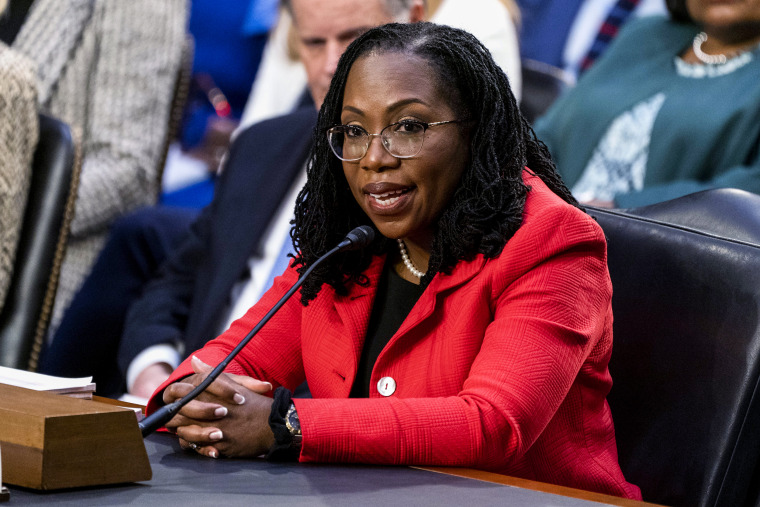
In addition, the poll finds 36 percent saying they support her nomination, while 17 percent oppose it. That’s the highest net support rating of any Supreme Court nominee since 2005.
Democratic pollster Jeff Horwitt of Hart Research Associates said Jackson’s favorability was “one bright spot” for Democrats in the survey, which featured low approval ratings for President Joe Biden. Horwitt conducted this survey with Republican pollster Bill McInturff of Public Opinion Strategies.
But a majority of those surveyed — 56 percent — didn’t recognize her name or weren’t sure how to rate her. Jackson had the lowest name identification rate of all recent Supreme Court nominees since 2005, except for Attorney General Merrick Garland, who was nominated to the court in 2016 but was not confirmed (and didn’t even receive a hearing from the Republican-controlled Senate).
That could be because the survey was conducted from March 18-22, before Jackson’s confirmation hearings began. The war in Ukraine has also dominated the news since Biden named her as his nominee last month.
McInturff noted Jackson likely benefited from the lack of attention.
”This is a case where the judge should be thrilled that she’s not the news story,” he said.
“She's going to be less contentious and we're just not going to see numbers that are paralleling the last two to four nominations that we've been through,” McInturff later added.
But, McInturff noted, Jackson’s nomination did not appear to significantly boost Biden’s favorability with the Democratic base. Among Black adults, 60 percent supported Jackson’s nomination. But Biden’s approval among Black adults ticked down slightly in the new NBC survey from March, with 62 percent approving of the president compared to 64 percent who approved of Biden in January.
“The hope for a potential political benefit [Biden] might have gotten is also moderated because it just is getting less attention,” McInturff said.
The NBC News poll was conducted March 18-22 of 1,000 adults — including 750 respondents who only have a cellphone — and the overall margin of error is plus-minus 3.1 percentage points. The margin of error for the poll's 790 registered voters is plus-minus 3.5 percentage points.
NARAL endorses Shapiro in Pennsylvania gov. race
NARAL Pro-Choice America, one of the largest pro-abortion lobbying groups in the U.S., will endorse Democrat Josh Shapiro’s campaign in Pennsylvania’s gubernatorial race.
The group told NBC News first of its plans to endorse Shapiro, the state's attorney general. It will announce its endorsement publicly later Friday.
“NARAL Pro-Choice America is proud to endorse Attorney General Josh Shapiro in his bid to become the next governor of Pennsylvania. With a state legislature controlled by anti-choice politicians, it is more important than ever that Pennsylvanians have a governor willing to stand up for their freedom to make their own decisions about their families and futures,” NARAL Pro-Choice America President Mini Timmaraju said.
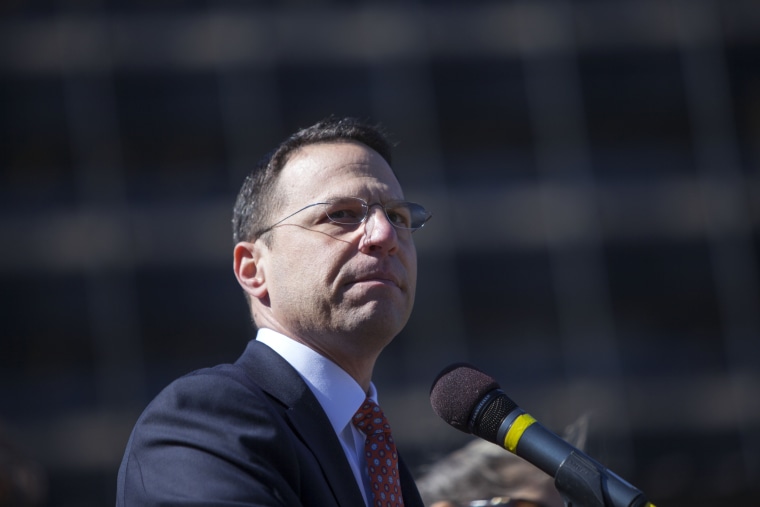
In a statement, Shapiro said he was “proud to have NARAL’s support in my campaign for governor so that I can continue my work to protect and expand access to reproductive healthcare in Pennsylvania.”
Shapiro, Pennsylvania’s Democratic attorney general, has been uniquely outspoken about his support for abortion rights. He frequently and loudly discusses his record, as the state’s top law enforcement officer, in protecting women's reproductive rights, and the actions he’s taken to fight restrictive abortion laws in other states.
NBC News reported earlier this month on how his early and outspoken emphasis on a traditionally divisive culture war issue comes with large political risks in Pennsylvania, a purple state with a large population of Catholic voters. But the approach may end up being a key to victory in November, because it could end up turning out in an off year Democratic and progressive voters concerned about the future of abortion rights. (In December, the Supreme Court appeared prepared to uphold a Mississippi law that would ban almost all abortions after 15 weeks of pregnancy, which would roll back, or completely strike down, Roe v. Wade).
Shapiro will run against the winner of the May 17 GOP Republican primary. Many of the dozen Republican candidates running have said they would sign strict anti-abortion measures bills into law. The nonpartisan Cook Political Report rates the state’s gubernatorial race as a toss up.
Stacey Abrams sues over Georgia campaign finance law
Democratic candidate for Georgia governor Stacey Abrams filed a lawsuit this week challenging a state law that allows incumbent Gov. Brian Kemp to raise unlimited campaign contributions in a special fund.
According to a bill Kemp signed into law last year, incumbent governors and certain legislative leaders are allowed to set up “leadership committees” where they can raise campaign funds with virtually no limits. Challengers, like Abrams, are only allowed to form these committees after they secure a party nomination. This year, that would be after the state’s primary election on May 24.
Abrams is running for the Democratic nomination unopposed and is asking the court to allow her to use a leadership fund as the de facto party nominee before the state’s primary. (As part of the lawsuit, Georgia Rep. Nikema Williams, who is the chair of the state's Democratic Party, filed an affidavit declaring Abrams the party's nominee.)
The lawsuit, which was filed in federal court on Monday, names members of the Georgia Government Transparency and Campaign Finance Commission as defendants.
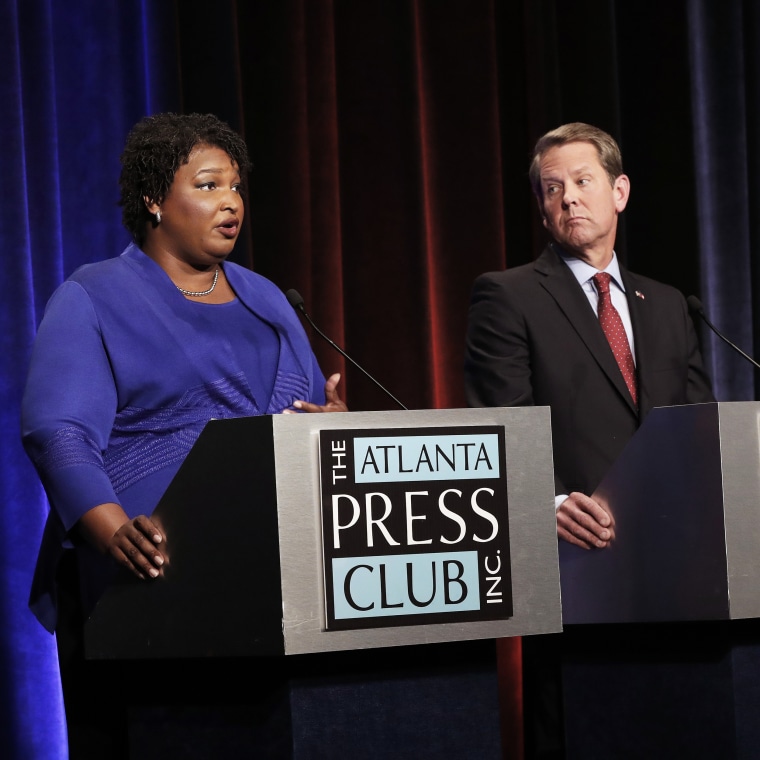
This commission oversees the registration of these leadership committees and Abrams says that her leadership committee, One Georgia, has registered with the commission and has begun accepting contributions. But the commission refuses to acknowledge whether it has approved the registration of One Georgia and whether it believes the Abrams’ leadership committee is operating lawfully, according to the lawsuit.
The suit asks the court to prohibit the commission from opening any investigations into Abrams’ leadership fund and to prevent the commission from using the law against Abrams and One Georgia.
Former Sen. David Perdue, R-Ga., who is running for the Republican nomination for governor, filed a lawsuit against Brian Kemp and others in January regarding this same statute. In that suit, Perdue requested that Kemp’s leadership committee be prohibited from collecting and spending money on the governor’s race because he believes it to be unfair that Kemp can raise unlimited contributions in the same race where Perdue cannot.
Both lawsuits are being presided over by the same judge, Mark Cohen of the U.S. District Court for the Northern District of Georgia.
Texas Democrat Filemon Vela to resign from Congress in coming weeks
Rep. Filemon Vela, D-Texas, will resign from Congress in the next few weeks to accept a position at the law firm Akin Gump, the congressman tells NBC News.
Vela had already announced he isn't seeking re-election in 2022, but his early exit will reduce Democrats' already slim margin in the House (there are currently 222 Democrats and 210 Republicans with three vacancies). He didn't give a date for his resignation, which would trigger a special election.
Vela won his seat in Congress in the 2012 election and is currently the vice chair of the Democratic National Committee.
The news was first reported by Punchbowl.
The resignation will prompt a special election under the old lines for the 34th Congressional District, which is more competitive than the lines drawn for the next decade by the Texas Legislature that will make the seat more Democratic.
Candidates will run in that special election for the right to fill out the remaining months of the term Vela was elected to in 2020, all competing on the same ballot with the top two moving onto a runoff unless one candidate wins the majority vote
Mo Brooks: Trump asked me to rescind 2020 election and re-instate him as president
Alabama GOP Rep. Mo Brooks, whose Senate endorsement was just retracted by former President Donald Trump, told NBC News Wednesday that the former president asked him within the last six months to "rescind" the 2020 presidential election and re-instate him as president.
In a statement responding to Trump's decision to revoke his endorsement, Brooks said that "President Trump asked me to rescind the 2020 elections, immediately remove Joe Biden from the White House, immediately put President Trump back in the White House, and hold a new special election for the presidency."
Brooks told NBC that those conversations with Trump took place after Sept. 1, 2021, but said that the two men never discussed the mechanicians of how such a thing would work because the GOP congressman refused his requests.
"We never got that far because I explained to the president that what he asked was legally impossible and violates the United States Constitution and I’m not going to do it," he said.
"In one of the conversations he mentioned having a subsequent election for the presidency."
Brooks has been one of Trump's most stalwart defenders — he spoke at the Jan. 6 rally in Washington D.C. that preceded the attack on the Capitol and has repeated Trump's unfounded claims of election fraud. In his statement rescinding his endorsement, Trump criticized Brooks for August comments that supporters should put the 2020 election "behind you" and "look forward," arguing that he "went 'woke.'"
"There's no one in Alabama with the brain size of a pea or larger who would believe that I'm a woke liberal," Brooks told NBC after being read Trump's statement.
But Brooks had also been struggling to break out in the crowded Alabama Republican primary race, which includes former Senate aide Katie Britt and military veteran Mike Durant (both outraised him in 2021).
The congressman told NBC that Trump did not alert him before taking back his earlier endorsement, adding that he nonetheless remains confident of his chances to win a primary runoff.
If no candidate wins the majority of the vote in Alabama's May 24 primary, the top-two finishers will move onto a runoff election.
Some Democratic National Committee members looking at changes to presidential primary calendar
The Democrats' 2024 presidential nominating calendar could see a shake up after party officials circulated a draft letter for discussion that could lead to the party changing its early primary states.
The document, obtained by NBC News and first reported by the Washington Post, outlines three criteria for the Democratic National Committee’s Rules and Bylaws Committee (RBC) to deliberate:
- Electorate diversity in ethnicity, geography, union representation and economic backgrounds;
- Competitiveness in the general election;
- And ability to run a “fair, transparent and inclusive nominating process.”
In recent years, Iowa has led the cycle with its role as the first caucus state, followed by the first-in-the-nation primary in New Hampshire, with Nevada and South Carolina voting before Super Tuesday. In the new proposal for discussion, all states would need to apply for consideration – an uphill battle for Iowa, which some Democrats have criticized for its caucus system, lack of racial diversity, and political shift toward the Republicans.

The process would include at least a month for states to submit their cases and conduct virtual hearings, followed by a six-week deliberation period with presentations from the recommended finalists.
The letter adds that the committee will discuss the proposed changes at its virtual meeting on Monday as it works toward approving a 2024 calendar that “reflects the principle that our party’s diversity is its strength; puts Democrats in the best position to win up and down the ballot in November 2024; and contributes to a fair and sound electoral process.”
“We will continue to let the process play out, as it does every four years, and look forward to hearing the insight and recommendations from all interested parties,” RBC co-chairs Jim Roosevelt and Lorraine Miller said in a statement to NBC News.
While the DNC is expected to finalize its 2024 calendar this summer, the Republican National Committee has not indicated it supports any changes to the presidential nominating calendar next cycle.
Club for Growth standing by Brooks endorsement after Trump rescinds his
In the wake of former President Donald Trump’s withdrawal of his endorsement for Rep. Mo Brooks, R-Ala., the conservative Club for Growth is standing by their endorsement of Brooks’ bid for the Republican nomination for Senate in Alabama.
"We believe he is the only principled, pro-growth conservative in the race,” David McIntosh, the president of Club for Growth’s PAC, said in a statement.
The group has already spent over $2.3 million on ads supporting Brooks in the primary, per AdImpact, an ad-tracking firm.
In dollars spent on ads, Club for Growth comes second in this race behind Alabama’s Future PAC, a group supporting former Senate aide Katie Britt. Alabama’s Future has so far spent over $2.6 million on ads supporting Britt and attacking Brooks, according to AdImpact.
That support has been important for Brooks, as he has been outraised by Britt and military veteran Mike Durant, who has been largely self-funding his bid.
However, the candidates are still two months out from the May 24 state primary.
Brooks has advocated for Republicans to “look forward” to the 2022 and 2024 elections, rather than dwelling on conspiracy theories about the 2020 election. This position has put him at odds with Trump and other prominent Republicans.
'No More Mo' ads are just hours late
Hours after former President Donald Trump announced he is rescinding his endorsement of Rep. Mo Brooks, R-Ala., for Senate, the group No More Mo started running TV ads in the state advocating for Trump to withdraw the endorsement.
In the ad, the group argues that, “Alabama loves winners. Trump loves winners," and positions Brooks as a “proven loser.”
The ad’s narrator says, “Mo has been running for 40 years, taking millions from D.C. insiders and losing every statewide campaign he's run.”
“A classic flip flopping politician that opposed Trump before he was for him,” the narrator adds. “Alabama loves winners. Trump deserves a winner, but career politician Mo Brooks is a proven loser.”
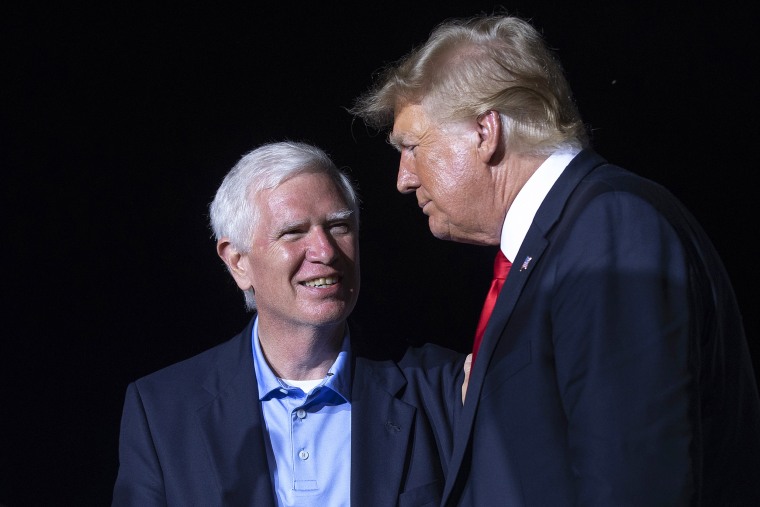
It seems the ads were slated to begin running today, before Trump announced he was taking back his endorsement.
In his statement, Trump said he was doing so due to Brooks' comments urging Republicans to focus on upcoming elections rather than past ones.
At an August event in Alabama, Brooks told voters, “there are some people who are despondent about the voter fraud and election theft of 2020. Folks, put that behind you. Put that behind you. Yes, look forward! Look forward! Beat them in 2022! Beat them in 2024!” He was met with boos from the audience and anger from Trump.
In today’s statement, Trump said, “Mo Brooks of Alabama made a horrible mistake recently when he went 'woke' and stated, referring to the 2020 Presidential Election Scam, 'Put that behind you, put that behind you, despite the fact that the Election was rife with fraud and irregularities.”
No evidence of widespread fraud or irregularities were found in the 2020 election.
Recent polling showed both veteran Mike Durant and former lobbyist Katie Britt leading Brooks in the Republican primary.
Brad Parscale returns with new tech to turn America red
Brad Parscale, the former top political aide to Donald Trump, is developing software for Republican campaigns that would incorporate artificial intelligence into the tools used to target voters, raise money and advertise, NBC News has learned.
If successful, Parscale’s "Campaign Nucleus" could become the GOP’s answer to Democrats’ edge in the digital arena, supplanting a series of service providers — most notably the customer relationship and management giant Salesforce — that Republicans now view as hostile to conservatives.
"With Nucleus, what we will do is connect all of the software," he said in one of a series of telephone conversations with NBC News in recent months.
He would also execute one of the more stunning comebacks in modern politics: in July 2020, Parscale was demoted from managing Trump’s campaign; two months later, he was detained and held for psychological evaluation after police were called to his Florida home during a drinking bout in which he carried a gun and threatened himself. No charges were brought against him.
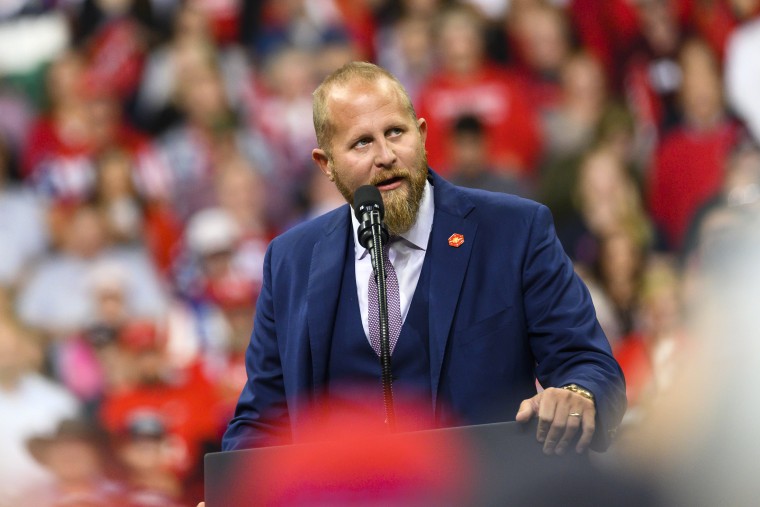
With Republicans eager to move away from what they describe as "blue economy" companies that favor Democrats, Parscale hopes to capitalize on GOP visions of a rival "red economy."
While he has been talking publicly about the basic "Campaign Nucleus" concept since shortly after the 2020 election, the software has been developed since then and the integration of artificial intelligence is brand new. Several campaigns, including that of Ohio Republican gubernatorial hopeful Jim Renacci, are using a "beta" version of the product now, he said, and he is currently targeting sales to political agencies that serve multiple clients.
Parscale, who gave NBC News an exclusive demonstration of his product, plans to announce on Tuesday that he has licensed artificial intelligence technology from AIAdvertising, a firm that bought one his companies, Giles-Parscale, several years ago. He said he has struck a deal with investors in Campaign Nucleus that caps his pay and prevents the sale of the company.
Parscale pictures Republican campaigns, party committees and conservative interest groups across the country making his software the standard, he said in a video-conference interview last week. He is marketing the program as a way to give every GOP candidate and county party chair access to tools previously available only to the biggest federal and statewide campaigns because of the prohibitive expenses of hiring large digital and data teams.
“A guy running for state legislature can have the same power as a presidential campaign,” Parscale said. “We’re leveling the playing field, and we’re leveling the playing field with the left, also. They currently can control us — canceling us if they don’t like our direction — and this removes that.”
Republicans have targeted Salesforce, in particular, because of its relationship with the Republican National Committee, a longtime client.
Within a week of the Jan. 6 riot, Salesforce told The Verge that it had stopped the RNC from “use of our services that in any way could lead to violence.” The RNC is suing the company and the House committee investigating the Jan. 6 attack on the Capitol to block a subpoena for its records.
“He’s smartly designing it to be a Salesforce killer, especially because Salesforce is not on our team,” said Gerrit Lansing, president of WinRed, an online clearinghouse for Republican campaign donations. “Most of our tech stack that the average campaign uses is going to have to be rebuilt in the next few years” to stop using companies perceived to align with Democrats.
Jake Corman, Republican candidate for governor in Pennsylvania, golfed with Trump last month
Jake Corman, the top Republican in Pennsylvania's state Senate and one of 10 GOP candidates for governor there, recently scored an audience with former President Donald Trump over a round of golf.
Their meeting late last month — near Trump’s Mar-a-Lago resort in West Palm Beach, Fla. — flew largely under the radar.
Corman was photographed on the golf course that day, though not with Trump, in a series of shots published by DailyMail.com.
“I was fortunate to be invited to play golf with the president recently, and continue to speak with him often, though our conversations will remain private,” Corman told NBC News in a statement Tuesday.
Corman has endeavored to refashion himself as a Trump loyalist despite an initial unwillingness to accept debunked claims that widespread voter fraud cost Trump the 2020 election. But Corman now oversees the state legislature’s review of the 2020 results. He also muscled state Sen. Doug Mastriano, a rival for the GOP nomination, out of a key role in the process, The Philadelphia Inquirer reported last year.
“I am actively seeking — and would be honored to have — President Trump's endorsement,” Corman said Tuesday. “He remains the most popular Republican in Pennsylvania, and for good reason.”
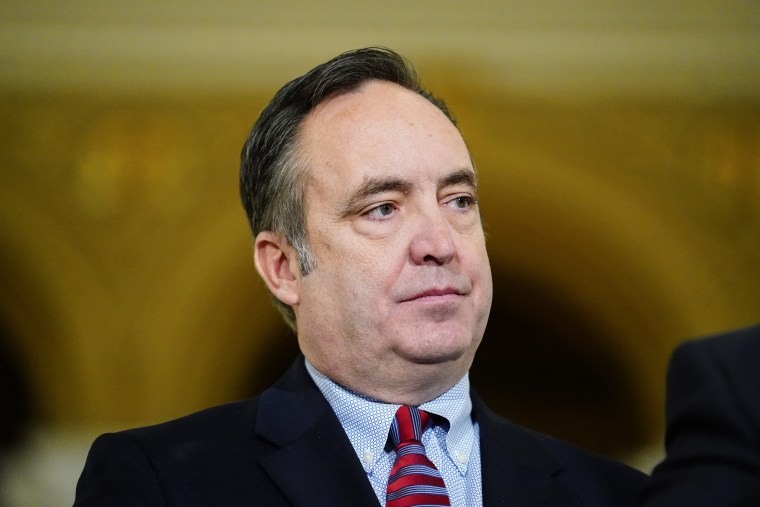
Trump has made clear his interest in this year’s race, but he hasn't endorsed yet. Pennsylvania is a rare state where the governor chooses a secretary of state to administer elections.
“Sometimes,” Trump said in a video message to Pennsylvania Republicans that played before a January debate among contenders for governor and U.S. Senate, “the vote counter is more important than the candidate.”
Kellyanne Conway, who served as one of Trump’s campaign managers in 2016 and later as a senior White House counselor, is among Corman's campaign advisers. Other former Trump aides have taken sides. Bill Stepien, Trump’s final campaign manager in 2020, is working with former Rep. Lou Barletta, who lost a 2018 Senate race with the then-president’s endorsement.
NBC News reported last month that GOP candidates, their strategists and other close observers of the race feared a tricky and chaotic race that could yield a pro-Trump primary winner who appeals less to the wider November electorate. Josh Shapiro, the state’s attorney general, faces no opposition in his bid for the Democratic nomination for governor.
Mastriano and other candidates have worked hard to flex pro-Trump credentials. A Fox News poll this month showed Barletta and Mastriano essentially tied for first place, with 19 percent and 18 percent of the primary vote, respectively. Dave White, a former Delaware County council member, was next at 14 percent, followed by Bill McSwain, a former federal prosecutor who was appointed by Trump, at 11 percent. Corman was fifth, at 6 percent.
Ukraine, inflation and Trump dominate feisty Ohio Republican Senate primary debate
Five GOP candidates running for Ohio’s open Senate seat hashed out their views on Ukraine, inflation, former President Trump, immigration and each other's candidacies in a debate Monday night.
Right off the bat, former state treasurer Josh Mandel addressed an incident that occurred at a previous forum on Friday, where he Mike Gibbons stood chest-to-chest and appeared ready for a physical altercation.
"I’m a fighter, I’m a Marine and I’ll never back down from a fight,” Mandel told moderators when asked to explain the incident on Monday while Gibbons echoed the same sentiment by saying he stuck to his position that military and private sector experiences are different.
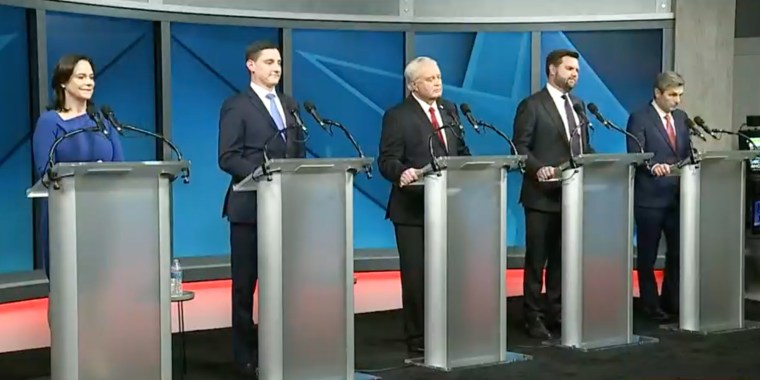
The other three candidates — author J.D. Vance, businessman Matt Dolan and former state GOP chair Jane Timken — condemned Gibbons and Mandel for their outburst.
One central point of debate among the candidates was Russia's invasion of Ukraine. Vance was the only candidate to say that defending Ukraine is not “in our vital national interest," and said he would "condition further Ukrainian aid on support for our border and support for our problems."
"Look, it’s tragic, it’s terrible," Vance said. "What Vladimir Putin did was wrong in invading a sovereign country on his border. We have our own problems in the United States to focus on."
Others pushed back on that assertion, arguing that the U.S. has a duty to help Ukraine.
“Our responsibility, as tragic as it is, is to keep that conflict contained and if it ebbs into NATO allies, we have a responsibility to defend them,” Dolan said.
All five candidates, however, were against a U.S.-enforced no fly zone in Ukraine.
When it came to former President Donald Trump and his lack of endorsement in this race, each candidate said they would accept his endorsement. Trump has already said he won’t endorse Dolan.
“I’m doing everything I can to earn his support. I hope I earn his support, I’d be honored to earn his support,” Mandel said.
Vance again addressed his past tweets and comments criticizing Trump years ago, before he was first elected president.
“All of us say stupid things and I happen to say stupid things very publicly,” Vance said.
When it came to the 2020 election, Dolan was the lone candidate to raise his hand when the field was asked if they believe Trump should move past it, saying that Ohio has secure elections and the Republican Party needs to shift priorities to the future.
Other candidates took issue with that. “Our democracy is at stake,” Timken said when asked about Trump's refusal to accept the 2020 election result.
Chris Christie says he's 'absolutely considering the possibility' of another White House run
Former New Jersey Republican Gov. Chris Christie is not ruling out a run for president in 2024.
When asked on a local news show Sunday about whether he would consider running against former President Donald Trump in 2024, Christie told WMUR’s Adam Sexton, “I'm absolutely considering the possibility, Adam."
"If I decide to run for president, Adam, I will take on whoever is in the race, whether it’s former President Trump or anybody else," he added.
While the party awaits an announcement from Trump about 2024, some other potential Republican candidates have been cautious about sharing their own plans or pledging not to run if Trump does.
Asked about that dynamic, Christie told Sexton, “If I believe I’m the right person to be the president of the United States, then it’s my job to go out there and make the case for myself and against anybody else that’s in the race.”
At an event at Saint Anslem College in New Hampshire on Monday morning, Christie wouldn’t say whether or not he was running, but he did preemptively attack others who refuse to say whether they’re running until Trump makes a decision.
“And quite frankly I think those potential candidates who have said 'I'm running unless he's running' are disqualified,” Christie told students.
"If you don't think you're good enough to be president, then don't run,” he added.
Christie also said that Trump shouldn’t run unopposed in 2024 just by the nature of who he is.
“No one is going to give the Republican presidential nomination away in 2024 without competition,” he told students.
Christie ran for president in a crowded Republican primary field in 2016, where he dropped out after a poor showing in the New Hampshire primary. A few weeks later, he endorsed Trump for the nomination.
Following the election, Christie headed President Trump’s transition team and then served out the rest of his term as governor of New Jersey through 2017.
Midterm roundup: Almost a Buckeye brawl
“Everyone’s coming out swinging tonight,” the moderator of a FreedomWorks forum featuring Ohio’s GOP Senate candidates said with a laugh Friday night after former state Treasurer Josh Mandel called out investment banker Mike Gibbons.
The moderator probably didn’t think punches would actually be thrown, but 10 minutes later, Mandel and Gibbons seemingly almost came to blows as Mandel knocked Gibbons’ stock holdings and business dealings in China.
“You’ve never been in the private sector,” Gibbons said, prompting Mandel to stand up and go nose-to-nose with Gibbons. “You don’t know squat,” Gibbons added, and Mandel responded, “Two tours in Iraq, don’t tell me I haven’t worked!” The crowd booed as the pair had to be separated.

The episode highlights how rough some GOP primaries have gotten, overshadowing discussions about more substantive policy differences. Case in point? The altercation came after a question about the U.S. response to the war in Ukraine.
Elsewhere on the trail:
Oklahoma Senate: Former EPA Administrator Scott Pruitt phoned former President Donald Trump to ask for his endorsement as he considers a run for the state’s open Senate seat, NBC’s Julie Tsirkin reports.
Pennsylvania Senate: Former first lady Melania Trump has told her husband she supports celebrity doctor Mehmet Oz in the state’s crowded GOP Senate primary race.
Pennsylvania Governor: State Attorney General Josh Shapiro is embracing his support for abortion rights in his gubernatorial bid with the future of Roe v. Wade hanging in the balance.
South Carolina 01: NBC News heads down to Summerville to take a look at the Trump-backed attempt to oust GOP Rep. Nancy Mace.
Like what you see? Sign up for First Read from Meet the Press for fresh reporting and analysis on the top political stories.
Sarah Godlewski focuses on drug prices in new TV ad
Wisconsin state Treasurer Sarah Godlewski is out with a new ad in the state's Senate race criticizing incumbent GOP Sen. Ron Johnson, as well as some of her fellow Democrats, over the the price of prescription drugs.
“For decades, Washington politicians have promised to lower the cost of prescription drugs. But every year, the prices go up. Why? Because Republicans like Ron Johnson — and let’s be honest, too many Democrats — don’t have the guts to stand up to the pharmaceutical companies,” Godlewski says in the 30-second spot, shared first with NBC News.
The ad is part of a “seven-figure” ad buy across TV and digital platforms in the state’s major media markets, per Godlewski’s campaign.
Godlewski one of multiple Democrats competing in the Aug. 9 primary to take on Johnson. The other top contenders include Lt. Gov. Mandela Barnes, Milwaukee Bucks executive Alex Lasry, and Outagamie County Executive Tom Nelson. The Democratic primary has heated up in recent weeks with Lasry also launching TV ads.
Johnson is a top target for Democrats looking to hold onto control of the Senate. President Joe Biden carried the state by less than 1 percentage point in 2020 after former President Donald Trump won Wisconsin by 1 point in 2016. That year, Johnson also won a second term, defeating former Democratic Sen. Russ Feingold by 3 points.
Former Trump EPA administrator eying a bid for open Oklahoma Senate seat
Former EPA chief Scott Pruitt is considering running for the Oklahoma Senate seat being vacated by retiring Sen. Jim Inhoffe, R-Okla., a source familiar with Pruitt’s thinking tells NBC News.
Pruitt, a Trump appointee who resigned from the agency in 2018 following multiple ethics scandals, has been making calls for endorsements and quietly building out his team, the source adds. He has yet to make a formal decision.
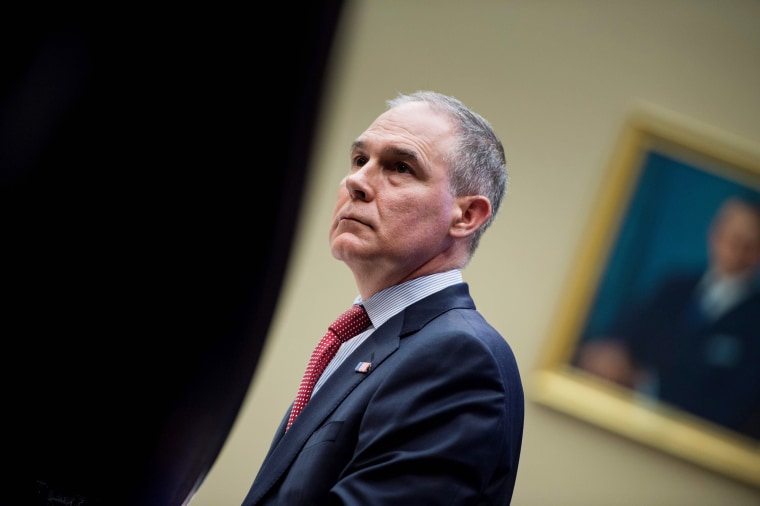
Inhofe, 87, announced his retirement back in February, citing his wife's health issues. The open seat quickly drew in a wide range of conservative candidates, including Inhofe's former Chief of Staff Luke Holland, Rep. Markwayne Mullen, R-Okla., and former Oklahoma House Speaker T.W. Shannon. Former Rep. Kendra Horn has jumped into the race on the Democratic side.
Pruitt called former President Trump seeking his endorsement before deciding whether to run for the seat, two sources familiar with the discussion tell NBC News. Trump has not made an endorsement in the race.
"Every candidate running in America is seeking President Trump’s endorsement," Trump spokesperson Taylor Budovich tells NBC News. "Its truly unprecedented and a reflection of President Trump’s influence on American politics and the demand for his America First agenda."
Inhofe was just re-elected to another six-year term in 2020, and a special election will take place this Fall to fill his seat. Pruitt has until April 15th to decide whether he will jump in the race.
Prior to his tenure at the EPA, Pruitt served as Oklahoma's Attorney General.
CBS was first to report Pruitt's exploration of the race.
Kyiv mayor calls out Russian propaganda against Ukraine in 'MTP Daily' interview
Spending ramps up in Alabama Senate race
Despite having former President Donald Trump’s endorsement, GOP Rep. Mo Brooks is being outspent in Alabama’s contentious — and pricey — Senate primary. And the race is about to get even more expensive.
Retiring GOP Sen. Richard Shelby is transferring more than $6 million from his campaign account into a super PAC to support his former chief of staff Katie Britt, Politico reported, to help Britt advance to a primary runoff. A spokeswoman for Shelby did not respond to a request for comment.
With a divided GOP field, which includes Brooks, Britt and Army veteran Mike Durant, it’s possible no candidate wins a majority of the primary vote on May 24, sending the top two vote-getters to a June runoff.
Durant’s campaign has spent the most on the airwaves so far, dropping $2.2 million on ads, according to the ad tracking firm AdImpact. Britt’s campaign has spent $1.1 million, while Brooks has spent more than $330,000.
Britt has already had some help from outside groups, including the super PAC Alabama Future, which has spent $2.3 million on pro-Britt ads Alabama Conservatives Fund, which has spent $1.1 million, and Alabama Christian Conservatives, which has spent $210,000.
Alabama Patriots PAC spent $2.2 million on ads to support Durant.
Club for Growth Action has spent $2.1 million to bolster Brooks, whose campaign also just reserved $455,000 in ads. His newest ad touts Brook’s participation in the Jan. 6 rally in Washington, D.C.
“On Jan. 6, I proudly stood with President Trump in the fight against voter fraud,” Brooks says in the ad.
But Trump has recently been reconsidering his endorsement as Brooks has struggled to break through the GOP field. In an interview with The Washington Examiner, Trump called Brooks “disappointing,” suggesting he could back a different candidate.
Politico reported the former president met with Britt last month, but Trump has not yet endorsed another contender.
Americans have vastly inaccurate guesses about the nation's demographics, new study suggests
Amid non-stop political debates and culture wars about America’s shifting demographics, a new survey suggests Americans are deeply confused about who actually lives in America.
A study by YouGov America asked respondents to estimate what percentages of U.S. adults fit various categories based on race, religion, geography, income and more. The results, per their memo: “Americans tend to vastly overestimate the size of minority groups” and “underestimate the size of most majority groups.”

And by vastly, they mean vastly. Here are some of their poll findings, along with the actual percentages.
Here are the average guesses from respondents about the percentages of certain demographic groups in the U.S. compared to the actual numbers:
Gay or lesbian: Average guess: 30 percent — reality: 3 percent.
Transgender: Average guess: 21 percent — reality: 1 percent.
Christian: Average guess: 58 percent — reality: 70 percent.
Muslim: Average guess: 27 percent — reality: 1 percent.
Jewish: Average guess: 30 percent — reality: 2 percent.
Black: Average guess: 41 percent — reality: 12 percent.
Hispanic: Average guess: 39 percent — reality: 17 percent.
Asian: Average guess: 29 percent — reality: 6 percent.
Native American: Average guess: 27 percent — reality: 1 percent.
Military veteran: Average guess: 40 percent — reality: 6 percent.
First-generation immigrant: Average guess: 33 percent — reality: 14 percent.
Live in New York City: Average guess: 30 percent — reality 3 percent.
Belong to a union: Average guess: 36 percent — reality: 4 percent.
More than $500,000 household income: Average guess: 26 percent — reality: 1 percent.
The median responses were somewhat more accurate, but still way off in most cases. As YouGov America’s polling memo notes, its findings are consistent with past surveys showing similar gaps, even as there’s some disagreement over what causes them.
While the tendency to overestimate minority groups is sometimes attributed to fear, ignorance, or media coverage, their memo notes that people made similar mistakes in their poll even with completely apolitical minority populations like left-handed people, suggesting a more general perception problem is at play. People who know few members of a minority population personally might assume they must be biased by their own geographic and social situation and overcorrect in the opposite direction.
Senate Intelligence Chairman Mark Warner says U.S. must 'bring all forms of pressure to bear' on Russia
Senate Intelligence Committee Chairman Mark Warner, D-Va., said on "Meet the Press Daily" that the U.S. should "bring all forms of pressure to bear" on Russia, including sanctioning "every member of the Russian Parliament." Watch the full interview:
Talking Policy: Fed paints a more pessimistic picture on short-term economy
The Fed raised interest rates by 0.25 percent on Wednesday, the first in a series of expected hikes to rein in inflation. But the more significant takeaway from its meeting may be how Fed members have become more pessimistic about the next year’s forecast — with more inflation, less growth, and a ton of uncertainty on the horizon. They now see inflation at 4.3 percent for 2022, versus 2.6 percent in their December forecast. And they expect the economy to grow 2.8 percent instead of 4 percent.
For months, the Fed has been predicting inflation would break eventually as things settled back to normal after the pandemic (or at least a “new normal”).
Even with 40-year high inflation this year, that’s still their overall prediction, but the return date for “normal” keeps getting pushed back — first by Omicron, and now by Russia’s invasion of Ukraine.
“Inflation is likely to take longer to return to our price-stability goal than previously expected,” Fed Chair Jerome Powell said at a press conference.
Fed members now see 2023 and 2024 as more likely target dates for prices moving quickly towards two percent inflation, and considerable risk that things could be upended along the way.
In more positive news, Powell still sees limited risk of a recession that would undo surging job gains in recent months. “All signs are that this is a strong economy,” he said.
But with voters currently more upset over prices than jobs, it adds up to a darker picture for Democrats in the midterms, who are running out of time to change voters’ perceptions of the economy and face immediate obstacles largely beyond their control.
Jeff Fortenberry faces primary fight as trial begins
GOP Rep. Jeff Fortenberry is facing a spirited primary challenge at home, but this week he’s 1,500 miles away from his Nebraska district to face the allegations that he lied to the FBI.
Fortenberry has been charged with lying to authorities about accepting foreign campaign contributions, which are illegal. The nine-term congressman has denied any wrongdoing. His trial kicked off this week in Los Angeles, the site of the fundraiser in question. Back home in Nebraska, the fight of Fortenberry’s political career is playing out on the airwaves.
State Sen. Mike Flood has stepped up to take on the embattled congressman in the Republican primary, which is set for May 10. This is Fortenberry’s first competitive primary race since he was first elected to represent the 1st District, which includes Lincoln, in 2004.
Flood has so far outspent the congressman on the airwaves, spending $304,000 on ads to Flortenberry’s $208,000. But an outside group dubbed the American Future Fund has spent $87,000 on anti-Flood ads, per the ad tracking firm AdImpact.
Flood’s spots have highlighted Fortenberry’s legal troubles.
“Jeff Fortenberry is charged with felony crimes for lying to law enforcement. Now, he claims he didn't lie, he just forgot about thousands of illegal contributions,” a narrator says in an ad from Flood’s campaign that’s currently on the air, before pivoting to criticizing Fortenberry on immigration.
Fortenberry’s ad on the air titled “Stop the Flood” (see what he did there?) also focuses on immigration, a clear appeal to the GOP base.
It’s not clear how much money Flood’s campaign has to spend over the next seven weeks. He has not filed a campaign fundraising report since he launched his run after the most recent filing deadline. Fortenberry’s campaign had $895,000 on hand as of Dec. 31
Club for Growth comes to Budd's defense after McCrory ad on Putin
The conservative Club for Growth is coming to the defense of Rep. Ted Budd, R-N.C. after his top GOP rival in the state's Senate race attacked some of his statements on Russia's invasion of Ukraine.
A week after former North Carolina Gov. Pat McCrory launched an ad that takes snippets of comments from Budd to accuse him of praising Russian President Vladimir Putin, the Club began airing a new ad calling McCrory's spot a "low down, dirty hit job."
"McCrory cut the tape," the ad's narrator says, using the clips from the McCrory advertisement followed by the fuller context of Budd's remarks. The Club for Growth is supporting Budd's candidacy.
Budd is quoted by McCrory calling Putin a "very intelligent actor," but the Club ad includes him following up by saying "although I would say he’s been quite erratic in this approach to the Ukraine." The Club ad also includes Budd talking about Putin's strategic priorities, while also including him calling the attack on Ukraine "evil" and saying "we stand with the Ukraine people."
When asked about the criticism, a McCrory advisor told NBC "we're thrilled with this ad."
"Congressman Budd is collapsing in real time because he can’t open his mouth without praising Putin or excusing his invasion, and this ad proves it," the advisor said.
Wisconsin Democrat Lasry attacks Ron Johnson in new, seven-figure ad buy
Wisconsin Democratic hopeful Alex Lasry is launching his first ad attacking Republican Sen. Ron Johnson as part of a new seven-figure buy, his campaign tells NBC News.
In Lasry's new spot, seen first by NBC News, the narrator attacks Johnson for recently dismissing a push to bring 1,000 jobs to the state (he argued that while he's "supportive of it," the bigger problem in his state is that employers can't "find enough workers").
And it points to Johnson's praise of the recent policy plan authored by National Republican Senatorial Committee Chairman Rick Scott, R-Fla., (which calls for sunsetting all laws every five years) to say he supports cutting Social Security and Medicare.
"Lasry says let's get more money into working people's pockets and cut their taxes. No wonder so many unions say Alex Lasry is the strongest Democrat to beat Ron Johnson," the narrator says to close the ad.
The Lasry campaign tells NBC that the seven-figure buy will also include digital advertising.
Lasry is a top executive with the Milwaukee Bucks basketball team and has spent more than any other candidate in the race on advertising, per the ad-tracking firm AdImpact. He's already spent $3.5 million on the airwaves to Johnson's $2.5 million, but up until now, had spent on biographical spots. State Treasurer Sarah Godlewski, the candidate who has spent the third-most on the airwaves, has spent about $455,000, and recently went up with her own ad attacking Johnson.
Democratic grassroots group announces 2022 targets
The Democratic grassroots group Swing Left announced Wednesday morning that is targeting dozens of competitive federal and state races in the midterms.
The group is targeting 48 House races, six Senate races, six governor’s races and seven state legislatures. Swing Left first launched in 2017 to leverage the grassroots volunteers and donors to support eventual Democratic nominees.
Swing Left is targeting top Democratic races, but the group also takes a unique approach to the contests, seeking to build a volunteer and donor base ahead of the primaries. Since 2017, the group says it has helped raise more than $40 million for Democratic candidates and organizations, and its members have made more than 40 million voter contacts. Swing Left is also launching a revamped version of a tool from the 2018 midterms that can help connect Democrats to nearby swing districts.
"Despite what Republicans may want us to believe, Democrats can win the midterms," Neisha Blandin, Swing Left's head of political strategy, said in a statement to NBC News. "It's going to be tough, but there is a path to victory, through smart political targeting. Every hour spent volunteering and every dollar donated needs to go where it will have the biggest impact."
In the battle for the Senate, the group is prioritizing defending Democratic Sens. Mark Kelly of Arizona, Raphael Warnock of Georgia and Catherine Cortez Masto in Nevada. The group notably did not include Sen. Maggie Hassan, D-N.H., but the GOP field to take on Hassan is still in flux.
The group is also focused on flipping GOP-held Senate seats in North Carolina, Pennsylvania and Wisconsin. Republicans need a net gain of just one seat to take control of the chamber.
Swing Left will also focus voter contact and fundraising efforts on governor’s races in Michigan, Pennsylvania, Wisconsin, Arizona, Florida and Georgia, as well as dozens of competitive House and state legislative races.
Sen. Bennet: GOP criticisms of Biden on Ukraine are 'just words'
Redistricting reshuffles Trump-backed preference to challenge GOP Rep. Upton
Michigan Republican state Rep. Steve Carra, who former President Donald Trump previously endorsed in his primary bid against incumbent GOP Rep. Fred Upton, is ending his congressional bid to give another Republican a clear path against Upton.
While Trump endorsed Carra months ago, redistricting moved Upton into a member-on-member primary against GOP Rep. Bill Huizenga, who Trump endorsed Friday. On Tuesday, Carra announced he would clear the anti-Upton lane for Huizenga and instead run for re-election to the state House.
In a statement, Carra criticized Upton, who voted to impeach Trump, as well as backing two measures the former president opposed since he left office — the bipartisan infrastructure deal and for an independent commission to investigate the Jan. 6 attacks on the U.S. Capitol.

"The ramifications for betraying our country will send impeachment RINO Fred Upton packing and I could not be more happy for Southwest Michigan," Carra said.
"Now that Bill Huizenga has President Trump’s and my support in the newly formed 4th Congressional district, he has a clear path to victory."
While Upton hasn't officially announced his re-election, he began running TV ads in the new district last month.
"I know folks are tired of the gridlock back in D.C. Me too," Upton says in his ad.
"I'm not afraid to take on anyone when they are wrong and work with anyone when they are right. We need a dialogue with those who differ to find better ways. If you want a rubber stamp as your congressman, I'm the wrong guy."
Former Democratic congresswoman running for Oklahoma Senate
Former Oklahoma Democratic Rep. Kendra Horn, who served one term in the House before losing her 2020 re-election bid, is running for Senate to replace the retiring Republican Sen. Jim Inhofe.
Horn filed her candidacy Tuesday morning with the Federal Election Commission and shortly after, released a launch video on YouTube.
“Things are more divided than ever and our leaders are more extreme than we are. We can’t keep going down this same path, electing people who pit us against our friends and neighbors. That’s not the Oklahoma way,” she says in the video.
“I got knocked down, but I got back up, because I’m not done fighting for Oklahoma. And that’s why I’m running for U.S. Senate. This won’t be easy, but things worth fighting for never are.”
There will be two Senate elections in Oklahoma this fall — the regularly scheduled election for the seat currently held by GOP Sen. James Lankford, and an open seat, special election race prompted by the retirement of GOP Sen. Jim Inhofe. An addendum attached to her candidate filing with the FEC confirms she is running for the open seat.
Horn won her seat in Oklahoma’s 5th Congressional District in the 2018 midterms, when she defeated incumbent GOP Rep. Steve Russell by 1.4 percentage points. But she lost in 2020 to current GOP Rep. Stephanie Bice by 4.2 percentage points.




















